#in a larger narrative sense and also a personal one. of course not right now. but later down the line i'd be interesting in trying it out.
Explore tagged Tumblr posts
Text
I think I'm going to have kids just for the funny/thematics. Because listen okay, my last name I got from my mother, and she got it from her mother, making this a matriarchal family name. My grandmother of course got her last name from her father, but her line is the most current one that bares his last name. He had 5 kids, 4 girls, the 3rd child being my grandmother, the 5th one being a boy, and last I checked, great uncle Jimmy doesn't have any grandkids. Since my mother "had no daughters," that's the end of this matriarchal era of the family name if either I or my brothers have children, right? Wrong. I believe I have the opportunity to do something very funny and, dare I say, thematically cohesive in the future.
#but i mean i do also just like children. i mean i like talking to them they're fun im not anti-child at all#and i grew up with all younger brothers with only our physically disabled mother and grandmother to take care of us i have some experience#but i kinda felt give or take on having my own kids for a while. like i wasnt super interested in it#but i thought wouldn't be against it if someone wanted kids with me.#and then i really started thinking about what having kids of mine would mean for me and i think it'd actually be pretty cool#in a larger narrative sense and also a personal one. of course not right now. but later down the line i'd be interesting in trying it out.#if i have children i definitely want grandchildren though. i mean who doesn't want to be a fun grandparent when you get old?#children of your own aren't necessary to live a fulfilling life like a lot of things.#it's just one of those things you can choose to do with drastic long term consequences because why not right?#hexacles.txt#pentacles talks
1 note
·
View note
Text
How Daphne Haunts the Narrative
I love the concept of a character haunting the narrative. Just… ugh I can’t even explain it.
My favorite examples of this are Sejannus and Lucy Gray in the Hunger Games.
I always found the concept of Daphne to be a very interesting one in the OG, this girl who was a Nymph and an amazing fairy sacrificing it all for her sister and winding up a ghost in a lake.
But I felt like that concept was never used to it’s full potential.
So… I tried to do just that.
In my rewrite, Daphne is almost this larger-than-life entity. She wasn’t just Bloom’s sister.
She was an amazing fairy in her own right, she was a Nymph and the best Guardian of the Dragon Flame that’d been seen in centuries. On top of all of that, she was a dedicated Princess.
That’s part of what makes her tragic, she was the best, and she was still taken down.
Now, Daphne’s situation isn’t what I would call a proper haunting of the narrative, but she’s definetly very present in the way that, in some way or another, almost everything leads back to her.
Bloom is haunted by the idea of having to live up to Daphne, the more she learns about her sister the more she feels like she won’t be able to do just that.
Bloom’s haunted by the memory everyone has of her sister, everyone who remembers Daphne has an insane level of respect for her and misses her dearly. That’s something that can intimidate Bloom from time to time and even make her jealous.
Then, there’s the fact that, if Domino hadn’t fallen and Daphne hadn’t been cursed, then Bloom wouldn’t even be a fairy in the first place.
Daphne gave up, not just the Flame but also a big part of her own power in order to keep Bloom safe and give her the power she would need to be the Guardian of the Flame.
Due to this, Bloom is haunted by guilt and resentment. Guilt due to the fact that pretty much everything she has could technically be seen as something that was ‘taken’ from Daphne. There comes the guilt, which then meets… resentment. Guilty resentment towards Daphne for giving her the Flame and being the action that drops the dominoes towards arguably every bad thing in Bloom’s life.
So, Bloom’s view and relationship of/with Daphne, is complicated to say the least.
This is something I love, since it allows for Bloom’s complex feelings to turn into something that I feel a lot of little sisters can relate to, just the confusion of loving and adoring your sister but also feeling jealousy and resentment and just, not being sure whether you should be like them and trying to be your own person when you have the same teachers… I think it’s kinda relatable in a way. If you take away all the magical shenanigans of course.
This is how Daphne haunts Bloom specifically, but this is named after the narrative, so how does Daphne haunt the very narrative of Veiled Wings?
That, is a very interesting question that has a bit of a complicated answer.
There are two ways in which Daphne haunts the narrative.
The first is ala Star Wars; the story ‘rhyming’. I don’t know if you’ve watched this very old interview with George Lucas but he said something along the lines of “the story rhymes”, what this means is that the same beats occur in the story, in opposite or contrasting ways. They ‘rhyme’.
This is what happens with Daphne and Bloom, in a sense, their stories rhyme.
Both grow up a bit lonely, both find their heart and soul in Alfea. Both make life-long friends there. Bloom finds her connections with fellow fairies while Daphne preffered witches and warlocks and Palladins.
They meet Tabitha and Stella, both with similar personalities but opposite powers. Avalon and Timmy, with the same habit of diving head first into research about anything they’re passionate about and being just a little (unapologetically) weird.
Then there’s their romances. Both Daphne and Bloom have tragedies as romances. Daphne and Valtor started off great, it was their ending that was oh so tragic. While, for Bloom and Sky, it’s Valtor that turns them into a tragedy in the middle of their relationship.
Politea and Selina, both dear friends lost to inner darkness.
Bloom’s story parallels a lot of Daphne’s. (Even if a lot of it is stuff that I just made up that hasn’t really been mentioned or explained).
The second way in which Daphne haunts the narrative, is that, like I mentioned before, almost everything leads back to Daphne in some way or another.
A lot of the villains or people we encounter have ties to her or are situations that she began/participated in in some kind of way.
Darkar was created in part due to Daphne. Darkar attacks Daphne, in turn, Valtor curses him and he becomes the red skeleton we know and love. Daphne is his origin story.
Before Bloom fought Icy, Daphne fought Icy’s cousin and her coven, who was the first to awaken the Ancestral Witches spirit. That is one parallel that I really like just, adding to the fight even if neither Icy nor Bloom are fully aware of the history of previous family also fighting.
Teachers we know (Griselda, Tabitha and Avalon most of all though Codatorta and Palladium also fall here) were once friends with Daphne.
Valtor’s entire reason for fighting is avenging and trying to bring back Daphne. And of course, the Ancestral Witches are locked away in time back in Domino as Daphne’s final act as a warrior.
The end of Daphne’s story sets up the world the Winx start off in.
In a sense, all roads lead back to her.
The narrative can’t escape Daphne’s past actions, her choices, her story rhymes with Bloom’s and a lot of what happens in the story happens due to Daphne’s past and things that she once did.
I always felt like she was never fully utilized in the OG show and I really wanted to have her be a nearly constant presence, I wanted her to be perhaps even more than a ghost.
And thus, the idea of her haunting the narrative and Bloom.
#Veiled wings anniversary#veiled wings and shattered panoramas#winx club#winx rewrite#winx#winx headcannon#winx fanfic#winx headcanons#winx club rewrite#winx daphne#winx bloom#winx valtor
241 notes
·
View notes
Text
KCD2 DLC: mysteria ecclesiae
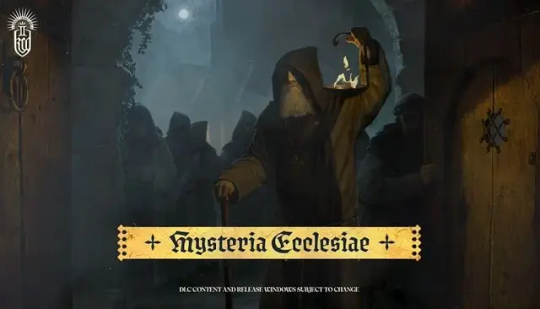
as always, i've been snooping around and speculating about upcoming KCD content, as is my job. and when i see latin, of course i'll look into it even further.
so, i already went over henry's likely radicalization arc in this post and reading the description we have for this upcoming DLC, i thought how my theory could play into this as well.
— "Enter the Sedlec Monastery, where intrigue runs deep. Tasked with a covert mission, Henry must navigate the complex dynamics of the region, discovering hidden truths and navigating a maze of conflicting interests." (x)
that is very little information about the DLC, but combined with the title, i have some thoughts on it!
i've spoken about henry's gradual radicalization in my posts and how it's a reasonable prerequisite to the continuation of his story within KCD's narrative. henry's journey so far has been very personal—driven by revenge, loyalty, and his struggle to find belonging—but at some point, it feels inevitable that his personal motivations will clash with the larger historical turmoil unfolding around him. a shift closer towards the increasingly radical hussite views could be a valuable narrative choice for his character.
but, if that's the case, why put it only into a DLC?
well, in my opinion, i think the games are 'consumable' enough for the median gamer without this deeply personal & political journey of revelation, so it makes sense to put it into a DLC that isn't necessary to the median gamer's narrative but is a very refined brick that is a part of the wall of henry's character. (IMO!!!)
the title of the DLC, 'mysteria ecclesiae' is latin for 'mysteries of the church' which suggests that religion and church politics will play a major role in the DLC.
the phrase "hidden truths" makes me wonder if the DLC might focus on uncovering secrets within the church—corruption, forbidden knowledge, or perhaps even political conspiracies involving the nobility & royalty. navigating this different side of the clergy could mean henry is finally pushed into action?
if 'mysteria ecclesiae' focuses on the church and its internal politics, it could be the perfect setup for henry to start questioning the legitimacy of the established order. not that he hasn't so far, as we've seen and heard when talking to godwin, but he's also been fairly complacent with the established order so far.
the hussite movement was, at its core, a response to the widespread corruption within the catholic church, and a DLC where henry uncovers "hidden truths" in a monastery could be his first real brush with the kind of moral disillusionment that would push him in that direction. it’s one thing to fight for a king or a cause out of loyalty, but it’s another to realize that the entire system is broken—especially when the church, supposedly the moral backbone of society, is rife with corruption and power(& money) struggles.
and again like i said, right now, henry’s moral compass is a bit shaky. he still leans on loyalty to nobility (whether it’s wenceslas or hans or margrave jobst, jan ii of liechstenstein, etc) and personal revenge as his main motivators. for him to take a more radical stance, something has to break that loyalty—or at least shift it toward a cause that feels more just.
encountering the kind of religious hypocrisy or moral rot that fueled the hussite movement could be the catalyst he needs. even if the DLC doesn't make him a full-blown radical, which i have no doubt will not be the case lol, it could still plant the seeds for that transformation that would set him up for a smoother transition into a man he will become by the end of KCD3.
that said, i am fully aware it probably won’t be the central focus of the DLC—these games have always been more grounded in henry’s personal journey than the broader political landscape—but it’s possible they’ll start laying the groundwork and i'd be happy jsut with that.
but also, there's an equal possibility that 'mysteria ecclesiae' will lean into a more humoristic mysterious/supernatural narrative that deals with the competitiveness and quarrels of clergymen with an occasional namedrop of jan hus and could disregard everything what i said about henry's character development. lol
still, you guys know which one i'll be rooting for!
bonus: i found this website while looking for an online explanation of the phrase 'mysteria ecclesiae' just to see if this DLC's rooted in something existing. and it's pretty interesting! let me tell you why:

the latin name for this document is 'Mysterium Ecclesiae'. sounds familiar?
it's interesting because the declaration goes on about the unity of the church and its infallibility in the times (in KCD) when the anti-church movement of the pre-hussite and later hussite era fought so fiercly to challenge the church's authority and for rights to practice religion in ways different to the (at the time) traditional methods.
so if 'mysteria ecclesiae' ties into the broader themes of 'Mysterium Ecclesiae', it could delve into the conflict between the idealized, infallible nature of the church versus the flawed, very human reality that henry encounters. something something dogmas also.

#but hey thats just a theory. a game theory#henry of skalitz#kingdom come deliverance 2#kcd2#kingdom come deliverance#kcd#kcd2 dlc#kcd2 mysteria ecclesiae#mysteria ecclesiae#kcd analysis#history#kcd meta
22 notes
·
View notes
Text
Chapter 47 Yaoibachi Posting
Hokazono-sensei really slammed the gas this chapter, man. No search and rescue mini-arc here- just going back to the series' roots by having our good guys slaughter nameless mooks in suits. Excellent decision! But goodness it feels like he's trying to rush through this set-up to get to what he really wants to say this arc. I trust the emotional impact to land so I guess this really is the Kunishige lore/flashback arc since that's where the narrative focus went.
First off, I got the official arc name wrong last post. It's actually The Sword Bearer Assassination Arc. So, uh, maybe don't get too attached to any of the guys Chihiro will be trying to save. Might be difficult though if they're all as endearing as Uruha.
This Fucking Manga, Man
I just can't even this chapter. I CAN'T. I'm sitting here drafting this on Thursday and I'm in awe of the spreads. Cover and color pages? Stunning. Fanservice? Immaculate.
Yes, we got onsen fanservice after all!

Now accepting bets on who Uruha will be shipped with more: his personal guard guy or Kunishige.
Of course it pulls double duty to give us insight into Uruha and, by proxy, Kunishige. I was right on the money about Uruha being a free-spirited dude with a unique perspective last week... but I didn't imagine he'd basically be a wholesome AF version of Sojo. The Kunishige worship from this guy is off the fucking charts (and so are the Hakuri-Chihiro parallels)!

"This blade suits you" from Kunishige is a callback to Hakuri's words to Chihiro in chapter 20. I love it when authors do this shit. Can we infer that Chihiro felt the same level of awe for Hakuri? Probably not, but he did need to hear that affirmation quite badly, so it's still significant.

You don't get to comment on other guys being weirdly obsessive over a Rokuhira on sight like that, Hakuri.
THESE DUMBASS GOOBERS. Poor Chihiro's still collecting weirdos while Hakuri has no self-awareness at all. I'm in tears this is just too good. Hakuri, I love you. You're perfect.
I don't wanna get hyped after just one chapter for something that probably won't be happening. I get just about everything wrong week after week anyway! But I wouldn't mind Chihiro and Hakuri's relationship being compared to and developed through Uruha and Kunishige, just sayin'... Please... Hokazono-sensei went through the trouble of making sure we know that Uruha is obviously meant to parallel Hakuri, so that won't go to waste right?!

TFW the light of your life dies and leaves you behind.
'Cause this feels like a set up... I don't know, man. It's impossible to guess how the story's going to go but I get the sense that Uruha is going to have a lot to teach both of these guys- Hakuri in particular.
Neither Hakuri nor Uruha put a lot of value on their own lives until a Rokuhira showed up to praise them. And they're both freakishly devoted to the image of their savior to the point that they're willing to fight and possibly die for them. So we could be exploring that aspect of Hakuri's mindset as a subplot while the larger machinations swirl around them, since it's a pretty potent character flaw and all. I need Sazanami "defend to the death" Hakuri being convinced to give a shit about himself so, so badly.

Goddamnit, please stop hurting yourself.
Hakuri's also unable to use Isou due to burnout, as expected. Still wondering if the Kamunabi knows he can use two sorcery techniques but I won't hold my breath on getting answers for that. It's not necessary for this to be addressed unless it would cause some kind of friction, after all. And for as much as I would like to see the council's reaction to Hakuri and his circumstances, I don't think it'll be relevant. We'll just have to assume they either don't know his last name or are completely fine with a Sazanami being included in the plans. I wanna be wrong though. I really do.
Contract, Powerscaling, and Naming Conventions
We learned some interesting things this chapter. One, the theory of the Lifelong Contract erasing a Bearer's innate sorcery is confirmed. So if we are ever going to learn what Chihiro's sorcery is, Enten will have to be an exception to the other six swords, or he has two sorceries and the contract only nullifies one. I'm not sold on the second one since Hakuri only overworked the storehouse but is limited using both of his, implying there's a common pool of spirit energy they draw from. Looking forward to more details on how this works!
It also seems that the Bearers weren't tucked away in "safe" locations until Kunishige's death three years ago. So they probably got to live their lives as they wished until the Hishaku ruined things... which would explain how Sushi guy ended up at a restaurant. I feel like each location could have special meaning to each Bearer so hopefully we see more about how and why they ended up where they did.
Hiyuki also wasn't lying about the Kamunabi's forces being spread thin. Just 14 talented sorcerers to defend each Bearer, and even then Uruha would have felt more reassured if Azami or Hiyuki was there.

Nice going, Azami! So we know you're hella strong since Hiyuki's the best fighter in the Kamunabi- the only one in the force who can contend with Kunishige's WMDs (ch. 18). I think a Bearer would know how strong an enchanted blade is, so we can assume that Uruha's assessment of Azami's strength is accurate. Azami can't be sent out on the ground like the rank and file as a higher up now, but I'm highly anticipating him demonstrating that fearsome sorcery of his.
We also got another name! Kuregumo's original bearer was named Misaka (巳坂). This is most probably a family name like Uruha (more on him in a bit). 巳 (mi) means "snake" for wisdom and intelligence and 坂 (saka) means "slope/hill" or "embankment" for steady progress, a peaceful life, security, and/or strength and resilience. We'll definitely learn more about them- it's just a matter of when. The upside of Hokazono-sensei being stingy with names is that we all know to sit up and pay attention when one gets dropped.
We also got Uruha's given name this chapter (Youji [洋児]) and the name of his blade (Kumeyuri [酌揺]). Strange names for a strange fellow, but that's expected of someone whose family name implies a free-spirited nature with a unique outlook I guess. 洋 (you) is a kanji that specifically describes the ocean in an expansive, almost foreign sense. Not just the sea in general, but vast waters extending far away from one's current location. It has a ton of possible interpretations, naturally: courage, ambition, adaptability, limitless possibilities, harmony, inclusiveness... on and on. 児 (ji) means "child" in a straightforward way and carries connotations of joy, hope, and potential. So Uruha Youji [lacquer feather ocean child] is quite the character in his name alone.
Kumeyuri's name doesn't really give us any insights into it's potential abilities or theme, unless Kunishige was drunk (or wanted to be) when he made it. 酌 (kume) is the kanji used for pouring sake and implies generosity, abundance, and celebrating joy. 揺 (yuri) means to shake, sway, or jostle and connotes a sense of energy, playfulness, enthusiasm, and fun. I'm getting a lot of entertainment value trying to imagine how a sword named after a shaky pour of sake works, let me tell you. Somehow it seems very apt for Uruha already though.
Dead Dad Trivia

So Kunishige himself requested to hold on to the blades- it's very certain now that whatever happened during the war changed him into the man we met in chapter 1. Seitei war flashbacks please, I'm dying over here! But keep up the layering and scattering of little details! Don't feed me too fast! Make me wait and get all impatient every week! Torture me-


Curious that many people who seem to have known Kunishige doubted his potential as a father. Whether they see him as a savior or a selfish prick, most of them scoff a the idea of him having a kid. Maybe Kunishige was just a guy with layers like his son, so only those who actually knew him well would believe he could be a decent dad. We saw him goofing off with Shiba and Azami when they were Chihiro's age in chapter 12 so it's not like he was a stoic since birth (he said himself that Chihiro inherited that trait from his mom). We're going to slowly piece together the real Kunishige this arc and I can't wait!


Also a bit odd that few people see the resemblance between Chihiro and Kunishige until Chihiro's passion shines through or they get a good look at how he carries himself. Won't hang my hat on the blood test showing that Kunishige wasn't his bio dad after all, but the groundwork is there if it does. Regardless of what happens, though, it's pretty obvious that Chihiro is Kunishige's son thanks to the ideals he took to heart.
Hishaku Theory

RIP bandanna guy you were too cool to live.
Yeah, "enemies of the state" isn't a term you use for a regular criminal gang, no matter how threatening they are. I'm more convinced than ever that the Hishaku are primarily a political threat to all of Japan (though still very willing to admit that I might be reading too far into things).
Kyora's conversation with an unknown Hishaku member in chapter 22 referred to "dissidents". That's also a very pointed descriptor for people with differing political ideologies, especially ones agitating against the "legitimate" ruling group.

Could Soya come back to finish what his dad started? Meh.
This implies that Kyora and the Sazanami clan were aligned with the Hishaku's goals beyond merely business. The Hishaku probably have sympathizers in and outside of mainstream society, and likely within the Kamunabi itself as well. And then there's the kiku flower -which has strong ties to Imperial imagery- in the vase that's shown up twice now, arraigned alongside other flowers symbolizing deep desire and patience.
So I think the Hishaku lost the war and have been plotting their comeback for a long time now. How does this tie into Chihiro's personal journey beyond the revenge mission? We'll have to see. John Hishaku's goals and methods are shrouded in secrecy right now, so I look forward to learning about why he needed to foster Chihiro's hatred to enact his plans. Cool job making the core plot hook so compelling, author-san!
HakuHiro Brainrot
I have to, I'm sorry. This chapter was a godsend.

Give me an inch and I'll run a thousand miles with these two.
Chihiro acknowledging that Hakuri is special! Feels like a very deliberate reference to the language used in Chapter 33, especially by Tenri. Makes sense since Tenri was a parallel of Chihiro's devotion to his father and his legacy.




"Hakuri- my older brother by a year- is different." would have flowed a little better, but it's a clunky sentence no matter what...
The reference was probably made in order to imply that Chihiro sees Hakuri as a brother (or family in general) via the Tenri connection. However, that won't stop me from shipping them romantically because I'm illiterate as fuck.
ANYWAY.
FOOD IMAGERY WITH HAKURI FOR THE FIRST TIME SINCE ICE LADY!!
Hakuri's sharing snacks with Chihiro on the train- he feels so safe with his samurai! And this is the first time we've seen Chihiro accept food since he reluctantly (metaphorically) shared dango with Sojo in chapter 17! He's rejected Shiba's offers, provided one-sidedly for Char, resigned himself to connecting to Sojo to understand him, skipped getting ice cream, and missed the gaming session, but he accepted Hakuri's small gesture...! I'M GOING FERAL
Hakuri is canonically the only character Chihiro's accepted emotional comfort and support from since his dad died. On screen so far, at least.
Hakuri, who was deeply traumatized when he last tried to connect with someone, feels secure enough to do it with Chihiro...
Chihiro, who is only at ease with providing comfort, accepts it for the first time from Hakuri...
The first time we see them exchanging the comfort/security visual metaphor is while they're on their own...
And it's just so casual for them to do this...!
I sounded confident when I called Hakuri the heroine of Kagurabachi in that long-ass post I made a few months ago, but... I was actually right?! Hakuri is Chihiro's first and only emotional safe haven. He's got plot-related utility and can hold his own in a fight, but he's not going to be outshining the likes of Chihiro or Hiyuki any time soon. His faith in Chihiro has been his most valuable contribution to the story- even moreso than awakening to his storehouse ability. The only thing that's missing at this point is the chance of HakuHiro being canon! Seriously!
Alright void... thanks for letting me yap again. Definitely not going to go back to writing fan fiction for the first time in 10+ years because this stupid edgy sword manga broke me. Nope, never, not me...
#kagurabachi#long post#Chihiro's collecting his dad's exes with help from his boyfriend and on-again/off-again girlfriend and her fwb#Kagurabachi was a harem series all along
47 notes
·
View notes
Text
ok ok ok. a post about josh, buck, and maddie at dispatch as promised. (and because i dont feel like writing a whole separate post or repeating myself etc, if im pointing something out as evidence for my autistic josh headcanon, it'll be in parenthesis like this) also this is long because im going basically line by line in some places so just be prepared for that and such.
the first thing i wanna say before anything else is that like... as far as how this conversation fits into the larger narrative, i was fairly disappointed, due to the way that including this scene like this is kinda implying that the racism was fine because of being closeted etc. HOWEVER. luckily for my sanity it is pretty clear that from a character perspective, that's not at all what's being said by josh himself here, and we can be pretty certain that he is not aware of tommy's past behaviors. in fact he has almost no facts or context about the situation, which i'll get into later.
now that the disclaimer is out of the way, im gonna move onto character analysis and will not be touching on what i think the narrative might have meant etc. any further. like this is going to be purely talking about character dynamics and dissecting the dialogue etc.
we start out right away by skipping all the exposition right into a hard cut of maddie reacting to the news that tommy and abby were engaged. LOVE this set up we get right into the important part quickly and we as the audience only have to hear information that is new to us, not the information being repeated back to the character for whom the information is new.
and oh maddie. i love you so bad. she's like DAMN thats crazy, and then makes the obvious turning people gay joke. her energy here is sooo like it didn't make sense until looking at it in retrospect, but she's shocked and invested yet not taking it very seriously as a concern for buck, because well, she's having a baby and this is objectively not that serious comparatively <3 but i do love that she sees buck's reaction and quickly reins it in and is like woah im kidding im not actually being homophobic holy smokes. which. it kinda still is a little. but i think she's allowed <3
and then... josh enters the scene. he apparently only walked in as buck was saying "-kissed a boy" so of course he had to be like huh? gay shit? something gay? boys?? what's going on over here? and i love that for him. and i love that maddie immediately is like oh hi bestie i catch u up to speed on the tea <3 the maddiejosh bestieism is so back we never lose <3 and that fact that she's like. feeding in the facts in a way to dramatically amp up the tale i love it. she really said man the things my baby brother gets himself caught up in are wild.... anyway <3 true sibling behavior is finding the perfect balance between being supportive and being so so annoying <3
and she is supportive still. like when it becomes clear that there's something deeper going on here she does try to help him work through it. and its so interesting to me the way she is sort of seriously contemplating his words and is shocked when josh not only speaks up but is being very serious and equally focused on the problem at hand. it's like... she's trying so hard to figure out how to help her brother with something she doesn't fully understand that having someone else speak up to help them kind of shocks her and boy does that say something about their lives and the buckley sibling dynamic!
side note, the way josh is jokingly like "she didn't bring her personal life to work, unlike SOME people" and maddie's little look of mock offense?? they're so cute i cant handle it.
i also really love how the shots are framed during this conversation. at first, even when she's not talking and is just listening to josh talk, maddie is still in frame, we're still getting her reaction, she's an active participant in what's going on. and then there is the one shot where she's talking and josh is out of frame, hidden by buck, because whatever reaction he might be having isn't important, it's a buckley sibling moment. (he's not an active participant at that point; he's entirely observing and reacting and gathering information, not dictating the direction of the conversation whatsoever.)
it's only when josh gets very serious and it starts to turn into a heart to heart moment just between him and buck that maddie is allowed to leave the frame. it still goes back to her in very brief cuts when her reaction is relevant, but she steps back out of focus and let's josh handle the conversation. and i love that so much. thank GOD someone else is helping buck sort out his problems that isn't his parentified sister or just generally someone more marginalized than him. it was kind of getting irritating to watch, as much as i love buck so much. like dude... the emotional labor. watch it.
and man. this conversation guys. everything about it makes me an insane crazy person. ive already mentioned this in the tags of some other posts but like... its so fascinating because on the surface it is such a cohesive conversation, but when you really break it down and analyze both of their expressions and body language alongside what they're saying, you can start to see the cracks in it. what one of them is saying is not what the other one is hearing, in both directions. they are having two different conversations and i think it's critical to analyze both of those conversations and how they are interacting with each other. what josh says, what josh hears, what buck says, and what buck hears are four entirely separate things happening alongside each other.
the first part is josh trying to get a sense for how serious this relationship is to buck. when buck falters at the question of "do you love him?", he elaborates with follow-up questions that, to josh, define "love" or close enough to it. answering "yes" to those questions is close enough to a "yes" to the question of "do you love him?".
(which. ok. the particular choice of questions makes me insane because they do essentially boil down to "do you prefer this person to solitude and grant them an equal or greater importance to yourself?" which is sooo... it's said from the point of view of someone who greatly values their solitude and would not easily grant someone that level of importance.)
unfortunately, well, buck is NOT someone who greatly values his solitude, and puts other people before himself quite easily. buck would answer "yes" to those questions for basically anyone. josh does not know or understand this about buck and takes buck's answers at face value, while buck is taking this as sort of... it's hard to explain, and i think others have done a better job of capturing buck's perspective already tbh. he's convincing himself that he loves tommy here because josh is unknowingly handing him that information and expectation, and buck loves to mold himself to fit an expectation etc.
and then comes the second part, which... i think this is where it is most critical to realize that josh has none of the context about tommy, abby, and buck and those respective relationships. by his own admission, he didn't really know much about abby or about her breakup with tommy beyond the fact that it was upsetting. he didn't hear the way tommy talked about abby to buck at dinner, and he definitely didn't get to see any of the real fallout and damage to her psyche that tommy leaving her caused.
but buck did! im not inclined to rewatch s1 to get any exact quotes or anything but from what i remember, she either outright said or implied that she was so heartbroken because tommy left her because of her mother's illness. buck is understandably very upset because he understands exactly what she went through and how, unless abby was lying to not out him, he didn't exactly come clean with the breakup, and left her feeling like it was her fault, like there was something wrong with her or she was being weighed down by caring for her mother. he calls tommy's behavior exactly what it is: dishonest and cruel.
but josh doesn't know this. all he is hearing is a young, freshly out bisexual calling a gay man "dishonest and cruel" for having been engaged to a woman for his own protection. and he responds exactly how you'd expect! he reminds him of queer history and the fact that he doesn't really have a right to judge the people who grew up and had to survive in a world that was much less safe to come out in.
(and i said in my other post that's still doing numbers that "pre-Glee/post-Glee" is an actual queer discourse talking point and makes sense that it'd be used here, as awkward and cheesy as it seems, but it's also a win for my television/film/popular media/hollywood culture/etc. as a special interest headcanon. <3 we love to see it)
and it kills me because of course buck is just going to take this at face value and decide he needs to stop feeling the discomfort he's feeling, leading to the subsequent doubling down and over committing that is typical of his unhealthy relationship patterns.
(and then at the end of the speech josh has to literally announce that he's leaving DSJFHJKDSKJ. because walking away/ending conversations is so awkward and difficult and the easiest way to mitigate that is to lean into the Dramatic Homosexual Stereotype mask or whatever <3 i've long been of the opinion that josh is someone who uses the behaviors associated with queer men and queer masculinity as the blueprint for his neurotypical mask, which is why he often comes across as being just a little bit off from the Funny and Bitchy Gay vibes that it seems like he's going for. and boy did his exit from this scene just reinforce that headcanon so hard!)
they wrap the scene with a little bit more levity too which is kind of nice to like. move on from that. because it got kind of heavy there for a second.
overall i do like what this scene accomplished, but like i said at the start, i think it has some really unfortunate implications that weigh it down for me. still, always nice to get more josh content, especially when it's pretty consistent with his character as established AND not at all related to doing his job. we got to see him and maddie being goofy and maddie being allowed to let someone else deal with buck's problems for a second. and the whole thing was very well shot! excellent camera work going on throughout.
i don't actually know how to end this post so yknow. im gonna make a dramatic exit now or whatever <3
#my posts#911 spoilers#911 meta#911 abc#911 season 8#911 season 8 spoilers#josh russo#maddie han#evan buck buckley#long post#media analysis#dispatch#anti bucktommy#i didnt go into bucks pov too much bc ive already seen a lot of good meta about that so i didnt feel i had much to add to the conversation#there were no serious meta/analysis breakdowns about josh's pov coming across my dash yet though so of course yall have to deal with mine <
23 notes
·
View notes
Note
hey!!! while on my mass reblogging spree of your old art I noticed that there was a lot of other ocs and storylines dedicated to stuff other than SGZ! and the vast majority of it seems really thought out and planned,,,and so I was wondering if you could tell me more about them? (especially the moth guys and the bird knights and your tiger girl)
(if you lore infodump then I'll also lore infodump....stories for stories :D)
OOOHHH!!!! :D I'm delighted to hear my other stuff has piqued your interest as well, thank you so much! ^_^ Naturally I'll give you a bunch of info here, but there is a lot to talk about between multiple stories, so if you ever want me to elaborate on something else of mine or you have more questions about these ones, feel free to ask any time (but no pressure of course!) My OCs are one of my all-time favourite things to talk about in general, so I really appreciate your interest <333
(I'm definitely taking you up on that offer to exchange loredumps though, I wanna know what you've got cooking :D)
Since I'm primarily a character designer, creating characters that have stories that go with them is pretty much inevitable for me, as creating informed designs is basically my whole job, even for more "one-shot" concepts. That translates well to my personal work, as I've always loved creating stories and worlds too! Whether or not I turn each character/story idea into a full project depends on a lot of things, but either way I've always got one story or another tumbling around in my head at any given time xD
Starglass Zodiac is the only project I consider "active" right now in the sense that I'm not only telling the story via the comic, but I've also been focusing the most on its lore/world/characters leading up to now as well. SGZ is currently my most well-developed project as a result, but I'm glad that my other stuff still feels well informed too! :D The ones you've mentioned here have varying levels of development, and also varying sizes in their overall scope as well. I tend to switch between them from time to time to avoid burnout on one project. I often get carried away with all sorts of different story/lore things like these, but at least it's always fun!
I'll start with my tiger girl Nahra, as the story she's a part of is more of what I'd call a "story seedling" right now. I have a lot of individual scenes and character dynamics that I like so far, but I currently haven't settled on the larger narrative concept to tie it all together yet. That said, I do at least have a solid idea of Nahra's character :)

Her story is called Id Pariah, which focuses on characters who are shapeshifters. Everyone in this world has an id (rhymes with kid), a manifestation of their soul/identity that develops over time, much like their hosts. Though not in every case, ids tend to take an animal form with an elemental power, and Nahra's id is a white tiger with blue fire. Regardless of her level of transformation though, her right arm is always a tiger's paw, so she is classified as a "hybrid".
Nahra is spunky, outgoing, and can light up a room with her fire power and explosive attitude alike, but has a kind heart throughout. Though she can put her aggression into full swing when necessary, Nahra isn't as short-tempered or angry as she might seem. She's very stubborn, but is a generally laid-back and friendly person to be around. Casual, yet confident.
She doesn't go around picking fights, but definitely won't say no to one either! She's always itching for a good fight with a worthy opponent, so she spends a lot of time sparring with her fellow vagabonds or helping others train against her considerable power level. She gets injured often, but takes pride in her scars like little mementos, remembering the story behind each one. Thanks to her tiger form and her father's line of work as a gryphon breeder, Nahra often finds more kinship with animals than she does people, believing they have more loyal hearts than most of humanity. That said, the few people she does connect with have a bond for life, and she will go to extreme lengths to protect them. Be they animal or human, Nahra will guard her friends and family with the ferocity one would expect from a tiger, though with a tendency to overextend herself in this regard. If she stays fully transformed for too long, she is more likely to lose control of herself, especially when angry or scared.
I like to think that she embodies the element of fire in both its negative and positive connotations; she does have the capacity to burn, blind, and destroy, but also has the intense passion, warmth and guiding light of fire as well.
---------
Now for the bird knights :D Appropriately, they belong to a story called Feather Knights! Though that is just one of several stories I have planned for a series called The Wing Knight Saga, which is basically my big "medieval fantasy worldbuilding" project (though most of my stories have a medieval fantasy slant anyway haha).
Discussing the entirety of Feather Knights/TWKS's concept here would take a really long time, but I'll at least clarify why some of the knights are themed after birds! They belong to one of the Three Great Kingdoms of this story's world: Eldrigar, Irivell, and Sundari

As you can see here, Irivell is the bird-themed kingdom, but they're each based on a wing type (bat/dragon wings, bird/feathered wings, and insect wings) hence the overall series name. I have and will continue to design knights for all of these and more! Truth be told, this series exists primarily because I have a lot of animal themed knight ideas and wanted a place to put them xD
The protagonist of Feather Knights is Milo Avaleigh, though most call him Snowy for his white hair and (later) his wings! Here's my most recent design for him :D

In this world, only those of royal status are given wings, thought to be a symbol of their power granted by the fallen gods. But when Snowy, someone with no royal connection at all, is given wings through a life-or-death situation, he is suddenly thrust into the kingdom's politics and tried for treason, forced to fight for his life almost immediately. However, through the Prince of Irivell, who is also the leader of the royal guard (the titular Feather Knights), it is later framed as an opportunity for Snowy to serve his kingdom as repayment for his "transgressions" against the crown. A lot of global unrest ensues as other non-royal wingbearers also come to light (including one of the main antagonists), the monarchy is challenged, and Snowy discovers more of his family's largely mysterious past to find answers about his own wings.
The heavy themeing surrounding wings is intended to have multiple purposes for these stories, one of which being the idea of flight representing both fear and freedom depending on how you define it.
--------- And now, the moths! I actually have two story concepts for these so I'm not sure which one you wanted me to talk about, but they're interconnected so I might as well discuss both! The first one is called Moth to the Flame and centres around Kiida, my archer moth character I've had since mid-2015. Here's her current design:

A cantankerous moth with a tongue as sharp as her arrows, and a perpetual scowl to match. Skilled in archery via her past military training, Kiida's aim is unmatched, but her skill does not come with a sense of camaraderie. Her ruthless speed and accuracy in combat make her quite intimidating, though her glare on its own is already the definition of "if looks could kill".
After a forest fire destroyed her home and separated her from her family, Kiida has been on a solo journey to find her way back, viewing any accompaniment as a hindrance to this goal. She uses her harsh attitude to ward off predators and companions alike, but eventually finds herself growing attached to the Z-Squadron (a group of aviator siblings she meets along the way) after repeated encounters and their leader's persistence with befriending her. Eventually they become her surrogate family, the siblings Kiida never had.
I haven't finished all of the updated designs for the Z-Squadron yet but here's Zander, Zeke and Zeria at least :) They're all loosely based on the lime hawk moth, with Zander resembling it the most (and yes they all have Z names haha, the others I have left to update are Zereth, Zeta and Zanth!)



--------- As for the second moth themed story, well, that one happened sort of by accident! I was thinking about Kiida's backstory a bit more and what may have influenced her specifically to become an archer, and I thought about making an in-universe magical girl parody called Captain Artemis (basically Sailor Moon but with moths, hence the name similarity). Even for a small part of Kiida's story, I would have needed to design Captain Artemis to some degree anyway, so I did!

But then I ended up loving her so much that I essentially "haha just kidding... unless?"ed myself into making her story its own thing x'D This happens sometimes (okay, all the time) where I'll create a logo for something just for fun, and that ends up turning it into something more! It'll still exist as fiction in MttF, but now exists independent of it too :)
I don't have a ton developed for the details of the story yet, but of course it will take heavy inspiration from the magical girl genre as a whole (I'm a big Cardcaptor Sakura fan myself :D) and so far I have designed her non-transformed self, her little magical companion, and her rival!



I have ideas for the main antagonists and some other important characters, but they don't have finished designs yet. I do have Apollo's companion in the rough colour phase right now though (her name is Soleil!) so maybe I'll finish that up soon now that I'm thinking about her again :D I want there to be a rivalry between Artemis and Apollo as an extension of the rivalry between the magical Moon/Sun councils that are trying to fight the main antagonists, but are too busy bickering to do it well. They'll have to put aside their differences if they want to succeed!
#genuinely so grateful to get this ask today#i got to talk about my blorbos yippee!!!!!#but seriously thank you :'D#i'm very happy that my OCs are of interest to you! <333#asks#tabsters#long post#Katie rambles#like so much omg xD#my art#my OCs#Nahra#Id Pariah#Snowy#The Wing Knight Saga#Feather Knights#Kiida#Zander#Zeke#Zeria#Moth to the Flame#Selene#Lalune#Captain Apollo#Helios#Eli#Captain Artemis
4 notes
·
View notes
Text
As a queer person living in conservative, rural America, and as a Star Wars fan who posts about the Jedi Order, my thoughts are frequently turned to the concept of family, and what it means in different cultures. I’ve written a longish (1k words) post about this lmao, so I will put it beneath the cut, but it unpacks a lot of assumptions that are frequently made in discussion of the Jedi.
The ideology of the family where I live is closely related to patriarchy, individualism, and property rights. The narrative of the ideal family life is this: a man falls in love with a woman and courts her until she agrees to marriage. When they marry, they become one person, or rather the man acquires a helpmeet, and the woman legally loses her personhood, becoming Mr and Mrs X. She is now a larger part of the man’s personhood, and any children they have are also inside that umbrella. They are his property, not individuals in themselves. This is why conservatives resent public school and free access to information, as they are interfering with his right to maintain his property the way he wants them. Once the children are grown, the cycle continues, the son finding a wife, etc. That is a certain kind of ideal of society. The idea of sending a child to the church to be raised, is kind of like sending a valuable, heirloom cup to be used by the community, it’s hypothetically a meritorious sacrifice to god, but the cup still really belongs to the family. It belongs at home. If the child grows up to join the church, it’s something that happens later, during the transition from being property to being an individual.
This is not a universal or necessary mode of life.
In a different culture, where a child is born and is understood already to be a member of the wider community that is being raised by their parents, the idea of allowing an institution to adopt and take over raising the child is not a violation of some man’s property rights. In a culture where there is a temple that is an honorable place, where being a monk is a livelihood that is respected and important, something that parents would wish for their child to experience, it is more of a privilege to get your child into that place where they can become an important figure in the community. The parents would miss the child, that is universal, but there would also be a sense of relief for them, to know that they’ve gotten access to a stable future that they can be proud of, especially if they were in a situation where they couldn’t guarantee that child an equally stable and important future. With the force-gifted Jedi this is even more stark; their powers should be trained and directed for their own good too. Growing up communally at a temple is a different kind of family, where there is a sense of brother and sisterhood, with teachers and elders making up a dense web of social relationships. It is a different life, but not a worse one.
The conservative American ideology is something that I have felt my entire life to be very closed and full of the potential for abuse behind closed doors. A child is not a person and is not treated like one, and a wife is not a person either. The only individuals are the men who own these families. It’s a system that I yearn for relief and escape from, and so of course I am drawn to the Jedi, an imaginary culture that is based on real values held by real cultures outside of my own. I know there are places in the world where sending a child to the temple is an honorable and good thing. I know that the Jedi think of each other as family, it’s well attested in canon and legends content. It’s not abusive or wrong for those children to be raised in that communal culture, just because it’s different from the norms of individualistic, patriarchal values. Just because it’s different, doesn’t mean it’s wrong. Just like being a queer person, who doesn’t fit into the system of romantic pairing and nuclear families, being different doesn’t mean being wrong.
People raised with the conservative ideology think the absence of romantic love is inherently abusive, but if you were raised to prioritize other things, would you miss it as much as if you were raised to chase it? Is it not a worthy effort to dedicate your life to serving other people? It may be difficult, but it’s not a life without love. Jedi have romantic feelings, they’re not forbidden, but they are deprioritzed. It’s not the ultimate goal of life, but rather more of a distraction from a very noble duty. Many, many people in the world choose that path. The Jedi aren’t jailers, we have examples of people leaving when they couldn’t walk that path, but most stay, because they have an important role to play in the wider galaxy and a great use of their potential. Anakin wanted to stay so that he could have the status and power of a ranking member of the Jedi Order, but he also wanted to have private property, possessing other people and controlling their destiny. You can’t have both. I think the story of the prequels and the path of the Jedi are both fascinating because they push against the cultural norm toward romance and patriarchal individualism. It’s just nice to have something that says you can find home with friends and mentors, and meaning with duty and service. It’s important to me on a very personal level.
#jedi order#many thoughts#there are a lot of assumptions made in criticism of the order#which are based on cultural norms that i do not share#and sometimes find offensive#this goes into why
89 notes
·
View notes
Note
Oh! Sorta responding to the "responding to sexualizing woman. Don't." post. What are your thoughts on Smash Ultimate altering Zero Suit Samus' design? Personally not a fan of it compared to Smash 4. I liked her bigger boobs. 😔
I don't really pay that much attention to Smash, honestly, (fighting games just aren't my thing as is, and I'm not attached to 95% of Nintendo's stuff the same way I am with Metroid (even if I am curious about Zelda and Splatoon)) so I don't really care that much one way or another. But I guess my take is, on one hand I respect the attempt to dial back on Samus's sexualization². On the other hand, as the full un-blackouted version of that post said, focusing on boob size to do so instead of other elements of design, both doesn't really address the actual problems, and kinda carries some dubious implications¹.
But on the other other hand, I remember the ridiculous blowback and controversy from Those Kinds Of Gamers™ being just, embarassing to watch, and I wish Samus hadn't been stuck at the center of that, but I kinda support the move on that front, catering to the assholes that much less, even and especially when they made a huge overblown fuss about it.
So it kinda balances out to a net result of "ehh whatever" either way.
---
¹The interplay of boobs and sexualization is of course it's own complicated topic, honestly. In an ideal (but hopefully attainable) world, the nipple would be free and breast size would be culturally sexually neutral - as with really any aspect of appearance. Particular people might have particular preferences, but it would be a purely personal thing without an established cultural yardstick to literally measure oneself up against. Unfortunately, we don't currently live in an ideal world, and that yardstick does exist (which is why all the Gamer Bros were so Big Mad over the Smash Samus breast reduction in the first place) and has to be contended with, so it's kind of a catch-22.
I do think breast size shouldn't be tied to sexualization, and unfortunately reducing one in the name of reducing the other, does just kinda serve to reinforce the base assumption of their tie being inherent. At the same time, while a real-life person having giant G-cups might have my sympathy for the back pain involved and little more thought than that, a character designed that same way would definitely have me questioning the creative intent behind that. So I do think there is kind of at least an upper limit to boob size in character design, past which it's hard not to assume sexualization is at play; even if I personally try to set that upper limit a bit higher than some people, and put more stock in other contextual aspects of the character design and source media before jumping to conclusions.
---
There's also a larger discussion to be had around like, what sexualization even is, types of sexualization and appeal, whether or not it's even a bad thing and when and why it is or isn't, and the cultural yardstick stuff surrounding that, but I don't quite have the brainpower or desire to get into all that right now. The distinction between why 2B from Nier Automata being sexualized can be criticized but is also mostly fine, whereas the gal from Stellar Blade being sexualized in a similar way is more dubious; and how the culture they both exist in impacts things, compared to if they existed in a vaccuum or a completely different zeitgeist. I guess a summary of my feeling there is that once again it really just depends from case to case; and the context of creative intent, execution, impact, and just how much narrative sense it makes, are key.
---
²Which brings me back to Samus. I'm running out of steam so I'm just gonna do a quick lightning round.
- Do I have a problem with the broad idea of her being sexualized? Not necessarily. It doesn't make a whole lot of sense for her role as a bounty hunter, but it can serve well as part of her personal characterization, and metanarratively as part of the subversion of gender roles and stuff that she can be read as. (Though that in of itself gets into some thorny bigger topics around gender I also don't have the energy for rn.)
- Do I take issue with the specific way most of her canonical appearances do it? Yes, and I've talked at length in other posts about how I think they should do things instead.
- Does her presentation in Smash matter nearly as much as her presentation in the actual Metroid games? Ehh, mostly not, but it would be nice if she was represented better there.
- Do I think her breast size matters all that much? Generally not, barring of course the aformentioned upper limit of reasonability; the problem is more in other aspects of the design. Again, I didn't have a problem with the original boob size or the reduction, so much as Zero Suit Samus's overall design in the first place.
- How should they actually fix those in Smash, then? IMO there are two different approaches there. The simpler way would be to redesign Zero Suit Samus from the ground up to be less of a latex-clad barbie doll. Dread's buffer ZSS model is a pretty good show of how to accomplish that without drastically altering the design; though I also think the Zero Suit itself is in need of a moderate rework, to feel more like the astronaut's undersuit and conduit with the Powersuit that it's excused as in the lore.
The other option would be to address the whole weird thing of Zero Suit Samus for some reason being counted as a completely separate playable character from (Powersuit) Samus, and coalesce them together back into one thing. (Possibly with the option to switch modes at will, or being forced into Zero Suit mode on her last life, or something like that.) This would definitely more significantly impact her place in Smash and would probably cause an uproar that would make the boob controversy look like nothing, but it would be worth it for the greater character accuracy IMO. Honestly of the two options... Well, I'd just prefer they do both, but I think if I had to pick, I'd want the full redesign more.
#not a reblog#asks#metroid#samus aran#character design#sexualization#super smash bros#super smash ultimate
16 notes
·
View notes
Note
i am really loving the discussion on your blog lately! thank you for answering mine and others' questions so thoughtfully. i have loved your writing for a long time and it's great to see a sort of community of others who also do!
also as someone who's followed the series for a while (not since the beginning but i can't quite remember when i found the key to oslov....), my two cents on All Kinds of Broken: first of all i do love whump and so that contributes to how i love it! i also think that it is very well written. i ALSO think that the fact that i went into it as a prequel to A Serviceable Boy did increase my enjoyment. that's also personal, because i know i love angst and whump more when i know there is a happy (or happier) ending. i continue to love it as a prequel because of the ways it puts the pieces together and explains the characters that we meet in A Serviceable Boy.
i dont know if this helps you think about how you want to order the stories in the series. for me, All Kinds of Broken would have been a great entry point. however, i think that in terms of genre as well as scope of narrative, it is a little different from most the rest of the series (at least the longer entries). it is more personal, focusing on tilrey, the abuse he faces, the friends and others he meets, and how it affects him. the political is an undercurrent that helps to inform the narrative. which i LOVE. the other installments have this as well (not just for tilrey but for many characters!) but are also intensely political stories about conflict within an empire.
that's my current thoughts!
I'm really enjoying the discussion too! It fascinates me to hear how the story works for different readers, so thank you! This is very helpful!
I agree the prequel feels different and might attract a slightly different readership (I don't know if anyone could get through it who doesn't like whump!). Although I don't have any immediate plans to publish the saga, I do read about different publishing models, and I wonder about possibilities like making the prequel a reader magnet or bonus story. I think the sheer length of it makes readers want a happy ending afterward, and then instead we get more of a long, slow climb out of the misery. And of course some readers won't be interested in the politics/espionage elements of the larger story.
It's a tough one! I'm just glad right now I can publish in this free (in every sense) way and not have to worry about packaging the story to target a market.
2 notes
·
View notes
Text
Peanuts on the Dollar - Johnnie Smoke - Analysis - Song - Lyrics
A timeless masterpiece, Peanuts on the Dollar. The lyrics depict a journey through self-discovery, ambition, and the pursuit of meaning in a complex, ever-changing world. The speaker reflects on the duality of their life—balancing a sense of power with the recognition of its fleeting nature. The opening line, "Put a price on the life, and I'll find a way to buy that shit," highlights a relentless drive for control and the willingness to pay whatever price is necessary for success. This sentiment reflects the speaker's belief that they can shape their destiny through sheer will, determination, and effort. It also reveals a deep desire to rise above the challenges of life, to be where they are “supposed to be,” regardless of external pressures.
Despite this fierce ambition, the speaker expresses a sense of camaraderie and loyalty, particularly toward their “brothers.” This is not just a journey of individual success but one that involves sharing knowledge, lifting up others, and staying grounded in relationships. This dynamic is emphasized by lines like "I'm trying to cut everyone in on the secret," where the speaker seeks to ensure that their success is not solely for themselves but is shared with those they value.
The lyrics also contain an element of reflection, particularly in lines like “Life only gets better,” suggesting that the speaker is coming to terms with the cyclical nature of life’s ups and downs. While ambition drives them, there is an understanding that not everything can be controlled, and some things—like relationships, success, and failure—are part of a larger, uncharted narrative. There is a recognition of how the future pulls while the past pushes, creating an ongoing tension between progress and reflection.
Another key theme is authenticity. The speaker emphasizes that they are true to themselves, stating, “I wrote the script so I know it's me,” signaling a commitment to their identity and vision. The pursuit of wealth, fame, and success is intertwined with a need for personal expression and authenticity, rather than conformity to societal standards. The struggle with materialism is also addressed, as the speaker acknowledges the balance between luxury and genuine happiness, reminding themselves that, despite achieving success, there is always room for growth, reflection, and change.
Ultimately, the lyrics portray a multi-layered journey, navigating ambition, relationships, and self-awareness. They remind us of the importance of living authentically, embracing change, and understanding the complexity of both success and failure.
Yo[Students] find a joint and put a flame to the end, / Take a puff and wait for Johnnie Smoke to pop it on your shoulder. / Yeah, one day, kid, it will be me right where I'm supposed to be for now, / I'm getting older as I cherish every second, doubtful that anything can knock me off course again. / Eh-heh-heh-heh-hem! / How many times you got to get wavy to know you're wavy? / And how many times you got to say it? / We out here sedate as ever. / You can't relate? / Well, I feel bad for your brother, for this life I wouldn't trade it. / And I ain't out here parading because lately its been like I can't complain. / Caught by no strays. / I was raised by the wolves. / The future does pull as the past pushes [can pull and can push] / Taken by the look of the world. / Just want the art to mimic civilization. / If you're listening to trap, you might need something to clean the pallet. / If you can picture a vibe that we need, would it be mine? / Well, I'll shake on that. / Let's find me a bae who can cook. / It's tough getting my head in the book, these days; / I'm hooked on the story I write. / Yeah, it will turn heads in a hurry. / Wish I could charge a higher price. / I make peanuts on the dollar. / Don't worry, my mother won't let me starve. / I'm a man of the people. / I'd have no choice but to be a guard if I were to ball. / Don't just go on hating everything that ain't Drizzy Drake. / I'm in my why not my phase, and I wrote the script so I know it's me. / Just saying. / Daily, I'm living half in luxury, yeah my feet are dipped. / Get me a pen with a golden tip, with enough peace to share. / I come clean as a whistle, the meaning of everything it ain't just lost in the breeze. / We all need a voice of reason, a 10 second car, and a benchmark. / What do you really want to do? / You want to run it up, like I want to run it up, / But really, there's only a forum to move, / And there ain't any room for me and you, so do what you do. / The angle is acute, and the stigmas always rude. / People can't really believe half of what you think they do. / Who could conceive such a master plan? / I ain't one for conspiracy theories, unless we're talking how lucky we are, because we are; / We are we are as lucky as a motherfucker. / I'm off this. /
#actors#beauty#business#celebrities#culture#music#soundcloud#design#cameras#comics#song lyrics#lyric posting#lyrics#lyric quotes#lyrik#SoundCloud
1 note
·
View note
Text
YESSSSSSSS!
These write-ups continue to be excellent! Ah! I appreciate so much the additional context you bring in from the novels! Honestly tho, you're doing the fandom a tremendous service—especially since a majority of us either haven't read them, or are only left with the wonky fan translation without the proper Japanese context.
And boy is that obviously needed here! From the sound of it, books 6 and 7 are rough..... which makes it something of a miracle that the OVA not only manages to fix them, but in my opinion, makes the adaptation of the material the best part of the anime.
Barring the changes to Riddhe of course.
Right. Let's get into it. I can remember even when I first watched this episode, thinking that Riddhe's plot was rushed. It felt like his character does a complete 180 from wanting to help Mineva to selfishly trying to possess her. A lot of that I think comes down to the fact that his change of mind (from the anime's perspective) comes from his father revealing to him what the Box contains—which we the audience aren't privy to. So Riddhe going to Mineva right afterward, crying "It was a mistake to bring you here! Will you marry me instead and forget about your motivation?" felt extremely jarring and confusing. Now knowing what his internal conflict was in the novel, it makes more sense. And I share the frustration that we didn't get those insights in the anime. But at the same time, I kinda have to sympathize with the anime producers. Because so much of that conflict is internal, and emphasized in quiet scenes that the anime had to streamline for time and pacing. And you can only show those conflicts through visual language.
Adaptations are tricky. You HAVE to make cuts, or changes, to accommodate the larger elements of a story into a reasonable runtime that an audience will sit through. It's something that's been on my mind lately, as I've been in the midst of breaking down and comparing the three screen adaptations of Dune. In a novel, you can slow down and stew in subtle details that can bring out deeper complexities to characters or situations that on the surface might seem simple. But in a visual medium, those surfaces are all you have. Not to mention the fact that you can more easily compress time and information in a narrative form, whereas in film, pacing is more crucial, and 'exposition' is a dirty word.
Does that mean I think the anime handled the adaptation of Riddhe's character the best way they could? I don't know. I'm honestly curious how the rest of his arc compares with the novel's. But with that being said, aside from the abridgement of his time in the Marcenas household, I kinda like how his role in the episode develops?
Ok, so from an anime-only watcher, here was my perspective on Riddhe: He IS the privileged rich kid that he says he doesn't want to be. He makes a big deal about not wanting special treatment, but he's been getting it all his life, even if he doesn't realize it. I got the sense that even when he joined the Argama, his father pulled strings to grant him access to unique equipment. I mean he's the only one piloting a Delta Plus. Maybe Riddhe thinks he's earned that right, but it still marks him as different from the rest of the team. And I can't help thinking the Delta Plus holds a deeper significance as well. In appearance, and in the lore, the Delta Plus is an offshoot of the Hyaku Shiki—a 'not-Gundam' famously piloted by Char during his 'trying to be a Gundam protagonist' phase. And I think that characterizes Riddhe as well. There's that shot in episode 4 where he's staring at the portrait of Amuro in Bright's office. It's a cute cameo, but also significant because of the framing: Amuro is who Riddhe aspires to be. He WANTS to be a Gundam protagonist! Or at the very least, it’s the ideal of a pilot who can embody the personal agency that he wants to have. But instead of being the protagonist of his own story, he's trapped by the legacy of his family, and the curse of upholding the status quo. Thus his resentment toward Banagher is kindled. In that last confrontation, he's angry at Banagher for holding onto the ideal of possibility that he feels has been denied him. He sees Loni enacting her family's wishes as parallel to himself—and believes that she, like him, cannot escape from the chains of responsibility that bind her. It ties into the themes of the episode and the anime as a whole: the cycle of violence and war, generational trauma, and the curse of the past. Riddhe and Loni are quite literally the fruits of the Federation vs. Zeon conflict coming to roost in the generation after the original war. Riddhe doesn’t think Loni can be talked down because he too can’t shake his childhood fear of Zeon that took root in him when he witnessed Ghiren’s speech on TV. Even if he intellectually knows things are more complicated than that, as a soldier, he resorts to a black-and-white view of things (you could also parallel this to Zinnerman, who similarly holds deeper thoughts on the nature of people and war, but falls back into that singular soldier mindset during the Torrington attack). It’s as Riddhe tells himself: “You can’t fight reality”. But not Banagher. Banagher is the real Gundam protagonist of this story, and HE’s able to bridge the gap between the two sides and come to his own determination. And I honestly believe he COULD have saved Loni! Her will to fight was obviously weakened by the loss of Kirks. But Riddhe can’t let go. He literally tells Banagher to give up on Loni, because that’s what he’s already done in conforming to his predetermined role!
I hear what you’re saying when you say you prefer the more sympathetic Riddhe from the novel. But whatever else, I really like how the changes inform his character in that final moment. Because it’s what marks his divergence from Banagher and the path of the Gundam protagonist. From then on he becomes a dark mirror of what a Gundam protagonist usually is: an upholder of the status quo, who feels threatened by the unknown possibilities inherent in Newtypism. A leashed lion, if you will…
God, there’s so much else I could rave about in episode 4: How the aforementioned themes of generational conflict that have been central to Gundam, are relitigated and crystallized dramatically through Loni and the attack on Torrington. The sympathetic yet honest treatment of the Zeon remnants, without falling into the pitfalls of the ‘lost-cause myth’ that normally plagues their depiction. That conversation in the desert between Banagher and Zinnerman (it’s so rare in media to see a man tell another man it’s okay to cry). And just the production values….. It’s peak Gundam to me. I love it. Despite all the valid criticism one can have about the series, I just can’t deny the power of these moments.
As always, I cannot wait to hear your thoughts on the remaining episodes!
Gundam Unicorn OVA 4: At the Bottom of the Gravity Well
I thought the last one was the prettiest, and they might have one-upped themselves again. The shot composition alone...!
...This is a really weird one to talk about. Probably my most opinionated post so far, and even longer than the last one. This monster is over 15k words, I'm so sorry.


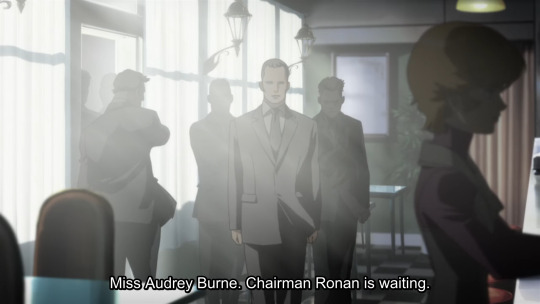
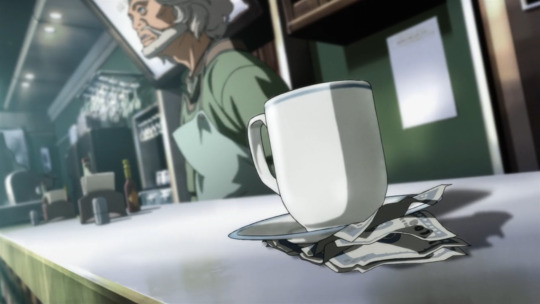
The sixth Unicorn novel is an extremely frustrating experience for me. It's my least favourite of the books by a wide margin, and it comes at you very suddenly after the first five, which I think are generally interesting and a lot of fun.
OVA 4 covers the plot of the sixth novel. It removed everything I disliked about the book, and replaced it all with something much better.
...And then it found entirely new ways to annoy me, by removing or otherwise fucking around with several novel scenes that were already good. Yes, it's Riddhe again.
I'm genuinely kind of baffled.
Still, overall it was a far more enjoyable experience than its novel equivalent. I'm going to talk about novel stuff right away this time, because it's kind of unavoidable. The OVA is very different, right from the first scene.
(Previous posts: Day of the Unicorn, The Second Coming of Char, The Ghost of Laplace)
FYI: I'm saving detailed discussion of any particularly disturbing or otherwise sensitive novel-only content for the end, in the last two sections. There will be content warnings listed under the headings for those sections.
Major structural changes: Dakar and Torrington
This is a huge change, right out of the gate. The attack on Dakar is where the main conflict of the novel takes place, but here it's already ending in the very first scene! For a while I wondered if they were going to return and attack it again, but it quickly became clear that wasn't the case.
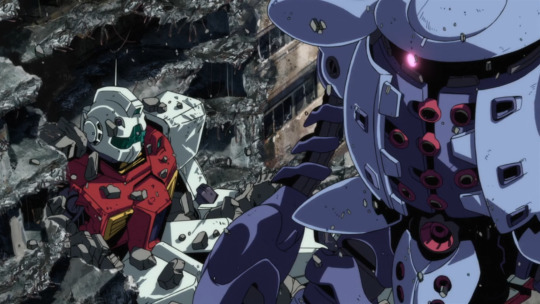
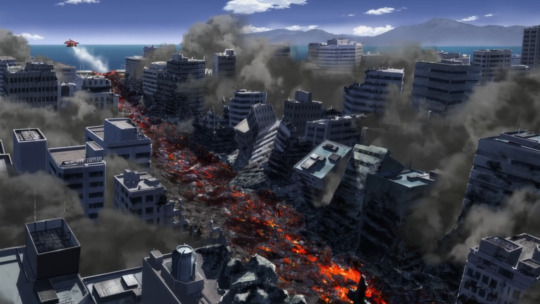
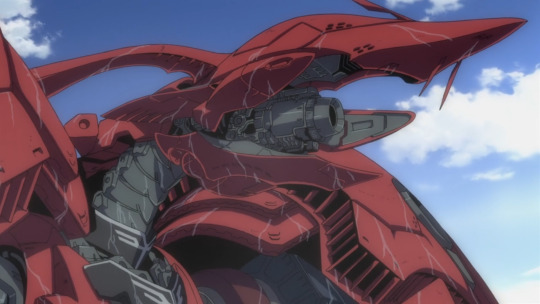
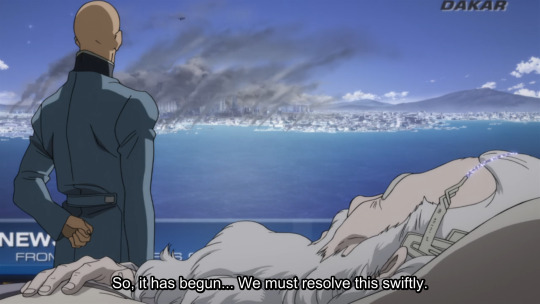
Syam and Gael make an appearance. They don't tell us anything new, I don't think-- and we've seen that colony drop flashback before too, haven't we? I could be wrong. Regardless, I think they're mostly just making sure the audience doesn't forget Syam and Gael exist while everything else is going on. Probably a good idea.
We know a lot more about Syam's deal right from the get-go in the books, because it's literally prologue. I feel like significantly less has been explained here about his history and the history of the Vist Foundation-- but it's admittedly hard for me to keep straight what we've been told in previous OVAs vs. any gaps I may be filling in with prior knowledge.
I do wonder how they're going to handle him going forward. Are they going to infodump a bunch of relevant history and character motivation further on? Are they just going to refuse to elaborate on certain things?
Because they've been skipping over smaller character details about Syam that we learn through Cardeas, Martha, and Gael, he seems to be presented as a lot more... straightforwardly benevolent, at least on the surface. Almost ethereal, even. I think novel Syam has more of an edge, even if he's supposedly feeling repentant now that he's a sad old man.
Oh, and Gael. Gael was shot by Alberto on the Argama during the Palau battle, in the fifth novel. Maybe something equivalent to that is coming in the next OVA, on the Ra Cailum instead? They could also just skip it, since he survives and appears after that anyway.
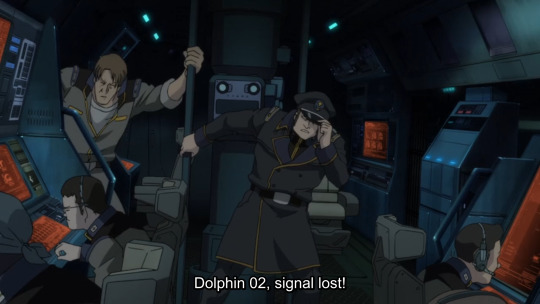
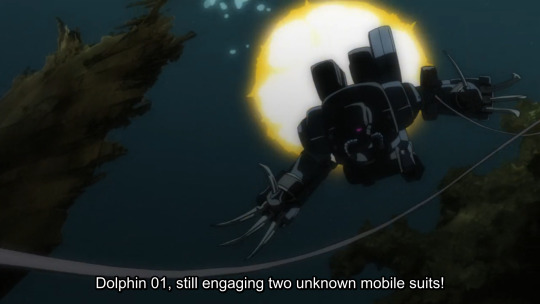
This Zee Zulu was not present for the novel scene I'm about to discuss, but consider this: I like aquatic mobile suits.
The novel opens like this, with the Shamblo destroying a submarine. The context is different than the anime equivalent, since Dakar hasn't happened yet and there are no other mobile suits present. Nobody in the Federation is aware the Shamblo even exists yet.
The submarine in the novel was searching for the Garancieres, since it was believed based on the trajectory that it would have landed in the ocean (as opposed to the desert, where it actually ended up). One of the sonar operators picks up some strange noise, but it doesn't fit the profile of what they're looking for, so his superior tells him to ignore it. This was a mistake. The Shamblo-- also searching for the Garancieres-- tears their hull apart, killing everyone on board.

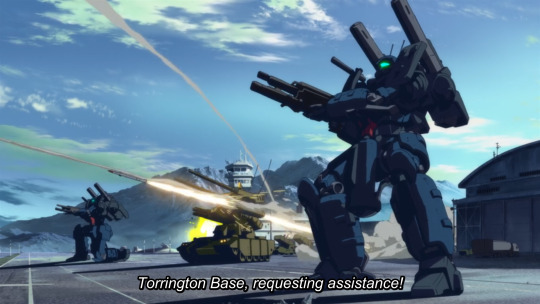
Instead of Dakar, the main conflict in OVA 4 takes place in and around Torrington Base-- a location from the seventh novel. They've essentially moved Loni's arc forward, and combined it with another battle.
I originally assumed this might have been a censorship concern, but a whole bunch of civilian casualties still happen, so... seems more about wanting to get to Torrington faster. I was very surprised when they didn't censor the woman with the baby on the fire escape. I remember reading the novel equivalent and thinking "oh, they're cutting that for sure". Shows what I know.
The novel version of Torrington doesn't have any civilian infrastructure around to damage. It's an extremely remote and backwater location.
Even with the addition of a nearby city, putting the coordinates in Torrington is significantly less callous on Cardeas' part than having them in Dakar. Programming the La+ program so they have to activate the NT-D in the middle of the Federation capital is stupid as shit, assuming your goal isn't to kill a bunch of random noncombatants. Novel Banagher's explanation for why he might have done it is so generous that it just kinda makes me sad.
I'm sorry Banagher, I know you're still traumatized because he exploded, but your dad doesn't give a shit about other people. He prioritizes poetic imagery in his treasure hunt over the lives of human beings. He zapped your brain as a child to check whether you could pilot the robot good. He sucks, Banagher.
The Parliament building as a location does give a much more direct clue to the nature of the Box-- the Federation charter is on the ground floor, and we're told through character dialogue that it's a replica of the original that was destroyed at Laplace.
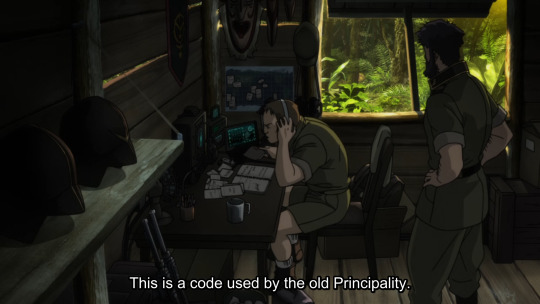
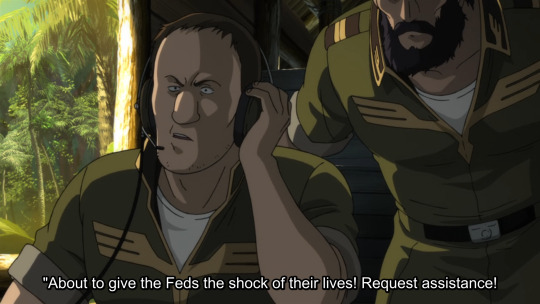
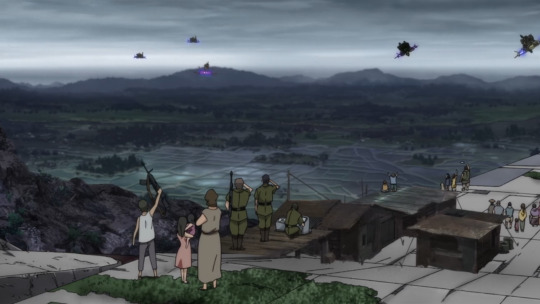
This montage of all the scattered Zeon forces on Earth mobilizing might be my favourite sequence in the film. This is another situation where I wish I could include images for all of it. Don't even get me started on the music in this part. God, it's so sick. Cool fucking robot. (Image of a child holding a rifle flying over my head)
Yonem Kirks was originally a character from novel 7. He had nothing to do with Loni, as she was already dead when he was introduced. He was actually the leader of the group of Zeon remnants who picked up the transmission requesting assistance for the attack on Torrington. He would have been in the place of that nameless beardy guy up there, whose face we never fully get to see. He is eventually killed by Marida in the Banshee.
OVA 4 recasts Kirks as a surrogate father figure for Loni. In the novel, Loni's father is still alive, and he's also one of the main reasons that book six is my least favourite. You'll see.
Loni takes over her father’s original role as a character, but with everything I hated about him stripped out. I think that rules. I initially thought they were going to put Kirks in his role, but what they went with was definitely more interesting.
I'll talk more about Loni at the end of this post, since she's the core of the whole arc. She's a substantially different character in each version. I will also explain exactly what her dad's deal is in the book, and why I do not like it.
Let me get this out of my system first.
The Character Assassination of Riddhe Marcenas
Imagine: an interesting character is rewritten so that everything you liked is either downplayed or removed, and then your least favourite aspect of their personality or story is inflated to become their most important character trait. This is what experiencing anime Riddhe is like for me.
I feel like I'm being pranked. Literally, the degree to which they are systematically removing all his most interesting and sympathetic qualities is starting to feel like a running gag. It's not just things being cut for time, either; they've changed dialogue and body language in ways that can only be deliberate. Someone clearly decided that changing Riddhe's personality was necessary, and I can't figure out why.
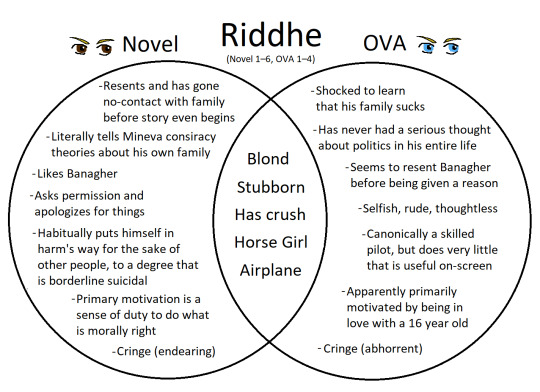
I got mad enough about this to make a diagram. I didn't even realize just how much I apparently liked this guy until they took him away.
Riddhe becoming increasingly closed off, obsessive, and myopic is a significant degeneration, and it happens over a fairly long stretch of plot. It's interesting because we're given time to get used to this guy as a positive force before watching him spiral, and he's clearly still trying to be good even as he self-destructs. That's how it feels for the characters, and that's ideally how it should feel for the audience.
If he's just kind of a self-absorbed dickhead from the start, what's the point? Where's the juice? Where's a drama? Why should we care, on an emotional level, whether or not it's still possible to pull him back from the cliff?
Look, I admit that I was less cartoonishly mad about this on the second watch. I can imagine a more charitable reading of this character than my bitter little hater response. I'm sure the anime version works fine for people who haven't read the novels, or who have but don't care about the original character, or at least don't find the new version as deeply unlikable as I do. But it makes me so crazy.
I'm going to go through his scenes, so you can see exactly what I mean.
Riddhe & Ronan
Riddhe's first scene in the OVA is his conversation with Ronan. This is a scene from the fifth novel-- if you read my post on OVA 3, you may remember my surprise that there was so little of Riddhe and Mineva doing stuff on Earth. Clearly, some of it was pushed foward to be in this one instead. Sure. Fine.
In the novel version of this scene, Riddhe is waiting alone in his father's office. Two other people come by to speak to him before Ronan arrives. I'm fine with these conversations getting cut for time, but I do think they're interesting, so I'm going to go over them.
First is the Butler, Doillon-- the novel's fan translation spells it Dwiyon. Doillon is described as a father figure to Riddhe, and clearly one he feels more positively about than Ronan. Doillon tells Riddhe that he missed him, and asks him not to leave again. He says that he's old and will likely die soon, and he's worried about the family-- Ronan is also getting older, and his health is declining (heart issues).
We also meet Riddhe's older sister, Cynthia, who either doesn't exist in the OVA or is off doing vivacious socialite things elsewhere. She also tries to convince Riddhe to come home. She asks him about Audrey, tells him she's cute, and insists they both come to a party she's hosting later.
There's some discussion of Riddhe's mother, both in narration and dialogue. We're reminded that she's ill (unspecified) and living in a nursing home. It's implied that she might have had some kind of nervous breakdown because of "the political world," but it's unclear whether that means she was a politician herself, or if it was more about her involvement with Ronan.
At this point Ronan comes in, and everyone else gets shooed out.
OVA Riddhe's demeanour around Ronan is... curious? Maybe nervous, and a little dismissive, but trying to act respectful. He's very goofy, rubbernecking and trying eavesdrop on Ronan's phone call. It would be cute, if he didn't piss me off so badly within the next five minutes. Ronan, meanwhile, feels very distant, keeping his back turned away for much of the scene.
The novel relationship is extremely tense and hostile, and a lot of that energy comes from Riddhe. He has to deliberately restrain himself from being aggressive and getting angry during this scene, because he's aware he needs his father's authority if he's going to keep Mineva safe.
Riddhe hates being in his family's house. He does not like his father, and is constantly on edge when he's around. In many scenes, he deliberately avoids even looking at him. When we're told that Riddhe "ran away", the connotations of that are very different from in the OVA, where it sounds like he just left on a fanciful whim.
So the familial relationship is different. Fine. I think it's less interesting, but I can live with it.
Here's where I start getting mad:
Ronan accusing Riddhe of being in love with Mineva and suggesting that this is the reason he brought her to Earth is an anime-only addition.
Obviously, a character in a story believing something doesn't make it an objective fact. The framing, however, implies that Ronan is correct: Riddhe has a dramatic startle reaction, they've failed to establish any other strong motivation, and immediately after this scene he goes and proposes to her.
The scene where Riddhe talks to Mineva is a combination of two different scenes from the novel-- first the hug on the balcony, and later the proposal. The original two scenes have completely different (and incompatible) tones, and they're separated by a good amount of time, as well. There's also another scene between them, with Riddhe riding his horse, so I'll talk a little about that too.
The way these scenes have been combined not only fully re-centres Riddhe's character around being in love with Mineva, but it also makes him way more invasive and pushy. I fucking hate this guy. He sucks! Where's my boy!!!!
The Balcony Scene
The balcony scene takes place during the dinner party held by Riddhe's sister and her husband, after Riddhe has had his conversation with Ronan. The guests are mostly wealthy older women, the wives of important men.
Mineva is cautious and a bit intimidated. She is introduced as Audrey Burne, and stated to be the daughter of one of Ronan's connections. Riddhe is obviously sulking, refusing to speak to the point where he won't even respond to direct questions and his sister has to carry the conversation for him.
The guests begin gossiping about the recent terrorist attack on Industrial 7. The way they discuss the deaths is not particularly respectful. They talk about Zeon and spacenoids in general almost as if they're inhuman aliens. Cynthia tries to steer the conversation elsewhere. Mineva is horribly uncomfortable.
Riddhe stands up and leaves the table without saying anything. Mineva isn't able to find a good opportunity to leave and go look for him until 10 minutes later. She eventually finds him on the balcony facing the courtyard.
“I’m sorry” the voice entered her ears, and she looked forward, staring right at Riddhe’s back as he still looked forward. She lowered her face and said, “There’s no need for you to apologize...” “I feel that this is reality too. If I continue to remain in Neo Zeon, I wouldn’t know all of these things.” This might be a good chance to learn. Mineva muttered in her depressed heart, but she could not find any words to overcome these words that were full of such prejudice. She thought that mutual understanding was just a dream, and she remained unable to breathe in this helplessness of hers. “That’s not it.” Riddhe said as his shoulders trembled, and he clenched his hands that were on the handrails tightly. “That’s not what I want to talk about…” ... [His shoulders trembled,] probably because he was crying. That was not an emotion that could be caused by a breakdown in talks between him and Ronan, and Mineva sensed that there was a greater despair and sense of loss here, “Riddhe…” she called him, and approached his trembling figure. Suddenly, that back profile left the handrails, and Riddhe turned to Mineva, his chest filling her sights. Mineva was hugged around the shoulders as she was pulled to him, and he embraced her in his clutches. “I’m sorry, I…I actually brought you to such a unthinkable place…!” ... “No matter what, I’ll protect you well no matter what, so please stay here, stay by me…don’t leave me alone…” Water droplets that had warmth dripped on her hair, wetting her forehead. Why is he crying? What’s causing him so much pain? At that moment, Mineva had no sense of uneasiness or disgust as she felt Riddhe’s trembling body with her own. She hesitated over whether she should put her arms around him, and she looked at the sky that was entering the night from past the shoulders wearing the military uniform.
It's just... a completely different scene, with a completely different context.
Look at the description of that hug! Is that the impression you got from the hug in the anime, that Mineva felt at ease? The only person whose feelings we can tell for certain in that scene is Riddhe, and Mineva seems uncomfortable and unhappy both before and after the conversation.
The scene ends here. We get a continuation much later, as the final scene of the novel.
Mineva is alone in her room, several hours after the conversation on the balcony. We're told that Riddhe ran away from the house immediately afterward, without looking at her or explaining what had him so upset. She wonders what he's doing now, then wonders what she's doing. She feels helpless and lost, and rather unlike herself. In the past, she has always been very decisive. These confused, conflicted feelings are strange and unfamiliar to her.
When she looks up at the sky and asks Banagher what she should do, one of the stars is implied to be the Unicorn falling through the atmosphere. I think that imagery is really lovely.
Riddhe Horsegirl Moments
A couple days later, Mineva watches from a distance as Riddhe rides his horse. She is impressed by how in sync they are and how much trust there must be between them, but she also thinks that the horse is clearly picking up on Riddhe's anger and seems anxious.
(Right before this scene, when Ronan is watching Riddhe out the window, we're told that Riddhe deliberately learned a second, different riding style than the one popular with upper-class people that he was originally taught, because he thought it was boring. lol)
Cynthia comes out onto the terrace to talk to Mineva. They talk about Riddhe, and Cynthia describes her perception of his personality. The fan translation is kind of garbled here, but I'll include the passage anyway:
Cynthia looked down at Riddhe that was riding on the horse, “He’s really a useless child.” She sighed as she mused, and Mineva did not feel comfortable hearing this. “He’s always been like this in the past, always unable to hide what he was thinking, and never cared about the people around him when he put his mind to him. He’s already everywhere at once, but he’s attracted to small details for some reason, so he’ll always bear everything by himself alone.” This is really a rather accurate correct analysis. Mineva felt impressed that Riddhe’s relative was able to see through him so thoroughly, but felt a little depressed as she thought about how she had not been talking to Riddhe during this while...
Jp text for the list of traits:
「昔からそう。一途で、隠し事ができなくて、思い込んだら脇目も振らずに突っ走っちゃう。そのくせ、変に気が回るもんだから、ひとりでいろいろ抱え込んじゃうのよね」
Possible alt translation (I have no expertise, take with salt just as you would the other):
"It's always been that way. He's single-minded, can't hide anything, and when he makes up his mind, he rushes forward without looking the other way. Despite that, he's strangely anxious, so he takes on a lot of things by himself."
We're then told exactly how long Mineva has been staying at the Marcenas residence (3 days), and what the atmosphere has been like in the house. Riddhe is barely around, apparently busy repairing the Delta Plus. Ronan and Cynthia's husband Patrick avoid Mineva entirely. Cynthia and Doillon are the only people she has to spend time with, and neither of them is aware of her true identity.
Cynthia assures Mineva that Riddhe will probably get over whatever is bothering him soon enough and be back to his old self, but Mineva feels an ominous certainty that she's wrong.
My impression of novel Mineva is that she generally likes Riddhe and enjoys his company. She worries about him, and feels lonely when he starts becoming increasingly distant and angry. She doesn't like that she can see him changing, and she can tell that he's hurting. It's upsetting to her! She had just gotten to know this guy, and suddenly he's acting like a stranger again.
I have a hard time believing that OVA Mineva has enjoyed being in the same room with Riddhe at any point. She seems pragmatic and politely disinterested at best. Her body language with people she clearly likes-- Banagher, or hell, even the guy in the diner-- is very different.
The Most Depressing Proposal in the World
The dialogue of the proposal itself and Mineva's rejection is basically the same. Everything else about Riddhe's behaviour and body language is completely different.
They even completely inverted the exchange when he opens the door! In the novel, Riddhe asks if he can come in, and Mineva replies "this is your house, isn't it," but in the anime, he opens the door without asking and she's upset about the presumption.
It's such a small thing, but it's a clear signal to me that these changes are purposeful. They had zero reason to do that, unless they want to change the audience's perception of Riddhe and his relationship to Mineva. This suggests to me that they're not failing to adapt the novel character, but intentionally replacing him with something different. But... why? To what end?
This scene happens right after we learn that Riddhe is being sent to serve under Bright on the Ra Cailum. The context of the proposal is him telling her he's leaving.
Mineva has been in the house for at least ten days at this point. She has been feeling increasingly anxious and constrained, and by now she feels a strong desire to leave.
Riddhe is very distant and stiff. He tells her he's leaving, and apologizes. This is when he finally tells her about his conversation with Ronan, how the Marcenas family and the Vist Foundation "are like two mirrors facing each other," and that his family likely intends to use her as a hostage.
Then we get the proposal. It's so vaguely delivered that Mineva literally does not understand what he's asking at first. Not only does he not hug her, he's not even looking at her. He has a weird little twitch when bringing up his dad. The whole thing is miserable and kind of pathetic.
“So... can you become a member of our family?” In contrast, Riddhe said this without turning around to look. Mineva did not understand what he was saying to her as she frowned. “How about you abandon Zeon and the Zabi family, and become a member of the Marcenas family? In that case, my dad will—” To Riddhe, the last words were probably something he did not expect. His eyelids twitched, and he seemed to recover as he went quiet and lowered his eyes that were once facing Mineva. “…Even if it’s just a formality, this meaningless war will end like that, and you’ll be free.” “Do you feel…that can be considered freedom?” Mineva too lowered her sights, her heart feeling the sand-like bitterness. These words sounded too tragic to both the speaker and the listener, and even though they were just a few connected words, she could understand that her body and mind were gradually being contaminated. Something very important was starting to fall off, unable to be retrieved again—this kind of disappointment spread in her heart.
I'm sure Riddhe does think a marriage would reduce the danger she's in, but this is still a selfish question. He probably even knows it. It's just not the same kind of selfish as if he had barged into her room uninvited and proposed immediately during a fit of emotion because he's apparently madly in love with her, good grief.
Not even Riddhe wants to be "a member of his family." He had refused to speak to them for three years, well before he had the family secret dropped on him. But we're supposed to believe he thinks pulling Mineva into that is a good idea? Please. He is horrified by the idea of being alone with them.
He wants Mineva to stay because she's the only outside person he has left to hold onto, because he cut off all his other established positive relationships when he helped her escape.
Personally, I think that kind of total alienation is a lot more psychologically interesting than just being freshly upset and smitten with her!
Even though he knew how many risks he was taking, I think Riddhe was still telling himself he'd be able to wriggle out of it eventually. He'd use his dad's authority to secure Mineva's safety, and then he'd wait for another chance to run away and be a pilot again later.
Being told about the Box was the nail in the coffin for that, because it gave him a new, permanent sense of obligation to re-affiliate with his family, to "take responsibility for their sins." Perceived moral obligation is Riddhe's kryptonite.
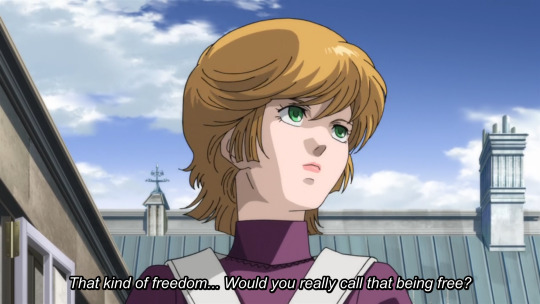
The anime cut the conversation here, right after the rejection. Do you want to know what Riddhe's next line of dialogue is?
“Sorry, forget what I just said.”
lol. lmao even.
Like the anime, this conversation is the catalyst for Mineva running away. The scene in the diner is from Novel 7, as is Martha demanding Ronan give her Mineva. It all happens after Riddhe leaves.
The Ra Cailum
The Tri-Stars are not happy to have Riddhe on their ship.
When Riddhe first approaches the Ra Cailum in the Delta Plus and attempts to board, they actively antagonize him in their own mobile suits: they physically get in his way, don't respond to his hails, and one of them even fires on him.
Riddhe pulls off a dramatic maneuver to get past them, and this impresses them enough for the squad leader to say "alright, you've convinced me that you're more than just a useless nepotism hire."
They did not have authorization to do this. All four of them get dragged into Bright's office immediately after getting out of their suits. The Tri-Stars lie about what happened to avoid further trouble, and Riddhe goes along with the cover story. Bright orders the Tri-Stars to go clean the deck, and they leave.
The incident confirmed in Riddhe's mind that he's being given special treatment, so he brings it up to Bright:
The reason why the Tri-Stars would pull such petty tricks on him was because news of him being given special treatment was spread through the ship. He was already mentally prepared about being viewed as an irritant, but he could not stand being treated as a troublesome VIP and being unable to do anything. He stared at the back that had no intent of looking back at him and continued to emphasize with a restrained tone. “I’ve been through battle before. Please don’t remove me from dangerous missions just because I have to keep watch—” “DON’T BE NAÏVE!” Bright turned around to let out a roar that pierced through the pilot suit, causing goosebumps on Riddhe’s skin.
This conversation hits different when the "dangerous" situations Riddhe keeps putting himself in are on the extreme end even for a military pilot.
Novel Riddhe's disregard for his own safety is remarkable. I talked about it some in the last post, but after the conversation with his dad it takes on a more desperate tone. There is something very clearly wrong with this guy, and every time other people die around him it gets a little worse.
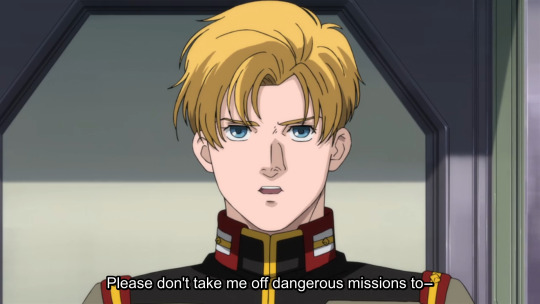
When I call Riddhe "borderline suicidal," I'm not saying he's consciously trying to kill himself, to be clear. He's not trying to get shot down on purpose-- quite the opposite.
I have no intention of dying. Right now, I don’t have a reason for that, before I can redeem the crimes of this cursed bloodline of mine— he muttered in his frozen heart, “Yes”, answered, and saluted.
The reckless death drive and the belief he has an obligation to stay alive can coexist without coming into conflict because they're ultimately coming from the same place and serving the same goal. He needs to keep existing in order to protect other people, and he needs to protect other people in order to justify having ever existed in the first place.
Or, basically: if you die, you only get to sacrifice yourself once, but so long as you survive you can keep doing it forever.
(And of course, what he thinks in the abstract while safely tucked away in an office is also different from how he behaves in actual combat, when people around him are dying.)
You'll get new examples when I get to what Riddhe does during the battle of Dakar. For now, we'll finish up the conversation with Bright.
Bright tells Riddhe to come back alive in both versions, but in the novel he also tells him to go clean the deck with the Tri-Stars if he wants to be treated like a normal pilot.
Nigel, the leader of the Tri-Stars, is waiting outside the door when Riddhe leaves Bright's office. Riddhe sighs and tells him he's going to help clean the deck. Nigel tells him he's too rigid, and he's going to end up wasting his talent. He doesn't let up even when Riddhe tries to be deferential:
... Riddhe instinctively looked away and said, “I won’t cause trouble for you.” ... but Nigel moved away from the wall and spoke, “You’re a rookie who doesn’t even know the meaning of the word team? Well, us Tri-Stars do whatever we want, and there’s no need for us to give you suggestions, but I’ll shoot you down from behind if you dare to pull the Ra Cailum fleet down. You better remember that.”
The equivalent to this line in the OVA seems a lot friendlier and more like banter. I think he's being truthful here, or at the very least genuinely trying to intimidate Riddhe.
Riddhe realizes Nigel still doesn't trust him and is continuing to treat him like an outsider. He thinks that maybe it's for the best, and responds with sarcastic praise.
Then we get this truly astounding line which I'm almost certain is a translation error, but I need you to see it anyway:
“Your sarcasm ain’t half bad there. Are you saying that us idiots who only know how to train are having a group orgy or something?”
Well I wasn't thinking it before but I'm certainly thinking it now. Why are you being so unwelcoming and excluding Riddhe from the group orgy, Nigel?
(The Japanese is "おれたちは訓練バカの仲良しグループってわけか?", if you want to check it yourself. Unless I'm missing some contextual innuendo, I'm pretty sure there is no reference to an orgy here. The phrase that got turned into that means "a group of close friends." He's basically saying "You think we aren't real soldiers and this is just a social club?"
I'm so disappointed. I wish this one was real. I was hoping to at least find a common crude idiom, like how people use "circlejerk" in English.)
Ahem.
Riddhe's attempt to be aloof fails; he immediately admits he's feeling envious and wants to feel included in the group. Nigel is clearly surprised by this, and seeds are planted for the Tri-Stars to come around.
This is important because when the attack on Dakar begins, Riddhe is initially told he isn't allowed to launch because he doesn't belong to any existing squadron. He's eventually given permission to launch with the Tri-Stars, after Nigel vouches for him.
Riddhe and Banagher vs. The Shamblo
The OVA actually reverses Riddhe and Banagher's respective roles here. Novel Riddhe engages the Shamblo well before Banagher is even on the field.
As the Ra Cailum approaches Dakar, they get a clearer picture of the situation. Bright realizes things are worse than they thought, and they need to rethink their approach.
Riddhe requests to be sent ahead on his own, to distract the enemy while the main forces land. He manages to make a convincing argument as to how he can do this without being shot down, and Nigel vouches for him again, so Bright agrees to let him scout ahead.
Riddhe launches on his own, without the Tri-Stars. He thinks about Mihiro and the Argama crew briefly while talking to the communications operator, which is sweet.
As Riddhe approaches the Shamblo, he realizes there are still civilians nearby who haven't finished evacuating. He also spots a GM III, part of Dakar's security forces, and watches it fire missiles even though the pilot should have been able to see the people on the street. Riddhe is furious.
The “GM III” continued to fire its beam rifle wildly at the road covered with dust and smoke. Riddhe grabbed the arm of the [mobile suit] and pulled it to the blind spot of the collapsed department store. (Khairul was killed…!) as the pilot continued to ramble on, “WHAT ARE YOU DOING!?” Riddhe used the communication channel to yell out at him, “Why are you using missiles at such a place!? There’re still people in the city!) (But we can’t let that guy approach the parliament hall…) “For the sake of your pride, you…!”
But then the Shamblo does its laser bits thing, so the GM ends up exploding. A lot of mobile suits nearby explode, in fact (RIP Guntank squad), and fleeing civilians get crushed quite gruesomely.
This is the point where Riddhe's death wish instinct activates, and "scouting" turns into "I need to engage the enemy and tank aggro right now."
“There’s no reason for them to die because of such a thing…!” If this is a tragedy caused by the “Box”. Riddhe let the machine transform, duck low, charge forward and squeezed the trigger of the beam rifle to its maximum. The beams that were deflected by the bits ripped apart the dust, grazing past the head of the “Delta Plus”. The machine then stood on the road in front of several blocks and started firing again. “Get over here!!!” he did not care that the reflected beams grazed past his shields as he let the “Delta Plus” leap up again. “I won’t let you kill anyone else. Just make me the only victim of the “Box”…!” The beam rifle continued to let out shots, and the beams that were reflected back in less than a second shook the machine. Riddhe continued to launch his attacks fervently as he forced the machine to retreat back to the coast. Anyway, I have to let the mobile armor retreat [from] the city and buy time for the civilians to evacuate. How long can I last? His mind that was thinking about this could not work at all, and the “Delta Plus” continued to shoot in a suicidal manner as it danced around the skies above Dakar.
Banagher sees and recognizes the Delta Plus on the monitor just before his fight with Zinnerman. His scenes are intercut with Riddhe and Loni's perspective on the battlefield.
Loni-- a very different character from her OVA counterpart-- keeps picking up on Riddhe's thoughts during combat. She attempts to convince her father that they should change course to avoid the civilians, but he refuses.
Riddhe helps a GM pilot in a damaged suit and tries to convince them to retreat, but they aren't having it. They tell him they're going to get under the Shamblo's feet, and they want him to shoot their suit so it will explode.
Obviously it's normal to feel fucked up about that kind of request, but it's still darkly funny to me how freaked out Riddhe gets, given his behaviour during this entire battle. Self sacrifice... not Riddhe? Death of friendly pilot not Riddhe??? No! No!!! Unacceptable!!!!
It's not Riddhe's choice to make, though. The GM rushes the Shamblo, where it is promptly torn apart and trampled. Riddhe manages to break through his hesitation and fires, but the Shamblo blocks the beam.
Then it fucking gets him. If you remember what I said about the OVA reversing the roles, the bit where the Unicorn gets grabbed by the claws happens to the Delta Plus instead.
The back of the “Delta Plus” was slammed hard onto the road, and the machine was half buried in the cracked asphalt. The large claws grabbed the lower half of the machine to restrain it, while the other claw rose slowly over the head of the “Delta Plus”, showing its malice that it was trying to dice it up as it opened its sharp blades. Riddhe sensed that his body was going to be crushed by this impact and scattered apart as he gritted his bloodied teeth. Is this the end? I can’t do anything, I’ll die here without being able to save anyone. As Riddhe’s concussed mind eked out these thoughts, How annoying, he muttered in his heart...
So then instead of Riddhe breaking off from the Tri-Stars to help Banagher, we get Banagher finally arriving on the scene and swooping in to save Riddhe from getting pureed.
They team up. The Unicorn isn't as manoeuvrable under Earth's gravity and atmospheric conditions as it is in space, so the Delta Plus basically becomes its flight unit.
Banagher is the one who fires the shot and destroys the Shamblo. He's very upset about Loni's death, but there's no moral dilemma or conflict between him and Riddhe.
Loni's situation is very different. She was probably already going to die whether they destroyed the Shamblo or not, and since it had multiple pilots, her death alone would not have stopped its rampage. I'll go over this again in more detail during her section. For now, the point I'm trying to make is that the novel version of this scene emphasizes that Riddhe and Banagher have a positive relationship.
I really get along with this guy instinctively. Riddhe hid this bittersweet reality inside his heart as he went full throttle and let the machine remain as low as possible.
[...]
The thrill when they were accelerating for each other as they raced caused all his senses to sharpen. If only I can remain at that moment of ecstasy.
The OVA scene is about... the opposite of that.
I still can't believe OVA Riddhe looks angry when Banagher's plan works and the Shamblo stops attacking the first time. He fucking scowls? Are you mad you're being proven wrong? That's more important to you in this situation than preventing more deaths? Distinctly un-Riddhelike priorities!
With the Shamblo gone, Riddhe is ordered to capture the Gundam.
The conversation they have about this is significantly longer. There's a lot of Riddhe failing to talk himself into killing Banagher after he refuses to surrender.
He's extremely torn up about it. Because Riddhe likes Banagher.
The metals bellowed as they touched each other, and the voice of the pilot rang within the interaction window. The “Unicorn Gundam” was touching the “Delta Plus” on the shoulder as it opened the communication circuit. ... (I never thought that I would meet you here in such a way…is Audrey alright? Did you make contact with the “Nahel Argama”—) Banagher intended to lean the body forward as he talked. However, Riddhe did not look at the other party’s face. He held his breath and fulfilled what he had to do at this point. The “Delta Plus” shook aside the hand resting on its shoulder ... The “Gundam” tripped, and by the time it managed to steady itself with the AMBAC, the “Delta Plus” was aiming its beam rifle at the abdomen. (Mr Riddhe…!?) “I’ve received an order to capture that “Gundam”. Get off that cockpit, Banagher.” Luckily, the visuals on the communication window were cut off the moment the interaction channel was removed. (Mr Riddhe, why…!) Riddhe merely let Banaher’s outcry chide his ears as his hand holding onto the control stick was trembling. “Don’t call me as if we’re close with each other. Without you, things wouldn’t end up like that…!” (Why’s that so? Mr Riddhe, Audrey—) “You and the “Gundam” are obstacles preventing this Audrey you speak of—Mineva from living peacefully. Get off!” My chest is going to break open. At this rate, I’ll go crazy too—just like this mobile armor that lies dead in front of me. Riddhe lowered his eyes and waited for Banagher to answer in a prayer. I feel you’re a man of your word. I’ll leave Audrey to you. The boy with such strong-willed eyes actually used those words to lay a curse on him and bind him, and though he hoped that the other party would step aside after realizing what was going on—
The things he says about Mineva here are interesting. I think it's very representative of the kind of weird rigid thinking Riddhe has, that even as he tries to talk himself into literally killing Banagher, he still considers the promise to take care of Audrey binding and unassailable.
It's also kind of fascinating that he considers protecting her to be something that he owes to Banagher specifically at all, enough to apparently consider it a burden, given that he had already taken action to do it himself before they ever had that conversation.
Even though he's stubborn and historically disobedient to authority figures like his father, Riddhe is still very... rules-brained, I guess, in his own way. He gets "stuck" on specific things people say to him like this a lot, particularly in the context of morality or a sense of duty.
Banagher won't get out of the Gundam, even at gunpoint. He doesn't understand why Riddhe is acting the way he is, and he wants an explanation.
And here's the important part:
When Banagher calls Riddhe's bluff and Riddhe cannot bring himself to shoot him, Riddhe tells Banangher to flee before anyone else can arrive to capture him.
Yes! He actively decides to disobey orders and let Banagher escape! That's the moment that the 'Black Unicorn' drops in on them! It has to show up for the plot to work, because Riddhe has already backed down as a threat!!!
And Riddhe's still focused on Banagher, even after the Banshee drops a bunch of rubble on his mobile suit. He's stuck there in his unresponsive machine, yelling at Banagher to run away.
There is hostility between Banagher and Riddhe during the Torrington fight in book 7, but the equivalent of that confrontation is presumably something for next time... there are still like, three more emotional bombshells that need to be dropped on Riddhe before he stops instinctively treating Banagher like an ally.
Do you see how, cumulatively, this might as well be a completely different guy?
I've been trying to avoid spoiling anything that happens later in the novels as much as possible, even though I assume most people reading these posts have either already seen the full anime or don't care about spoilers at all. But I simply must say. Holy shit. You're going to have this guy kill a fan favourite character? This guy? Worse Riddhe? I'm wincing just thinking about how apocalyptically fucking mad people must have been. I am imagining the forum posts in my mind's eye, and they're bad.
As much as I love complaining, I do think changes made in any adaptation deserve to be considered in their own right. Even if I don't like them. I've been thinking a lot about what these changes might mean, and what purpose they might serve.
Some possible narrative reasons for Worse Riddhe I came up with:
They needed him to kill this version of Loni in place of Banahger -- I think regular Riddhe would also be willing to kill Loni, once it became obvious that Banagher's plan had failed the first time. She's an enemy combatant who is deliberately killing civilians, and she's either unwilling or unable to stop.
To justify Mineva running away sooner -- as in, they thought if he was too likeable, the audience wouldn't understand why she wanted to leave. This wouldn't be a problem in the first place if they hadn't pushed his scenes forward so they had to happen all at once. Either way, Mineva would have many good reasons to want to leave without Worse Riddhe. Riddhe is only person she really has in her corner-- and then he tells her she's in an unsafe place, and then he leaves.
They were worried he might overshadow Banagher…? I don't think reducing Riddhe's role in on-screen combat would necessitate changing his personality. Also, this is just not something I personally give a shit about. Multiple important characters is not a problem. Banagher would absolutely still get to be cool and heroic. C'mon.
They think the new characterization is likeable / endearing, and the audience is supposed to find the increased focus on unrequited romantic interest in Mineva sympathetic-- [perplexed vocalization]
They think if Riddhe is more naive and jealous from the beginning, bringing him around will be more meaningful, from the angle of "Look, even this guy can be reached through the power of communication and not giving up on a possibility" -- Oo-hoo-oooh, I don't like how plausible this one feels. I can see the exact reasoning that might lead to it. I don't like it.
They're going to do something totally new with him later that never would have occurred to me -- I guess that could save it for me as an artistic decision, if it's interesting enough. Bit of a scary thought, though. What's up your sleeve?
If anyone else has theories or opinions about the rationale here, I'm all ears. I'd love to come up with something good enough to feel even 25% less annoyed about it.
Anyway, we've covered all my Riddhe grievances. Let's move on.
Frontal and Angelo are barely in this one, which is novel accurate.
They get their own section anyway, because they're always important to ME!!!
I get so excited every time Frontal shows up, regardless of context. The Sinanju theme starts playing and I'm already having the time of my life. He's literally just standing there and giving exposition. Embarrassing.
I love how visibly mad Angelo gets every time Zinnerman talks back to Frontal. He's hysterical.
Here's novel Loni experiencing Frontal's uncanny deepfake vibes:
The masked face spoke on the monitor, and Loni did not feel that it was the face of a human. The nose bridge and the lips under the mask were too refined, and the thick blond hair reminded her of a puppet. Am I seeing a complete artificial image here? she felt some goosebumps as she stared at Full Frontal, who was calmly smiling.
Banagher and Zinnerman

Banagher and Zinnerman's relationship is probably the one major story element that changed the least from the page to screen. I'm really glad that's the case. Their scenes together were some of the most enjoyable parts of the book.
There are still slight differences, as is inevitable.
Zinnerman is softer on Banagher in the anime. I think they probably did this just to make it even more shocking when he starts slamming him around and pointing a gun at him later. Novel Zinnerman is a bit more roundabout with how he expresses affection, and also more aggressive.
Zinnerman doesn't hit Banagher in the anime at all until their big fight, but in the novels he does it a number of times. He hits him twice when he's sitting around catatonic at the crash site, and that wasn't even the first time in the series (the first was all the way back on Palau, because Banagher was mouthing off when they drop him off to stay with Gilboa).
They have a confrontation before they head out into the desert, and it's a precursor to the conversation they have while traveling. The two conversations are about the exact same subjects, with the second mostly being a gentler reiteration, so I can see why they'd only keep one. The anime also shifts some of the aggressive energy from Zinnerman to Flaste, instead, by having him yell at Banagher and throw him around.
The scene that's only in the novel, is... scarier, for lack of a better word? Banagher starts out even more dramatically unresponsive and defeated, he ends up getting angrier, and Zinnerman is a lot more threatening.
On Banagher's condition at the crash site:
... he had no sense of will to live on by himself, and he would not ingest food if it was not prepared. If he was left alone, he would just sit around blankly for the entire day. ... There were no effects no matter what they did, whether they tried to threaten him or please him; he would not resist, but he would not show any form of will on his own. ...
On Banagher's internal mental state:
You killed him. You killed Gilboa, Tikva’s father. He had no intention of attacking, and you simply shot him. Tikva’s pitiful for not having a father now. You and him have no fathers. You killed him, and you killed a lot a people—
[...]
We can just run through this desert, Banagher thought. The sunlight can burn the skin, blood my head, dry up all the fluids in my body, and I’ll just become dust. Even the lead in my stomach and this cursed family blood of mine will be burnt to nothing. If I can do that, the “Unicorn” will never move again, the “Gundam” won’t awaken again; I won’t have to kill others, I won’t be killed, and the “Laplace Box” will be sealed forever— And then what? The abnormally cold voice interrupted to end the delusions. The impulse that rose in Banagher’s body quickly wilted as fatigue struck his mind. He found it difficult to think, curled back his body without doing anything and became a stone block like before.
Banagher's despair is also where the title of both the novel and the OVA comes from.
This place is really the bottom of a gravity well, Banagher admitted. His body and mind were tied to the bottom, so heavy that they were unable to move at all. Space felt so distant, and his soul was the only thing melting from his crouched body that was like dust. This is a one and only cog that can make decisions on its own. Don’t lose it—Mr Daguza did say it. I don’t want to lose it, I lost it unwillingly, but I really can’t hang on now. If I try to put it on, my body will break apart. I just want to sit here without thinking and without asking for anything. I’ll keep sitting until my heart melts completely…
And then Zinnerman comes in, and tells him him they're going on a trip. Sorry, you're getting a big chunk of excerpts here, because I really like this entire conversation.
Zinnerman was standing there. His hulking figure was standing there angrily “Stand up.” as he growled with a deep voice. Banagher immediately lost interest in the person who arrived, and immediately lowered his sight. “There’s a town 60km away. I’m going to walk there and get help, and you’re coming with me.” Are you kidding me? a slight electrical flow passed through Banagher’s mind as he lifted his eyes again. He saw the bearded face that was not smiling, and lazily looked down again. At this moment, Zinnerman’s hand grabbed him by the torso, and the body, which had its center of gravity at the back, was immediately dragged off the floor. “How long are you going to mope around here!?” The angry words roared into Banagher’s ears as the sand fell from his limp swaying body. His feet would not listen as his body was supported by hand grabbing him by the chest. However, Zinnerman’s hand that was holding this weight showed no signs of shaking at all. “We’ll leave after sunset. Get into the ship immediately. We need to prepare a lot of things if we want to pass through the desert.”
[...]
“Duty? I did my duty. I rode on the mobile suit and sank a Neo Zeon terrorist. Is that not enough? How many more must I kill?” Only this time did Banagher look right at Zinnerman in the eyes and spoke directly to him. What duty and responsibility? It ended up like this after I listened to those words. As he thought about how he would not be fooled again and intended to stand on his feet, a blunt sound rang in his mind as his world exploded. The body that was punched aside landed hard onto the floor, and the burning hot taste of sand spread in his mouth. The face that was buried in the sand started to ache, and Banagher’s body was trembling as he heard Zinnerman say, “You can deny us all you want.” “But don’t you dare think of yourself as a victim and throw a tantrum at me. I can still recognize it if the one that shot down Gilboa is a pilot, but not a brat who doesn’t have any resolve.”
[...]
The lead in Banagher’s stomach was burning, and he forcefully spat the sand that became dirt in his [mouth.] “I didn’t do this on my own will…” he muttered as he wiped away the blood on the corner of his mouth. “Someone else forced me to ride on a mobile suit, and things ended up like this before I even knew what happened. If you’re not going to forgive me, just kill me. Don’t beat around the bush and talk about something like duty; can’t you just harden your heart and kill me…!?” Zinnerman’s hard fist was still clenched as he answered with his trembling eyelids. See, this man talks big, but he’s no different from those guys who want the “Box”. Banagher said, “You don’t dare to do so anyway.” Banagher said with his busted lips that were curled up. “If I die, the “Unicorn” won’t move. If you can’t extract the data of the “Box”, you’ll just let this treasure rot. No matter how you hate me, it’s impossible for you to kill—” The second impact struck his face, ... “[Those] big shots may think that way, but we’re different”, Zinnerman growled, ... “It doesn’t matter what happens to the “Box”. My ship doesn’t have the room to feed someone like you who has no will to live.” The burly figure became a shadow as it moved towards Banagher, blocking his sights. The eyes of a killer were glittering somehow deep within, just like the first time, and Banagher clenched his hands together with the sand. Banagher stared at the two black eyeballs that were not showing any light, and exerted strength to stiffen his trembling knees. He tried his best to let his trembling body stand up, and glared at Zinnerman with all his strength. Do it if you can. I’ll spit my blood on you once I’m beaten down. As he was driven by this unknown temper, his swaying body was about to straighten, and Zinnerman showed some teeth on his ominous looking face. Before he could understand that it was a smile, he was gently nudged back and landed on his backside. “What kind of expression is that?” Zinnerman gave a wry look, and this was an unexpected response to Banagher as he looked back. “Someone who can give that kind of expression will not collapse that easily. Hurry up and get ready. The desert won’t listen to any excuses humans make.” Zinnerman finished and walked away. Are you serious? Banagher wanted to open his mouth and ask, but was unable to let out a sound as his wildly pounding heart spread the feeling of this fear that came a moment later. His body that was unneeded by anyone and self-neglected continued to give the sound of life stubbornly— “Damn it!” Banagher groaned as he kicked the sand at his feet. The blood that rushed up his body caused him to recall the heat, and the large amount of sweat that suddenly started to flow out evaporated before they dripped.
I really love this scene, and I miss furious blood-spitting Banagher, but I also liked the little sand-throwing tantrum they added to the conversation in the anime, so I can't complain too much. Other than that, the argument in the desert is basically the same.
Then we get the story about Globe. This is another scene where the music really stood out to me -- the track is called "Desert," and I think it's beautiful.
I like how they take advantage of the desert setting to show it to you visually in the form of Banagher seeing mirages, as well the hot wind in the desert evoking the heat from the burning town. It's a clever sequence.
I'll be coming back to Globe in a later section. The story and its telling has been altered in significant ways, although it serves the exact same purpose in the narrative for Zinnerman's motivation. Put a pin in it.
The conversation at the campsite is pretty much exactly the same in both versions, except the novel also describes ancient cave paintings on the stone walls they're using for shelter.
The novel has one more travel scene after this, where they get caught in a simoom and have a harrowing near-death experience. This is where Banagher really thinks through his feelings and resolves that he needs to live. As soon as the storm passes, they realize they're right outside their destination and start laughing hysterically from relief.
The novel also has several scenes where the two of them spend time with Loni in the city, scouting Dakar on foot before the operation. These are mostly about establishing setting, progressing the plot, and strengthening Banagher's connection to Loni, though there are some small Zinnerman moments I thought were charming.
Here's Zinnerman buying Banagher a beer:
Zinnerman suddenly raised his hand and called the waitress beside him. “Another beer please. For him.” He said with a nonchalant look on his face as he pointed at Banagher, wanting him to continue talking. “I’m still underaged, you know!?” Banagher then gave a shocked expression right back as his momentum was worn out. “Just drink. Today’s a special day.” “What’s special…” “You’ve become an adult. There’s no punishment for celebrating a little anyway.” A warm smile Banagher had never seen before caused him to feel some warmth in his stomach. He felt embarrassed, and thought that he could not look back anymore as he turned his stare to the sea surface that was dyed sunset.
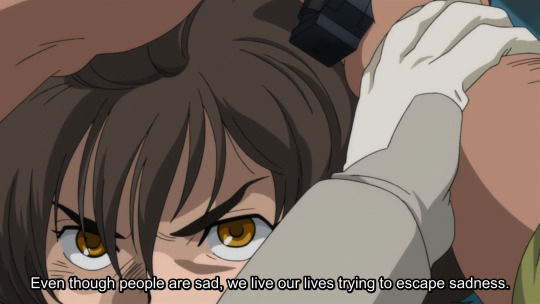

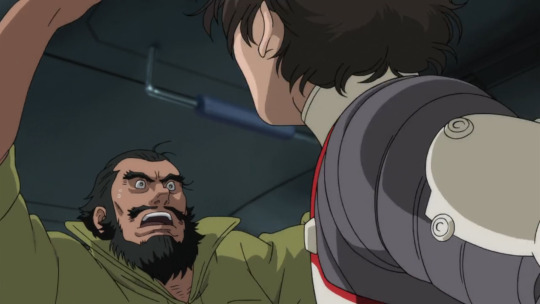
The fight they have during the operation plays out pretty much the same, in both action and dialogue. Zinnerman does cause less lasting visible damage to Banagher in the OVA, though-- he's described as having his face noticeably bruised and banged up in the novel.
I do think novel Banagher knew civilian casualties were a possibility going in (in a way that OVA Banagher possibly did not consider at all, since the target is explicitly military). What horrified him was the deliberate act of murdering innocent people-- similar to novel Loni's feelings, in fact.
Even if he's rationalizing, Zinnerman's response of "you should have expected this" is still much truer about Dakar than Torrington. Come on, Banagher, you didn't consider there might be serious collateral damage if we walk the giant metal laser monster into a major metropolitan area? You saw what happened to Industrial 7. They could have just as easily destroyed that hotel by accident.
Such a good scene, though. Both versions. Get his ass.
Marida, Martha, and Alberto
There's a lot going on here. I'll start with the easy stuff.

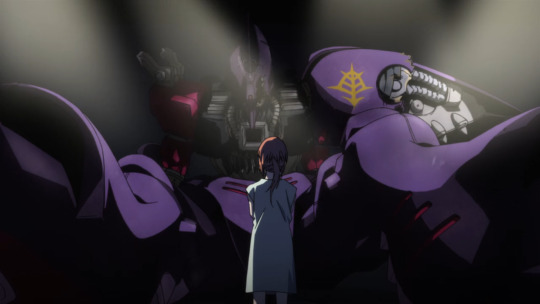

Since Gael was on the Argama at the end of Novel 5, he goes to the bridge and tells them not to let Martha's ship capture the Unicorn. His mission had failed, and Alberto was successfully transferred to Martha's ship with Marida.
Gael warns Banagher through transmission not to trust Alberto and not to follow his instructions. He also tells him explicitly that Alberto killed Cardeas.
Alberto then cuts off Gael's transmission and admits to doing so. He explains his reasons, and then says some fairly cruel things to Banagher. It's clear that this conversation contributed to Banagher's intense despair in the desert; he even quotes Alberto directly at one point.
(The Foundation can’t live on without the Box. But that man intended to bring the “Box” outside.) ... (The Foundation has the “Box”. As long as this fact doesn’t change, it doesn’t matter even if the “Box” doesn’t exist. The key to opening the “Box” has no reason to exist. As long as we can destroy the “Unicorn”, everything will be back to normal. Don’t you understand? To a lot of people, you’re the seed of disaster.) ... (If you want to hate, hate father. Hate our father.) The voice pierced through Banagher’s chest, and then, there was a physical impact that rocked the cockpit. The connected ignition bolt was activated, and the traction wire was severed from the shuttle right from the end.
[...]
Banagher’s vision started to spin in a confusing manner, and the plasma air flow continued to blow by the cockpit. The temperature in the machine gradually rose, and the warning alarms continued to sway amidst the burning hot air. Nobody will save me. There’s no worth in saving me. Everything I know about is wrong. Banagher yelled with a voice that did not make a sound. I shouldn’t be here, I shouldn’t be sitting in this, even my birth onto this Earth is wrong— Banagher’ yell was vaporized by the additional heat, and the color of flames gradually covered everything.
With the line cut, the Garancieres moves in to grab the Unicorn instead. Banagher has passed out, but the Unicorn begins moving entirely on its own. Again it's described as looking like a devil, which is particularly fitting when it's basically fucking on fire. Zinnerman looks at its face and thinks it looks like it's smiling. I love that.
The head of the “Unicorn Gundam” that resembled a human face peeked through the bridge window, and the camera outside the ship was capturing a visual of its glowing eyes. It was an icy cold stare, and those eyes were staring at Zinnerman and company coldly as if it was grading the people inside the ship— “Is that thing…moving by itself?”
[...]
Zinnerman did not have time to shout out as his back hit the ceiling, and he tumbled onto the floor. From the corner of his eyes, he saw that the “Gundam” above him was narrowing its eyes in a smile with its back against the plasma glow. The machine with the appearance of a white devil was definitely smiling, and its body was swaying amidst the vortex that swelled like a mirage.
In book five, it's easy to read the passage with Alberto and not be entirely sure whether the tether being cut was the intention from the start, if it was something Martha ordered, etc. In book six we get explicit confirmation that Alberto made a snap decision at that moment to kill Banagher. He has weird guilt-induced visions of a young Banagher while walking around the cyber-Newtype lab.
... Alberto suddenly went quiet as he stopped in his tracks, as he sensed someone moving at the corner leading to the elevator hall. At a corner of the passage that was somewhat dim because of energy conservation, there was a black shadow popping out from a corner. That shadow moved lightly, forming the shape of a human, and became a shadow of a 4, 5 year old child as it stared right back from the corner. Those familiar eyes looked like they were about to be etched in Alberto’s eyes, and he could not help but look away. Haven’t you had enough already? Alberto thought as he widened his tense eyes with fear. The child who looked eerily similar to Banagher Links suddenly disappeared, and the shadow of the foliage plant placed at the corner was dragged along the floor.
[...]
The white machine fell into the scorching abyss as the traction wire was snapped—he recalled that scene and asked himself whether it was the correct decision. At that time, he merely had the impulse of wanted to get rid of the “Unicorn” from his eyes, and he did not remember making a sane decision. That was because he was scared, and he hated the eyes of the “Unicorn” pilot that were the same as Cardeas—Banagher Links, who was protected by the machine Cardeas put so much effort in making, and who appeared several times in front of him. Those eyes that could overlap his own when he looked into the mirror looked like they would reveal the sins he committed over and over again…
There's a bit more detail given as to the history about the Newtype lab, and why it still exists despite being shuttered. We also learn that it's rumoured to be haunted by the gruesome ghosts of children, who presumably died during experimentation. Alberto is not having a good time, and blames his hallucinations on the rumours.
Now I need to talk about the thorny part:
A lot of the stuff from the novels surrounding Alberto, Martha and Marida that got removed in the anime is related to sexual violence.
Book six has an extreme amount of sexual violence in general.
Content warning for this section: rape / sexual assault, csa, incest. If at any point you want to skip past it, scroll down to the heading and image for Loni's section. SERIOUSLY. I'M NOT KIDDING.
Since I was already talking about Alberto, I'll start there:
Martha and Alberto have an incestuous relationship.
I'm being pretty thorough with my current reread. I'm paying attention to everything, even stuff I don't especially like or find immediately interesting. If anything ever seems really out there, I try to crosscheck the Japanese (for as much as that helps, as a non-speaker). My previous read was much more casual, and I definitely started skimming whenever the incest came up.
As I continue reading into novel seven and beyond, I'm finding that it is... more relevant and also more severe than I remembered. I actually double-checked some scenes from later novels because I was wondering about something, and I'm fairly certain now that the implication is that Martha started grooming Alberto when he was a young teenager. That detail in particular significantly re-frames the kind of antagonist she is, for me.
You can already read sexual malice or eroticism into her interactions with various characters (Marida...), but that's not the same as being a canonical child sexual abuser. It's not like CCA Char stringing Quess along to manipulate her into the robot, or Haman trying and failing to seduce Judau in ZZ. There's no less damning explanation, and it's too prominent for "I pretend I do not see it" to feel like a viable reaction.
Unfortunately for the part of me that just wants to gleefully watch a sexy middle-aged lady be unrelentingly manipulative and terrible to everyone, I think continuing to ignore it would be failing to engage honestly with the text.
But hey, it's not in the anime. Anime Martha, at least, still gets to evil in the uncomplicated and fun kind of way.
I'm definitely going to be paying more attention to this aspect of Alberto as I reread. Unlike the other characters with csa backstories, I do not have any kind of developed opinions about how his is handled...
I wanted to get Martha and Alberto out of the way first because their Whole Situation spans multiple books. They are far from the most prominent instance of sexual violence in book six specifically. They only get three or so lines of unsettling innuendo, if I'm remembering right.
It's not a problem that sexual violence exists in the novels-- some of it is thematically or narratively interesting, and even important to why I'm so attached to certain characters. The problem is the sheer amount of it that gets thrown at you all at once, and how gratuitous it can get. Book six in particular overshoots 'shocking' and 'emotional', right into 'annoying'. It's excessive to the point of feeling stupid, and it cheapens scenes that I think could otherwise be resonant and meaningful.
This is something that's true of many (though not all) of the things I don't like in the Unicorn books-- they feel like frustrating over-extensions of things I did like about them. It's like Fukui doesn't know where to stop, and just takes bigger and bigger swings until it just becomes grossly self-indulgent (or in worse cases, reveals some kind of unpleasant bias).
I still remember reading Marida's backstory in book 5 for the first time and thinking I liked how it was handled, only for next book to go back and do it again but worse. Amazing.
There's a nightmare sequence when she's being brainwashed that has a sudden rape in the middle. It's more graphic than her backstory, which was often explained through metaphor, focused on Marida's emotions, implied through environmental details in the aftermath, etc. This one is just Fukui literally describing an assault to you.
She eventually kills her assailant, but is horrified to look and find the corpse is Zinnerman. Maybe that could have gotten me as a grossout horror moment if it wasn't the endcap for a sequence I didn't like, in a book that's already full of this shit. It's also just not necessarily the kind of shock factor I'm looking for from Gundam specifically. Whatever.
We're later told that the content of the brainwashing is based on Martha, but it's not explained exactly what that means (at least, it is unclear in the English fan translation). The nightmare does start out with Marida witnessing a snippet of Martha's childhood where she attends her father's funeral. Does it draw on her memories? Her worldview? Is it some kind of automatic generative process, or did she write it like a script? We don't know.
At the end of the nightmare, Marida sees herself as a child crying over Zinnerman's body, as an obvious parallel to the funeral of Martha's father at the beginning. I liked this. Shame about the middle.
I said I would come back to Globe. The novel version of the story has significant discussion of rape, including of children. When I compare the fan translation to the Japanese version, some of the lines might be slightly mistranslated, but the actual meanings are never describing anything less grotesque. One of them seems to actually be saying something worse than I had assumed, which is impressive.
The story in the anime states there were no survivors, which is not the case in the book, although there were certainly many horrible deaths.
(The novel tells us directly that a specific character is a survivor of the massacre at Globe. I've already been told that the backstory I'm talking about was cut from the anime, so I guess it's a moot point.
But since the story is being told by Flaste, it's not like some small number of survivors unrelated to him would necessarily be something he'd know about, I guess...)
Flaste also tells Banagher that there was footage of the violence at Globe that ended up being circulated on the black market. Attempting to track down and eliminate the source of the videos is what led to them finding Marida, since she was trafficked through the same network.
I'm done with this part. Unfortunately, the next section is possibly even more thorny.
Loni and Mahdi Garvey
Content warning for this section: racism / orientalism / islamophobia, allusions to real life terrorist attacks, one brief reference to sexual violence. The worst of it is over after you get to the heading "Who is Loni?", but if you want to skip all the way to the conclusion you can always scroll down to the last two images (Loni crying + the Shamblo with the destroyed cockpit).

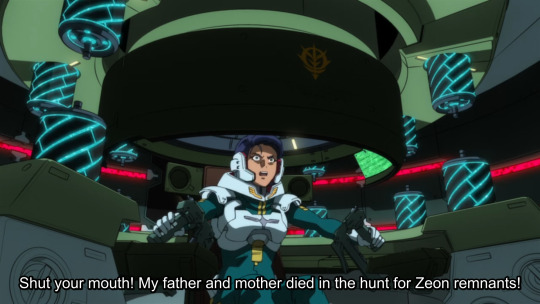
The novel version of the Shamblo requires multiple pilots. The attack on Dakar is carried out by Loni, her two brothers Walid and Abbas, and her father Mahdi.
Novel Loni is generally a voice of mercy and restraint, although she still willingly participates in the operation. Much of her original dialogue during combat has been given to Kirks in the OVA.
Mahdi Garvey is the vengeful, resentful force that wants to punish the Federation for its crimes and destroy its symbols. He is the one who orders attacks on unrelated buildings and refuses to change course to reduce collateral damage, much like OVA Loni does-- however, he is significantly more resistant to being reasoned with than she is, and never has any moments of doubt or regret.
Walid and Abbas have very little agency. I can't remember a single notable line of dialogue from either of them, nor any traits that differentiate them. They're just kind of there in the background, usually doing whatever what Mahdi tells them to do.
All of these characters are explicitly Muslim in the novels.
One of the very first things we're told about Mahdi is that he has multiple wives and many children, but that Loni and her siblings are the 'purest' of his bloodline. We learn this after the destruction of the Federation submarine, while he tells them not to look away from the blood and entrails of the enemies they just killed. We later learn that he harbours a deep grudge not only against the Federation, but specifically against "White Men" -- he usually calls them Franks in Japanese.
I hate this character. I was so relieved when I heard they removed him from the anime. Most important call they made in the entire production, I think.
(The fan translation incorrectly translates "multiple wives and many children" as "many wives and many concubines," so English readers get an even worse first impression, by the way. I made sure to check everything I'm going to complain about in this section so I'm not slandering Fukui for the translator's mistakes.)
Mahdi talks about his religion quite a bit, but he's not portrayed as a religious extremist. He is not a fundamentalist. He doesn't seem to believe his quest for vengeance is something he is divinely commanded to do, although he certainly believes it is morally justified. He's completely fine with his unveiled daughter driving on her own to go pick up two unrelated, non-Muslim men (but he definitely expects her to give him lots of Muslim grandchildren).
His grievances with the Federation don't involve any particular hostility to secularism. He is angry about the Federation officially saying God is dead at the start of the Universal Century, and about the extraction of wealth from Muslim countries that he believes was an intentional destruction of Islamic society-- but I think those are entirely different issues.
You could try to make calls on whether this choice, or any other individual choice made about this character, is less or more offensive than the alternative-- but I think it's beside the point.
Mahdi isn't a Muslim because Islam is specifically important to his motivations; Mahdi is a Muslim because of what that is supposed to represent to the audience. Mahdi is a Muslim because because of the symbol of the Muslim terrorist in the global consciousness, and because Fukui wanted to invoke imagery of 9/11. His character is inherently a bit incoherent, because he's an amalgam of stereotypes about The Other.
I get the feeling a significant part of the research process for this character was looking at the wikipedia page for Osama Bin Laden. I assume Fukui made him less militantly religious than obvious real-life inspirations either because he believed it would be less controversial, or because it meant he wouldn't have to do as much research about Islam.
The through-line from the better-handled themes of the first five books that eventually leads to the terrible destination of Mahdi Garvey is pretty easy to see. It was deeply, deeply frustrating for me to get invested in the way the series acknowledged and engaged with global structural racism (even when it occasionally got a little clumsy or heavy-handed), only for it to drop this on me six books in.
I actually think this mess of a character was probably intended to be a complex, terrible-but-understandable antagonist? I'm completely serious. That's the whole reason it works to transpose his general motivations onto Loni, after removing all the stereotypes and real-world cultural references.
Mahdi is textually compared to Zinnerman (vengeance for the deaths of loved ones and injustice and violence against one's people), and Zinnerman is obviously framed as sympathetic. Mahdi pretty much has the same kind of backstory framework, just with "Muslims" instead of the fictional "Zeon."
Mahdi is also explicitly textually compared to Alberto (inheritor of an established family legacy and all the pressure that entails). Alberto is complicated, but I think he's also a sympathetic antagonist.
And then there's the very first character we meet in the novels, Syam. Syam is also a man from the Middle East who was negatively affected by the Federation's cultural imperialism, and Syam also participates in a terrorist attack. There's even a mention that the guys who recruited him were infiltrating religious institutions, though Syam was not brought in that way, and the religions in question are left unspecified.
Maybe you're wondering why I was so annoyed that Syam's backstory was removed, given I'm glad that Mahdi's was cut. The way they're handled is significantly different.
When he participates in the attack on Laplace, Syam is a nobody with rational motivations to do something awful. His backstory is there to talk about the material conditions and pressures that foment terrorism, including terrorism targeting oppressive governments, and the ways that powerful people take advantage of the desperate.
Mahdi is arguably sort of also that, but it's delivered through the lens of a deranged islamophobic caricature. lol
Syam's story is also a lot vaguer than Mahdi's, when it comes to real-world details. I'm sure there are criticisms one could make of that, too, but I still believe it's preferable in this case. The more you increase the specificity of real-world details in your future scifi world, the more knowledge or personal experience with the subject you need to pull it off convincingly.
Also, Syam not being white made our protagonist explicitly multiracial by extension, which I liked.
(Perhaps interesting: Loni seems to think of Banagher as being within the category of "Frank", but I'm pretty sure Mahdi identified him on sight as someone with "non-Western" heritage. This does not lead him to treat Banagher with any more respect or courtesy, however. Calling Banagher "the Key to the Box" is significantly more dehumanizing in his mouth than Loni's.)
Here's a quote that I think represents Mahdi at his most understandable and humanized. It happens right before he has the Shamblo blow up a hotel full of people out of spite, lmao:
Loni ignored her two brothers who were unable to speak up as she got up from her seat and gave a tense look at her father. Mahdi took her stare “Loni, [those people mocked me].” ... “[A barbarian] who’ll only imitate the white men on the surface, but [still hangs a knife on his waist]…that’s how those people viewed me. Whether it’s the receptionist, the [doorman], or any guest that brushed by, I can tell from their eyes even if they wouldn’t say it. Those people sold their souls to the society of white men, no matter the color of the skin. To those people, we’re just caged animals, pitiful beasts that are reared in the zoo to exchange for the self-satisfaction of a multi-cultural society.” Am I crazy? Mahdi asked himself in a corner of his mind, Then let me go crazy. and then answered his own question as he looked away from the speechless Loni. Father, grandfather, Loni’s mother, they all died in despair and hatred. I could only keep living to vent the regrets of those souls. I interacted with top-class education and culture in those white men’s society, and continued to be an alien that hated them. I tasted the feelings of bitterness, deceit and infidelity, I lived through such a life full of oxymorons, and it’s to be expected that I’ll lose my mind, but it’s all for this day. What should I do if I don’t unleash my madness? Who’s the one causing me to go mad!?
(I made edits to his dialogue here to more closely match the Japanese. The original fan translation said "those people used to mock us," and continued to use plural throughout the explanation, but the original line refers specifically to himself. I'm pretty sure it's specifically about when he was recently there, for his meeting with Banagher and Zinnerman.)
Again, the revenge narrative is basically the same thing we get from Zinnerman. And that part about feeling alienated from whiteness and being looked-down upon even as a highly educated, culturally assimilated person-- that's a real experience of racism! I've heard this sentiment from people in real life!
The problem is that Fukui put that sentiment in the mouth of a character who's a mishmash of stereotypes based on cultural fears that the non-Muslim world has about Muslim men.
The problem is that the only explicitly Muslim characters in this series exist to be terrorists in a heavy-handed 9/11 reference.
Another side note: the bit about the knife. Mahdi carries around a shamshir. When it was first mentioned I was just like "okay, he has a sword. Maybe it's a family heirloom or something." When Banagher notices it, he interprets it as representing racial / cultural pride as a person from the Middle East. Okay.
Fukui knows most of the obvious things about Islam. He knows about daily prayers, and that Muslim women often cover their hair and dress modestly. He knows that idolatry is a sin. He knows that Muslims are not wholly uniform in beliefs and practices. He knows the phrase "inshallah". I'm skeptical about his familiarity with the contents of the Quran beyond that, or the concepts of sunnah / hadith, or the differences between any specific major branches of Islam.
("Inshallah" comes up because Full Frontal says it as an ostensible gesture of cultural respect and cooperation, and Mahdi begrudgingly responds in kind with "Sieg Zeon". Hm.)
There's a bit where Loni gives an explanation to Banagher that liberal Muslims exist, which I guess might be necessary for an audience unfamiliar with Islam. It doesn't feel much like the kind of explanation an actual Muslim woman would give when asked why she doesn't cover her hair and/or face, though. It also immediately gets used as an excuse to scare Banagher with an example of supposed fundamentalist Muslim beliefs (basically, 'if I had been from one of those groups, seeing my looks would mean you either have to marry me or be executed').
Sorry to keep going on asides, but I actually recently watched a youtube video that contrasted Fukui's use of Islam in Unicorn with Ohtagaki's use of Buddhism in Thunderbolt. Since I'm currently reading the Thunderbolt manga, I thought it was interesting.
It amused me a little how the essayist skirts around specifically calling Unicorn's portrayal offensive or bigoted, instead settling for calling it "cringe."
You get the picture, right? I'm sure I could keep dredging up more examples, but I'll move on to how the events play out.
The Shamblo attacks the city as planned. Mahdi is bloodthirsty and vengeful, Loni is troubled, and the brothers are just kind of there. Mahdi has the Shamblo deliberately blow up an unrelated hotel.
Riddhe is flying around, witnessing everyone exploding and having a nervous beakdown about it. Mahdi refuses to change course to reduce civilian casualties when Loni asks.
Banagher fights Zinnerman, launches in the Unicorn, and saves Riddhe from getting crumpled like an empty soda can. Riddhe starts carrying Banagher around so they can do sick aerial stunts.
Then Mahdi has the Shamblo attack "The Trade Center." Fuck off, Fukui. You hack.
Since Loni is hooked into the psycommu, she hears all the deaths as they happen. This is finally too much for her, and she pulls off the helmet and begs her father to stop. Enraged, Mahdi yells at Loni about her mother's death.
The exposition here feels very awkward. Mahdi just drops this story on the reader at the last minute while chastising Loni, who obviously already knew about it. This really didn't need to be treated like a reveal.
“We should have expressed our thoughts sufficiently. I learned that Allah has a merciful and understanding heart. if we continue to massacre, we’ll be defying God.” She climbed up the ladder beside the seat and approached the captain’s seat. “What are you doing? Get back to your seat.” Mahdi growled, but Loni ignored him as she approached. “There are women and children on the Federation streets too. Father, please show mercy…” “Shut up! Did you forget how your mother died!?” [...] “Your mother killed a Federation soldier in the midst of the chaos after the war. She killed a despicable soldier who intended to rape a Muslim female in a refugee camp. The jury was completely one-sided, your mother was sentenced to death, and I couldn’t do anything to save her. I could only let your mother die all just to protect the trust of the company, all just to protect the cursed inheritance as a “Descendant of Dubai”! I endured everything all for the sake of this moment. I’m going to use this “Shamblo” to wreck the parliament hall and prompt all the Muslims to rise up. Our family’s tragic wish will be fulfilled soon, and now even you want to betray me?” The tears rolled down his suddenly widened eyes, dampening his face. This isn’t father. It’s impossible for such a man to be my father. Loni thought, but felt that this might be the first time she was seeing her father’s true state, ...
Realizing she cannot change his mind, Loni pulls a gun on her father. However, he pulls out his own gun and shoots her instead. As she loses consciousness, she reaches out to Banagher with her mind.
The Shamblo's bits are no longer effective without Loni controlling them. Hearing Loni's dying voice telling him to take down the machine, Banagher destroys the Shamblo.
Loni's brothers start arguing with Mahdi after he shoots Loni, but that doesn't save them by leading to a change of heart. They die alongside him in the cockpit.
Who is Loni?
Obviously, Loni is a Lalah archetype. She's one of at least three slightly different Lalah allusions in these books, which is kind of a lot, but I do like that one of them is a man.
Both versions of Loni's death scene have references to Lalah's dialogue in First Gundam ("I finally got to meet you," "It's sad, isn't it?").
Her eyes in the novel are green, also like Lalah. Because of her eye colour, Banagher mentally compares her to Audrey, and also... to his mom. The joke writes itself.
Banagher has significantly more face-to-face interaction with Loni in the novel than the OVA. Because of this, his relationship to her is more personal, at least before they get into each other's heads.
Novel Loni is knowledgeable, patient, and fond of children. She tells Banagher she wants to have ten kids.
She's a nice girl, I guess. It's not really possible to divorce her portrayal as a character from the portrayal of her father, Islam, and Muslims generally. The logic is built into her. I much prefer the character the OVA gave us.
They didn't have to change her character in order to remove the references to Islam. They could have just as easily kept Mahdi as the antagonist while making the Muslims-Zeon swap. I do like what they did, though.
By taking her father's role while also still retaining some of her own, Loni becomes even more central to her arc. She gets to be the primary antagonist and the person that Banagher wants to save. I think it's cool.
Like I said before, I try to avoid getting too deep into spoilers for later novels, but Loni's death in the novel has a number of things in common with the death of another female character that happens later. They're a little too similar for me. I'm sure it's an intentional parallel, but there's not enough contrast for me to find it juicy... I just don't think the narrative actually needs two different female characters to heroically sacrifice themselves so a male character can feel sad about shooting them. Of the two, Loni was the better choice for a rewrite, since this arc needed one anyway.
She still dies, obviously, and Banagher is still sad. There's even still a Lalah callback-- but it's a distinctly different kind of tragedy than the one that happens later. Barring any unexpected future changes, I personally think it's an improvement.

Look! A major theme!
Loni's father is still a presence in the OVA, in much the same way Loni's grandparents were for Mahdi in the novel. This is a story about ghosts of the past.
Tying Loni's rampage in the anime to a runaway psycommu is an interesting difference, especially given she says "Father?" right before it goes haywire. There's almost an insinuation that the machine is possessed.
This works as a metaphor, but if Mahdi was the previous pilot it could theoretically be literal, in much the same way that Neo Zeon managed to get some kind of Essence of Char from the Sazabi's Psycho-Frame when they created Frontal. Mahdi also presumably still developed and built the Shamblo, whether he piloted it or not.
"That isn't her, she's being enslaved."
Loni does describe her father as being swallowed or consumed by the machine in the novel, and she also describes the Shamblo itself as a force "leading people down the wrong path". I definitely interpreted this as metaphorical, though. Loni was the only one with her brain actually hooked into the psycommu.
They did a good job emphasizing the weight of family history as a theme in the OVA. The hands that reach down and pull Banagher's psychic projection away from her face! Again, I love the potential implications.
It's possible there's supplemental information or interviews about this somewhere, but I kind of prefer not having specific lore explanations behind what's happening in these scenes. I like the ambiguity.
Another interesting detail about OVA Loni is the explicit statement of "there's nothing left for me" / "there's no place for me" as a reason why she cannot stop.
This isn't part of her character in the novel, nor Mahdi's, even if loss and being consumed by revenge obviously is. I really like that it adds another connection to Zinnerman and Flaste's dialogue about how they felt after Globe.
I can't stop thinking about how easily I could draw a compelling parallel between the OVA version of Loni and the novel version Riddhe. They simply do not exist in the same universe. They both only ever passingly overhear the less interesting version of each other-- assuming they even notice the other as an individual at all, rather than just an enemy machine.
It's sad, isn't it?
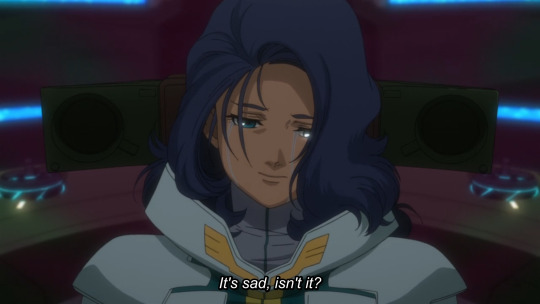
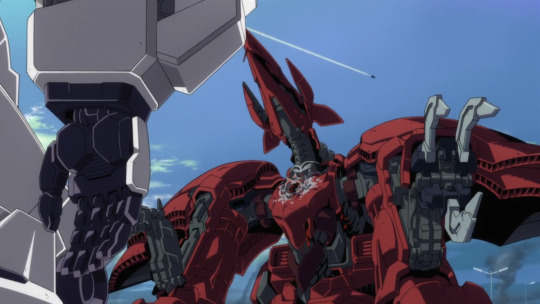
I really like this visual. The hand motif strikes again...
The novel ends with Riddhe and Banagher both knocked out by the Banshee. It also reveals that Marida is the pilot, since Banagher senses her presence. The OVA places its cliffhanger a little earlier, right after the initial reveal.
I'm excited to watch the next one. We've hit the point where I feel like I'm starting to lose my "advantage", so to speak, in terms of knowing what's coming. It's exciting! I enjoy watching these a lot. Even when I dislike a change, I still like thinking and writing about it.
Sorry for the sheer length of this beast, and a huge thank you to the handful of dedicated Unicorn fans following me who are always excited and encouraging. Knowing anyone out there gets something out of these makes my day, and I appreciate your thoughtful responses. ✌️
I'm so glad to be done with novel six. Holy shit.
#Gundam dorks#long post#analysis like this is like nectar to me#especially when it concerns my fav pieces of media
28 notes
·
View notes
Text
SPIDER-VERSE On The Brain

Massive SPIDER-VERSE *spoilers* are ahead... Do not read on if you haven't seen the movie...
It's been four days since I checked out SPIDER-MAN: ACROSS THE SPIDER-VERSE in theaters... And I'm still processing such a rich layer cake of a movie with all this stuff going on, just the sheer ambition of it... And... This story isn't even over, that's the mind-blowing part...
This movie did have pretty strong arcs for Miles Morales, Gwen Stacy, and even Peter B. Parker to some extent, in addition to introducing a major conflict and a soon-to-be-primary antagonist in Miguel O'Hara/Spider-Man 2099... While a larger threat, The Spot, still looms, and there's even a closer to home threat for Miles himself as the picture wraps up...
There's so much more to go, assuming that BEYOND THE SPIDER-VERSE is also going to be a pretty long movie. That this movie was, in the planning stages, getting to be so big that they had to break it up into two parts? Who knows what we're in for...
I feel a lot of ACROSS THE SPIDER-VERSE's narrative brilliance is within its yet to be resolved conflict...
Canon...
Back in 2018, INTO THE SPIDER-VERSE came onto the scene with its dynamic new way of rendering CGI imagery in an animated feature, while throwing in eye-candy flourishes and other dynamic art styles to really make that movie pop amongst other mainstream animated movies *and* the entire comic book movie sphere. In a neat sense, this groundbreaking new way to make an animated feature strengthened the inclusive and quite simple overall message of the story: ANYONE can be Spider-Man.
Now, if INTO THE SPIDER-VERSE said "anyone can be Spider-Man", ACROSS THE SPIDER-VERSE asks what that "anyone" must go through to be Spider-Man.
Can Spider-Man truly be anyone?
What is "canon"?
Miguel is adamant that every Spider, from man to woman to animal to insect, must experience some major tragedy in order to truly be a Spider-Something. A loss of a family member, close friend, or any kind of loved one... That's that about that, that's the nature of the "Spider-Verse", it is set in stone, no other way! Seems to contradict "Anyone can be Spider-Man", right? Apparently Miles can't have a relatively normal non-costumed life, someone he loves HAS to be axed... And that's the case with... How many Spiders? Over 280?
... which quite frankly sounds very controlling and lacking in imagination. And kinda dumb on paper. Miles knows that, even... It all relates back to what his mother and father want for him vs. his ambitions and desires.
"Nah, imma do my own thing"...
Such a liberating line, during such a literally and figuratively heavy moment in the film...
Between Miles' arc and Gwen's story, this autistic queer right here felt something quite resonant from all of this... I needed to see and hear these classic story tropes pulled off in such a great new way at a crucial time in my life...
Now, this works even beyond one's personal journey and how a film relates to someone: ACROSS THE SPIDER-VERSE seems cleverly critical of contemporary superhero movie culture and most nerd-dom, from its most toxic swamps to its most boring offices. Adherence to "canon", shackling oneself to hard-set rules that mustn't be deviated from. It's especially potent coming from a movie series where the main Spider-Man is a black/Puerto Rican teenager, and his pals include a trans Spider-Woman, an older adult Peter Parker who has a child, and many more.
The insistence that Spider-Man has to be this one thing, i.e. Miguel running a Spider-Society that makes sure all Spider-People have that very "Uncle Ben" tragedy happen to them, with NO ANOMALIES... Miles' whole existence as Spider-Man, of course, is revealed to be said anomaly... In that a spider from another universe, Earth-42, got to his, Earth-1610, and bit him... Messing everything up... He's even blamed for Earth-1610 Peter Parker's death, to add insult to injury!
Or DID he mess things up?
Maybe "canon" is a bunch of bullshit.
The very kind of thing that shackles whole characters and franchises down, instead of letting those who come to the sandbox play with the toys THEIR way. INTO THE SPIDER-VERSE came to CG animation and didn't do the Pixar style, didn't do what most other mainstream animated movies were doing, didn't follow the accepted "standard" or "canon"... A friend of mine, in his review of ACROSS THE SPIDER-VERSE, noted something very interesting: This also ties into how a lot of very online animation fans insist that every new movie now must be like SPIDER-VERSE. And like PUSS IN BOOTS: THE LAST WISH. And like any other animated movie that they consider "top tier" or "based" or "cinema". Including a relatively-panned Mario movie. Screw off if you're Pixar making "mid" movies like TURNING RED and ELEMENTAL, or Disney Animation making equally "mid" movies like ENCANTO or RAYA AND THE LAST DRAGON... "Canon" in feature animation, apparently, is now movies that must be like SPIDER-VERSE or PUSS IN BOOTS or whatever. Animated movie "requirements". You have to have scary dark villains, you have to have the most amazing unseen animation style ever, you have to do it all THIS WAY...
This whole "canon" nonsense also ties into superhero movies in general, as well. Even comics, like a lot of runs of Spider-Man are apparently doing... especially in a time of the Marvel Cinematic Universe and the DC movie-verse being clamped down by such hard continuity... That has only morphed into a bigger cluster-cuss, post-SPIDER-VERSE.
I remember when watching the LOKI Disney+ series, thinking... This series is trying to explain in FIVE 40-MINUTE EPISODES something INTO THE SPIDER-VERSE effortlessly explained in less than 5 MINUTES... Then you bring in the Doctor Strange follow-ups, all this stuff about "incursions". Incursions this, Sacred Timelines that... Why is this so goddamn convoluted and wracked head-to-toe with all these RULES? Other multiverse stories don't do this, and Marvel's characters span DECADES... And a big criticism of the recent MCU output is that the continuity, the canon... Doesn't allow for the characters to have their own unique stories, told by filmmakers with individual unique visions working within reasonable guidelines. I feel these two movies, along with EVERYTHING EVERYWHERE ALL AT ONCE, show what a multiverse story can still be in this day and age.
And by using Miguel's rule, ACROSS THE SPIDER-VERSE goes right for the jugular bearing its spider-fangs.
Anyone can be Spider-Man, Spider-Man can have ANY life.
May I also add? The Spot... He's not in the movie much, but his arc... Tying this back to the worst of toxic nerd culture. The Spot is shook by being called some villain of the week and everything else that happened to him (like getting conked by the very bagel from the first movie), and instead of using his weird abilities for something good, he's going to go great lengths to prove that he is not some villain of the week. To become a larger scale threat... And for what? To fill a literal hole in himself? What validity and happiness will this bring him? I see something similar in some aspects of nerd culture, where they take being wronged (I'll humorously compare this to being shoved into lockers, circa 1988) at some point in their life, and turning it into their literal villain origin story... Growing up to be the jocks that bullied them, growing up to be the ones making life harder for other people in the community... The very people complaining about how "w0ke" this movie is for having "forced diversity", the very people who also lob that stolen word at harmless things like the LITTLE MERMAID remake and virtually anything "W0ke Disney" puts out these days, the very people who had literal shit-fits over MAD MAX: FURY ROAD, every new STAR WARS movie, GHOSTBUSTERS 2016, SHE-RA AND THE PRINCESSES OF POWER, new MUPPET BABIES, any new STAR TREK media, the list goes on and on... That's The Spot. Funny how some superhero movies, even animated superhero movies, have these villains who feel like they've been wronged and feel like they're entitled to something...
Just more texture to this ludicrously-textured layer cake movie... Yeah, CAKE itself is a big part of the movie, too. Look at that-
All this, amidst a backdrop of hundreds of Spider-People, a surrealistic smorgasbord of visual styles and animation techniques (Spider-Punk alone, YOWZA YOWZA YOWZA!), a multiverse-spanning story, and at the end... All of it tying back to who Miles Morales wants to be. How he wants to tell HIS story... When he defies Miguel on the train, it's a monumental moment...
And the story isn't even over yet... This movie is something special.
#spider man across the spiderverse spoilers#spider man across the spiderverse#spiderverse#across the spiderverse#unorganized thoughts#animated movies#personal thoughts
28 notes
·
View notes
Note
So is it just me or is the setup to save the 3 main villains looking kind of forced? Deku seeing Shigaraki’s child form, Dabi’s whole family feeling guilty and wanting to save him, and Toga crying. Dabi is the most believable but I wish there was more nuance about his family’s feelings.
I'll get to my thoughts on your actual ask beneath the cut down below, anon, but I feel obliged to point out first that I haven't really put a lot of stock in the “““villain trio”””(1) conceptually since My Villain Academia, and particularly Spinner’s closing narration in Chapter 239. Not to say that there's no reason to talk about Shigaraki, Toga and Dabi as a group, but the way some people talk about them and what their stories require of the larger narrative has always struck me as banking way too much on the prominence of that trio in anime merchandise art and not enough on what's actually going on with the League in the manga.
In that sense, my biggest fear about the set-up on saving just the "villain trio" is the way that the current scenario leaves other villains–and particularly non-League villains–out in the cold. For all that it seems obvious that the manga is maneuvering the kids towards the idea that saving villains is the right thing to do–that it's in bridging the divide between hero and villain that they will collectively become "the greatest heroes"–it's still glaringly obvious that this salvation doesn’t apply to villains as a group.
Why does that matter? Well, first let's go ahead and look at the gonna-get-saved-by-the-kids trio, because all three of them point in the direction of the answer to that question, and while two of them are, in my opinion, set up pretty well to do so, the third is a goddamn mess.
Which is a problem, seeing as it's the one with the most crucial parts of the narrative riding on it.
Beneath the cut: thoughts on the individual set-ups for saving Toga, Dabi, and Shigaraki–including lengthy diversions onto Uraraka’s money concerns and why we should have kept them, how the Todoroki Plot reflects on the larger plot of BNHA+the demands said mirroring puts on it as a narrative of intimate family abuse, and especially the myriad ways the narrative lets down Midoriya Izuku in trying to portray him as a young man “possessed by a drive to save others that eclipses all common understanding”–before coming back around to a discussion of why it isn't enough for just those three to be saved.
TOGA:
So, to start with, I personally feel like Toga’s is the most believable set-up. After all, the only thing that set-up requires is Toga's tears and Uraraka witnessing them, and that’s quite easy to arrange, given that Toga’s tears come when she essentially gets turned down by her crush–except in this case the rejection is also tantamount to a death threat. Of course that’s upsetting!
Ochaco would never, of course, but Toga’s fear of heroes being tied to fear for her life didn’t start with Jin’s murder; it goes all the way back to the training camp attack, which means it probably goes back to her time on the run. Villains being dehumanized to the point of them not counting as “people” fits right into the narrative she already has about heroes, but she clearly hoped for better from Uraraka, so I’m perfectly accepting of her being upset when she instead just gets told that she will be “stopped.”
I like that the matter of Toga feels so much in limbo right now, too. Like, Shigaraki and Dabi may need help, may even want help on some subconscious level, but Shigaraki certainly doesn’t think he’s going to get it, and I suspect Dabi is going to try to murder the first person who offers; he may or may not be laughing hysterically as he does so. Toga is the only one of the three who sought out her opposite number specifically to ask for advice and clarification, functionally a cry for help, only to have her hand very personally slapped away. Her leaving the way she did felt ominous, like a window of opportunity closing before Uraraka even realized it was there. I’m sure things will work out in the end, but there’s a good tension there that I’m rather enjoying.
If anything about the Toga/Uraraka situation feels forced, I think it’s on Uraraka’s end, and it isn’t really about Toga per se, so much as it is Uraraka’s larger arc and what’s driving it. A lot of people rightfully complain about how the character arc Uraraka seemed initially set up for–the one about her family’s financial struggles and how they influence her motivations re: heroism–got binned in favor of making her entire character revolve around Deku, possibly to make her a better parallel to Toga and her struggles with the nature of her “love.” While I’m inclined to agree that Uraraka’s money problems were 10,000x more interesting than her “heroes who protect other heroes” shtick, what annoys me about it is that her money motivations didn’t need to change to tie her to Toga.
Uraraka’s practicality stemming from her financial worries is not mutually exclusive to her crush on Deku and the way it attracts Toga’s attention. A harmless schoolgirl crush did not need to reroute her entire character arc; she could have kept all the financial worries while also being obliged to wrestle with this apparently maniacal serial killer being interested in her, and she would have been affected by Toga’s tears either way, because ultimately, Uraraka’s a nice kid with ample natural empathy, compassion, and desire to help people in need.
This is particularly egregious when you consider that the reasons Toga sought out Uraraka to begin with are a) her grief over Jin’s death and b) her fear of what that death presages for herself, neither of which is in the slightest romantic. Hell, Jin’s own situation is one he found himself in in part because of his poverty. I wish I had any faith that we could one day see Uraraka having to ask herself some uncomfortable questions about her original motivations for getting into heroism and what she might have done if heroism was either not an option at all or not a helpful option because something that makes you wait three years before you’re eligible to start getting paid for it doesn’t pay the rent or put food on the table today.
So, yeah. I don’t know; maybe Uraraka was always going to get derailed by the romance plot because Horikoshi couldn’t figure out a better way to approach her, or because his editor thought the female lead should have more of a focus on romance–Shonen Jump’s editorial staff is famously antiquated about that sort of thing.
But even if something like the above is the case, I ultimately find it hard to lay the blame for any resulting artificiality at the feet of the Saving Villains plot. Uraraka’s arc is awkward because of the ways it pivoted to revolve around her feelings for Deku, not because there’s anything inherently strained or bad about her pull to heroism being about helping people, or her gradually expanding her understanding of who she wants to help and what that help needs to look like in order to be effective via her parents, Deku, Nighteye, the civilians hurt in Gigantomachia’s passage, and eventually Toga. At worst, Uraraka deciding to pursue a career as a rescue hero is a bit Tiresomely Traditionally Feminine and Nurturing, but it would have been a lot more tolerably so without her every scene having to involve Deku somehow or another.
DABI:
As to Dabi, I too wish there was a bit more nuance to the Todoroki family’s feelings, but mainly that’s because my second-highest hope for that plot(2) was that we’d see the two older siblings invert: that Natsuo would be forgiving and want a reconciliation, while Fuyumi–who worked so tirelessly and for so long on salvaging what she could of her family, and who was finally beginning to see those efforts pay off–would be the one who found herself not wanting to forgive.
I never really expected to get that, though, so I’m generally pretty okay with what we’re getting on the Todoroki front. I know a lot of the Western villain fandom/the Endeavor hatedom really loathes the idea that the whole family was “taking responsibility” when Dabi is Endeavor’s monster to the bone, but I prefer to look at it as shrinking the societal down to the personal. It's all about connecting the family's personal troubles with the themes of the series at large, and one of those themes–indeed, possibly the theme as far as the sympathetic villain angle goes–is that society has a responsibility to the victims it creates.
No one single person is responsible for Shigaraki Tomura,(3) and yet, one single person could have made all the difference in the world to him. Whose fault is it, that not one person did? No one’s, obviously, because you can’t pin (to use a different show’s marvelously apt phrasing) a complex network of interrelated forces beyond anyone's control on a single person. Yet still, that crowd of people is indicted by the manga. Them averting their eyes and saying, “It’s not my job; someone else will come along soon; I can’t right now; I’m not the right one.”–their inaction is the systemic fault that the manga has set out to critique from its very first chapter. It is the “normal” that Midoriya Izuku is intended(4) to be marked apart from.
So, if the story is saying that it is everyone's responsibility to try to help someone in need, regardless of whether the situation is their fault or their responsibility, then the story has to bear that out on a personal level as much as it does a societal one. It would ring totally false if the manga were to say that perfect strangers have an obligation to step in and help when help is needed, but somehow not have that hold true for when the need is within one’s own family.(5)
Returning, then, to the Todoroki plot: if we can’t permit family members to even say, “Maybe if I had spoken up back then, I could have stopped it from getting as bad as it did,” in a conversation about the circumstances that led to Dabi without accusing Horikoshi of victim-blaming or abuse apologia, then how on earth can we expect to navigate the conversation about the collective failures that piled up and piled up until they became the lethal hatred Shigaraki bears for the common bystander? If we can indict that crowd of people whose worst crime was to avert their eyes from something uncomfortable they saw one time, telling themselves they’d let a professional handle it, then why can’t the Todoroki family have a frank discussion about a problem they all (with the exception of Shouto) spent years watching get worse and worse and yet still proved unable to avert?
And look, lest anyone think I’m blaming them, of course it wasn’t Fuyumi or Natsuo’s responsibility to fix that whole situation; they were just kids, and, no, I don't seriously think there's anything they could have done that would have changed it. But the two of them looking back on The Problem of Touya with the benefit of hindsight and wondering if there was anything they could have done seems like a perfectly normal, human response to me, and that's even without the themes around the saving of villains being what they are.
Incidentally, the same sentiment cropped up–and received similar complaints from the Western fandom–when Iida said that Class 1-A shared some responsibility for Aoyama’s crimes because they failed to “perceive what was in his heart.” Of course what he did isn’t their fault, but still, the narrative says, he was there and he needed help, and he even tried to ask for it in subtle ways, and yet, no one helped him; everyone just chalked his weirdness up to him being a weirdo and didn’t try to look any deeper. And so, when they look back on those moments, they think, “He needed us then and he needs us now, even if he's given up asking. We owe it to him to try to help because we didn’t back then.”
Yes, there's certainly a conversation to be had about Consequences For Endeavor, but playing blame games in Enji's hospital room when he's out of his mind on grief and painkillers doesn't actually bring Touya back in from the mountain. Touya has to come first.
Class 1-A's conclusion of collective responsibility is the same one the Todorokis reach in the hospital room: We all have to try, because we owe him the help we couldn’t give him when he needed it back then. The conclusion is the same because it's the same conclusion the arc of the Heros vs. Villains story is bending towards.
And on that note…
SHIGARAKI:
As much as I wish it were otherwise, I do, in fact, agree 100% that the set-up on Deku wanting to save Shigaraki is forced, insincere, thematically shakey, underrealized bullshit, and almost all of it goes back to the woeful gap between what the story tells us about Deku and what the story shows us about Deku.
Chiefly, the complaint I have is that I just don’t buy–have never bought–the idea that Deku’s “drive to save” is unique and rare beyond all others.
I'm about to spend a lot of time talking about this, so let me lay out at the outset why it's important to the matter at hand: because Shigaraki is both Hero Society's ultimate villain, the hardest one to defeat, and its ultimate victim, the hardest one to save. Deku's drive to save has to be as extreme as we're told it is because he's going to have to risk everything fighting the villain in Shigaraki (possibly the AFO influence, if ShigAFO is the Final Boss) while also still looking for the remnants of the victim no one else could reach, the one everyone else has written off as unsavable. If the audience has the impression that just anybody could reach the victim in Shigaraki, it will be that much less impactful when Deku does, and that much less convincing when the story is shouting into a megaphone about how impressive it is that he's able to.
If Deku's drive to save falls flat, then the huge deal the story is making about him wanting to save Shigaraki falls flat, and it becomes–in anon's words–"forced."
So.
Deku goes to extreme lengths to save, sure, but has he really gone that much farther than any–than every–other character? What exactly has he done that’s so unique? Risked his arms? Arms which he got healed constantly, and that narrative handwaving has now ensured he can and does still use? That doesn’t impress me like Mirio’s snap decision to knowingly sacrifice his quirk–and with it, all his past efforts and future dreams–to save Eri.
Maybe him sacrificing his connections, like when he left school? But how can I count that when All Might left with him and, within a month, Deku’s entire class turned up to drag him out of his ass and back into their midst? How can one month possibly compare to All Might’s willingness to spend thirty years burning himself out with virtually no close friends or loved ones to show for it?
Deku risked his life? All those heroes who planted themselves in front of Gigantomachia mid-rampage risked their lives. So did every single member of the MLA who escaped the wave of Shigaraki’s Decay in Deika and then, knowing that that deadly attack could still be on the table, pressed into the cloud of dust and ruin out of a desire to help their leader. Hell, Mr. Compress even explicitly called out the idea that only heroes can give their lives for a cause when he consciously chose to maim himself in a way that both he and Best Jeanist clearly assumed would prove fatal.
How am I supposed to be impressed by Deku risking his life after watching Twice give his? No. Nothing Deku has done or sacrificed strikes me as indicative of a drive to save that warrants Nighteye’s description as a sort of madness.
There are only two things I can think of that might argue otherwise, and both of them are compromised by other factors.
First, there’s the idea that Deku risks his life not only for friends (like any number of other characters) or complete strangers (like any hero worth a damn), but also for people who have hurt him and people he cares about–people like middle school Bakugou and Shigaraki. But Bakugou told All Might (and thereby the audience) that Deku’s drive to save is one that doesn’t consider himself; Deku’s fanbase has been arguing for years that his self-sacrificial tendencies are a symptom of a lack of self-worth resulting from the bullying and judgment he faced for being quirkless.
Deku helping people who have hurt him doesn’t make his drive to save impressive; it just means he doesn’t get angry for his own sake. If that’s the case, why should I find that trait admirable? If it’s secretly a character flaw, shouldn’t I want him to change it? But that’s clearly not what the story’s trying to tell me–not unless it’s saving up for a serious endgame pivot on its saintly portrayal of Shigaraki Yoichi.(6)
The other possibility–and this one is much bigger–goes back to anon’s question, and the story's larger thematic thrust: the idea of saving villains.
And like, okay, this would be huge. It should be huge. All those people I listed above, who have risked and given as much or more than Deku ever has? They all undertook those risks, paid those prices, for people on their own side. For innocents, for allies, for friends.
Deku reaching out for villains would represent reaching across the aisle–reaching out for people who his cultural upbringing tacitly trained him to believe were less than human, people who could never possibly need to be saved themselves because they were who heroes saved people from. If Deku had, this whole time, wanted to save villains, now that would be a drive to save that I could believe was so rare as to be called insanity. Hell, even if he didn't start out thinking of saving villains but was the first to try and bridge the gap, that would be something.
But even here, the series undermines him in countless ways.
You know who the first person to reach across the aisle to save someone was?
It was Stain, when he acted to stop Deku being carried off by a Noumu. A villain was the first person to try to save someone ideologically opposed to themselves. Hell, a villain was the second person, too: Spinner, in acting to stop Magne from attacking Deku.(7)
Now, in fairness, the story does portray Stain as a madman, and Spinner was consciously emulating him, not acting on his own inherent beliefs. And, yes, Deku was the first hero to try to save a villain–except that the Todorokis and Uraraka are all right on his heels, and nobody in the story is calling them crazy!
The Todorokis haven’t said the words yet, but anyone who thinks people like Rei or Natsuo are going to be down with murdering Touya for the greater good are fools beyond belief; likewise, there is no damn way Shouto’s position as “hero of the family” ends in him killing his oldest brother and twisted reflection of who he himself knows he could have become.
Meanwhile, though Uraraka has probably not even fully articulated the quandary to herself yet, she’s also running on a lot less knowledge than either the Todorokis–who spent over a decade with Touya and intimately know what every bit of his damage is–or Deku, who literally got to experience a psychic impression of Shigaraki as a weeping five-year-old child clutching his dog while seeing current!Shigaraki being gruesomely consumed by All For One in a flesh-twisting vision out of Cronenberg. So, you know, by comparison,(8) I think Uraraka already feeling the pangs of conscience from catching a brief glimpse of tears from a girl she already knew to be emotionally out of whack is doing pretty well.
And, of course, let’s not forget the way that every single member of Class 1-A was 100% ready to let bygones be bygones mere hours after finding out that their classmate Aoyama is a traitor who set them up for attack after lethal attack that led to injuries, kidnapping, and could easily have gotten any number of them killed.
This goes even further: the problem isn’t just that Deku was neither the first nor the only person to think about saving his enemies; it’s that he has never even faced significant pushback for his allegedly mad, rare, uncommon, nonsensical way of thinking. All Might didn’t fight him on wanting to save Shigaraki. Gran Torino gave him a gentle rebuke that consisted of nothing stronger than asking him to keep murder in mind as an option for “saving.”(9) The One For All vestiges questioned him some but quickly acceded. The Second and Third vestiges repudiated him more strongly, but Deku didn’t even have to win them over by his own efforts; Yoichi did it for him. Tsukauchi and Mic tried to protest holding that hand out to Aoyama, but both of them folded like wet paper the instant Aizawa backed Deku and the other kids’ resolve.
How am I supposed to buy that Deku’s resolve is so shockingly unprecedented when he’s never had to so much as raise his voice about it? For heaven’s sake, the sharpest anyone ever was with him was Nighteye, and even Nighteye’s harsh words were less about wanting to save someone–Eri, as picture-perfect an innocent victim as could possibly be imagined–as about not getting so arrogant as to assume he could just swoop in and carry that rescue out without even thinking about the consequences if something went wrong.
There is one final way the narrative lets Deku down in portraying his singular drive to save: how he treats villains he isn’t primed to be sympathetic towards. I mentioned already that it took that psychic vision to get him thinking about saving Shigaraki, and that’s a lot to require of a character who’s supposed to have this remarkable, unprecedented Saving Instinct. But required it apparently is, because, lacking open weeping (Vision!Shigaraki, La Brava, Aoyama) or an outright explanation of their damage (Gentle Criminal, Lady Nagant), other villains get screwed by Deku without remorse.
Muscular? Well, he didn't want to answer questions about his motives coming from some holier-than-thou teenager, meaning he must be irredeemable, so no need for anyone other than Deku to try to help him. Overhaul? Well, Deku held a grudge about him for Eri’s sake, so while Deku did the bare minimum of saving him from getting shot,(10) don’t expect him to take any steps to save Overhaul from what’s actually tormenting him.(11) The PLF? Hah hah, Deku’s never even met anyone from that group; why would he waste a moment’s thought on their problems?
By the time Deku got around to Dictator, his goal of understanding and saving villains, which he defended so idealistically to the vestiges, had crumbled into thoughts about how he had to “put a stop” to Shigaraki and the League; the only thing he wanted to talk to Dictator about was where he could find All For One. He offered the man not even one question about e.g. why he felt he needed “security.”
And look, Dictator is obviously a caricature who we are not meant to even consider the notion of a sympathetic backstory for. But fans are all too willing to invent abusive parents for Shinsou wholecloth based on his peers’ reactions to his mind-control quirk, we saw directly how Toga was treated for her inborn biological urges, and both of them have entirely normal, conventionally attractive features. Compare them to a dude with a Thanos chin, a bad case of kyphosis (in the vernacular, hunchback), and a quirk that manifests as cables coming out of his back like something out of The Cell, and tell me you can’t imagine the kinds of issues Dictator might easily have been dealing with since he was three years old.
Where was Deku's drive to save all of those people? If his desire to save is really so profound, why is it contingent on knowing someone's sob story first?
Before seeing Shigaraki in the mindscape, the only villain Deku made a real attempt to soften a landing for was Gentle Criminal, and even there, Gentle was the one to take the first step; he gave Deku an easy lie and all Deku had to do is back him up on it. Deku did, and that’s not nothing, but Gentle Criminal and La Brava were the easiest, “Are villains human?” test on their side of the traitor reveal–it's not some miracle that Deku passed.
Oh, by the way. One more little aside here before we move on. Kirishima was the first hero to openly show sympathy to a villain, back when he was fighting that extremely low tier gang dude in the alley–the one who would shortly shoot himself up with Trigger, becoming, briefly, Moonfish 2.0. He still scolded the man, sure, but he managed to attempt some conversation and openly expressed sympathy for the dude's motivations–about the same tack Deku would take with Gentle, except Kirishima beat him to the punch by forty chapters, largely because Kirishima is a side character and was therefore allowed to have street-level fights with low-stakes threats long before Deku was.
THAT ALL SAID, there’s one other huge, huge problem with the way the manga is currently approaching “saving Shigaraki,” and it’s a problem that’s on Shigaraki’s side, rather than Deku’s. The problem with the Shigaraki side of the equation is that if Shigaraki rolls over and stops being a villain just because Deku saved him from All For One–and with the series set to end within the year, we are rapidly running out of time to get much else(12)–it is going to be the most shameful squandering of everything a character represents that I have ever seen in my life.
Here’s the thing: despite All For One being the man most singly responsible for the existence that is Shigaraki Tomura, Shigaraki’s grievances aren’t about All For One. They never have been. Shigaraki may hate All For One, especially now, but that hatred doesn’t hold a candle to his hate for All Might and his broken promises, for bystanders that snivel about needing to be saved while being too cowardly to try and save others themselves, for heroes that perpetuate that weakness, for an entire system that relentlessly and ruthlessly ignores and villainizes everyone that it couldn’t or wouldn’t save. That is the challenge he poses; that is what has to be overcome for him to be mollified.
All For One has got shit-all to do with Shigaraki’s real accusations against the protagonists. That doesn’t mean he doesn’t need to be saved from All For One; it just means that saving him from All For One cannot be sufficient to resolve his grievances–not the ones he carries for himself, and especially not the ones he represents for others.
Saving Shigaraki has to mean saving everyone Shigaraki speaks for, and thematically, Shigaraki speaks for damn near every villain in the series except All For One. If the kids don’t address those villains' pain, they don’t address his. If they don’t address his pain, they haven’t saved him.
As it stands, individual villains have to earn their rescues by not only having sad backstories or sympathetic personalities, but by having those things where a hero can see them. Re-Destro was groomed from the time he was in schoolboy shorts to take on the burdens of his ancestor? Overhaul was raised by a yakuza boss who clearly never got him the help he needed to deal with his issues about disease and uncleanliness? Mustard is a disaffected middle-schooler with clear hangups about class? Well, they weren’t Sad where a hero character could see it, so fuck ‘em, apparently.
I’m very here for seeing the humanity in villains and wanting to save them, because the current state of affairs in-universe is a goddamn carnival of human rights abuses, but if it never goes any farther than the kids trying to reach people that have pre-demonstrated sympathetic qualities, then it doesn’t amount to shit in my eyes.
As of right now, there is precious little setting apart All Might’s and Deku’s attitudes on Shigaraki: both of them were 100% ready to beat him as savagely as necessary to make him stop, right up until the instant they learned something humanizing and personal about him, and only then did they think about saving him, despite both of them having had ample evidence to think critically about how Shigaraki wound up the way he did way long before they learned his real name/the fact that he used to be a sad kid with a dog. The only difference is that when people tried to talk them out of it, All Might let himself be, while Deku acknowledged the difficulty but claimed to still want to try.(12)
Like, guys, Shigaraki’s sad backstory is not Schrödinger's cat; it exists whether or not a hero bears witness to it. The same goes for every other villain–it has to, because the personal opinion of a sixteen-year-old should not and cannot be the deciding factor in how a society treats its criminals. Obviously, that’s not to say, “Whee, no consequences for anyone because everyone has justification for being the way they are!” but the re-humanization of villains has to go farther than “the three villains that these three high school kids have any reason to care about.”
Look how far having a sympathetic backstory but no high schoolers who cared about him got Jin, after all.
Changing all of this will be a massive, massive feat–but that is, after all, why Shigaraki, who symbolically carries something from every other villain he's faced, is Hero Society’s greatest challenge. He's the greatest villain and greatest victim all in one, because the two categories are, from a practical standpoint, inseparably tangled. Whether you see someone as one or the other is all in how much you know and where you’re looking from.
Now, the story is, of course, ongoing. It is perfectly plausible to me that all this business with setting some of the kids up to see the humanity in these villains is just the first step in them realizing that all the people they’ve been taught to see as inhuman villains have reasons for being the way they are, and those reasons–poverty, abuse, discrimination, generational grudges, urges they were born with and never given a healthy way to channel–are the real enemy. That maps perfectly well to the experience of many real-life people raised on discriminatory rhetoric against The Other who never think to question it until they meet someone who puts a face on the issue, and then have to unlearn an entire lifetime’s worth of messaging.
It’s a slow, difficult, painful process in real life, so if what it takes for the heroes to get there is a smiling girl’s tears, a lost brother’s rage, and the vision of an inconsolable boy and his dog–well, maybe it’s a bit hamfisted, but as long as it doesn’t end with the girl, the brother, and the boy, I can live with that.
But we're awfully late in the game now to only just be starting on that arc.
Thanks for the ask, and I hope I managed to hit on anything you were actually wanting to know somewhere in All Of That. Sorry it took so long!
---------------------------------------------
FOOTNOTES
(1) I would have thought the way I use scare quotes every time I talk about the ““”““villain trio”””“”””“””“”” would make that clear, but perhaps more are in order. Time to start ordering in bulk, I guess.
(2) My highest hope was Dabi being treated less like the Secretly Sweet Good Big Brother the fandom always liked and more like the vengeful D&D-style revenant of Todoroki Touya, which I’m thrilled to say is exactly what the canon is giving me.
(3) The obvious talking point here is All For One, and he certainly comes the closest to bearing singular blame, but even he might never have had what he had to work with if any of Kotarou, Nana, or Gran Torino had made different choices. This is especially the case if Decay proves to be Tenko’s own quirk, a mutation like Eri’s, and not one given to him by AFO.
(4) How successfully Midoriya Izuku really stands apart from that norm is a different matter, about which I will have a great deal more to say shortly.
(5) As, indeed, we also see within the Shimura family. The “one person” to change everything could have been any adult in that household willing to stand up to Kotarou and tell him he was letting his abandonment trauma poison his entire family.
(6) By all means, I would welcome this, but I'm long past the point of expecting it.
(7) And people say he has no connection to the students. Fools, Spinner’s connection to the students is Deku, and not just because of the training camp.
(8) My specific point of comparison would probably be Uraraka taking about four weeks and thirty-five chapters to get to the same question of, “What happens to people that don’t get saved?” that Deku ignores for well over two hundred chapters and the better part of a year. It’s not like Deku didn’t pick up on the implications when Shigaraki laid the crux of his damage bare at Deku’s feet during their mall encounter; Deku asked All Might in the very next chapter if there was ever–as Shigaraki implied–someone that All Might was unable to save. He listened to All Might acknowledge, sure, that’s happened lots of times, and then he apparently just never let himself think about it again, right up until he had his face shoved in the consequences. By comparison, Uraraka got there all on her own, no psychic visions required, just her own insight and ability to push a statement of intent to its logical conclusion.
(9) And despite this bit of ludicrous advice going against everything he just got done facing down a psychic tribunal over, Deku doesn’t even think twice about wearing this man’s mantle.
(10) And both Dabi (the eldest son of a top hero who for years aspired to the career himself, so he presumably has some idea about what the job requirements entail) and Lady Nagant (a hero herself, personally trained by the regulatory bureau in charge of heroes, so you know she's got a pretty good idea of what the party line is) say that heroes are trained to never let people die, no matter who they are. So no, Deku saving Overhaul from getting shot even though he's a villain does not impress me; it's literally and explicitly a matter of basic hero education to not let villains get killed through one's own inaction. This, incidentally, is also why I didn't credit Hawks saving Twice from Dabi's fire as being the first hero to try to save a villain; note that if I did count Deku saving Overhaul from Nagant's bullet, Hawks' earlier save would have been one more way the series undercut him.
(11) Bullshit moral grandstanding that doesn’t materially improve things for anyone, least of all Overhaul’s actual victims, decidedly does not count.
(12) Especially if we're due for any more nonsensical wheel-turning like pissing away ten chapters on sleight-of-hand tricks about how long it will be before Shigaraki is "complete."
(13) Of course, right out of the gate, he tripped and fell on his face so badly that it's probably more apt to compare his performance with Muscular to Hawks' performance with Twice. Both of them go through the same motions of making a perfunctory attempt to persuade a villain to back down from a fight before writing that villain off as a lost cause. The difference is that Hawks was more extreme on both ends–more emotionally invested in getting his villain to surrender, and resorting to more extreme measures when his villain refused. Deku clearly never believed in the questions he was asking Muscular from the start, but he did at least manage to refrain from murdering the man.
#boku no academia#my hero academia#bnha#my writing#stillness answers#stillness has salt#bnha meta#toga himiko#uraraka ochaco#dabi#the todoroki drama#shigaraki tomura#midoriya izuku#deku critical#-ish#he's okay but his concept deserves better than the writing is giving him#which is on the writing more than on him#hero society#this one is just a lot you guys
68 notes
·
View notes
Note
I'm actually so curious. Which things would you specifically change about the Doomsday event? What do you think would've made it much better/more impactful for the overall narrative? /gen
This is a lot to ask of a man who just woke up. But I’ll try my best.
Now, the problems with Doomsday are mostly deeply structural. They’re problems with Tommy’s story and Techno’s story and Philza’s story and the Butcher Army’s story. So, if we really wanted it to be this morally grey issue that the narrative is convinced (?) it is, then we would have to rewrite a large part of S2 - basically everything that’s not the exile.
If we want to go for the “least fixes necessary”-route - the easiest way to fix up Doomsday - then there’s one giant glaring thing: Have Technoblade feel bad.
Now, any stray Technoblade-fans reading this, hear me out! I have my reasons!
One of the most egregious problems that Doomsday has is its horridly confused mood. This comes mostly from the completely different tones of the Technoblade-side and the L’Manburg-side. Techno is elated, happy, giddy even – the L’Manburg-side is downtrodden, they have lost all hope, they’re at the end of their rope.
Narratively speaking – looking at the Three-Act-Structure, which is highly applicable here – this is L’Manburg’s lowest point. And looking at the larger narrative of S2 – beginning to end – this also coincides with the Lowest Point of the larger narrative. Because of this we, the viewers, come to understand the L’Manburg-crew as the protagonists of S2, because the dramatic structure of the season mirrors the dramatic structure of their personal stories.
Now, there are characters that are happy during the Lowest Point – but they’re usually the villains. And we don’t want Technoblade to be the villain, because prior to that – through the Butcher Army event – he’s been framed as righteous in his anger.
The solution here is to also have Techno experience his Lowest Point during the Lowest Point of the larger narrative. He looks at the destruction; he hears Dream – autocratic villain extraordinaire – gloating about how he has won, how no one will be able to stand against him anymore, he sees people like Ghostbur, Tubbo and Tommy grieving and begins to realize that he hasn’t just hurt a government he has hurt people.
(Combined with that, drop Quackity from Doomsday – he doesn’t need to be here and he would muddy the waters as the most overt antagonistic presence besides of Dream. Also, it doesn’t contribute to his story-arc in the slightest)
(Also, have Niki and Fundy delay their villain arc – again, muddies the waters).
A lot of Techno-fans have been telling me in the comments under my YouTube-video, that the main conflict for Techno in S2 is pacifism vs violence. And I see where they come from, but the problem is that it really isn’t a conflict or an arc.
How it goes is: Technoblade is pacifistic – he gets the most convenient excuse to be as violent as possible – he is as violent as possible – his S2-story ends.
There is no sense of any thematic conflict or even character development. It’s very A, B, C with barely any connective tissue or a “dramatic discussion” aka scenes where either the characters or the narrative or both try to formulate a thesis, antithesis, synthesis.
Again, the easiest fix here – though you lose a lot of potential nuance, but again, we’re going for the least necessary changes – is to have Technoblade look at the destruction he wrought and think back to when he was committed to pacifism. He realises that he has become the person he wanted to leave behind, that he has become his worst self. It’s very similar to Tommy’s arc in S2, but that’s because stuff like this works – it’s basic rules of character arcs and storytelling.
(Combined with that, you could also have a story beat, where he tries to talk with the people he saved from the government – you know, Niki or HBomb – and have them be afraid of him, treat him like a monster and a weapon, because of what he has done. Oh, look! Now the incredibly sloppy dehumanization-conflict for Techno is an actual conflict – also good set-up for the syndicate. Techno realizes that you catch more flies with honey and formulates the idea to polish up the image of anarchy).
So, this is my most basic rewrite of Doomsday – again, this loses a lot of the moral ambiguity that S2 goes for and fails to do successfully. But if we wanted to achieve that, we would have to do some major rewrites for the entire S2-storyline and that’s a bit much for me right now.
Of course, even this simple rewrite for Doomsday would have ramifications for the story events that come after. We can’t just leave Technoblade in his Lowest Point – so ideally, he would take part in the S2-Finale. Probably help Tommy to take out Dream – maybe he and Tubbo have a heart-to-heart where they discuss their differences, who knows?
But you only asked for a Doomsday-fix and that’s all you’re gonna get.
#dream smp#dreamsmp#dsmp#dsmpblr#dream smp analysis#dsmp analysis#technoblade#dsmp techno#dsmp technoblade#tommyinnit#dsmp tommy#dsmp tommyinnit#dream smp season 2#dream smp doomsday#quackity#dsmp quackity#tubbo#dsmp tubbo#dream#dreamwastaken#dsmp dream#niki nihachu#nihachu#dsmp nihachu
227 notes
·
View notes
Text
Tangled Salt Marathon - Be Very Afraid
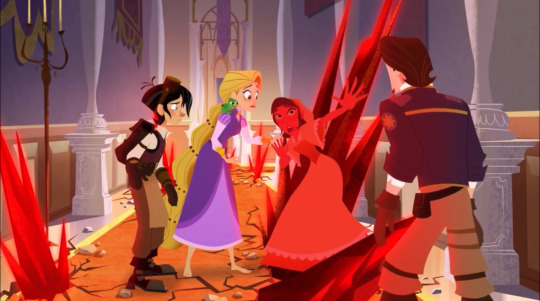
This is the best story arc episode in season three and arguably the best written episode since The Great Tree, but it’s still season three so there are still issues with it.
Summary: When Zhan Tiri tells Cassandra she must destroy Rapunzel in order to wield the Moonstone's true power, Cassandra discovers that she can create, with fear, red rock spikes that cause fear and freeze their victims. Varian discovers the red rocks and teams up with Rapunzel to use his amber solution on them. Meanwhile, Eugene and Lance decide to throw a talent show to distract everyone from their fears.
Why Can’t Cassandra Control The Rocks?
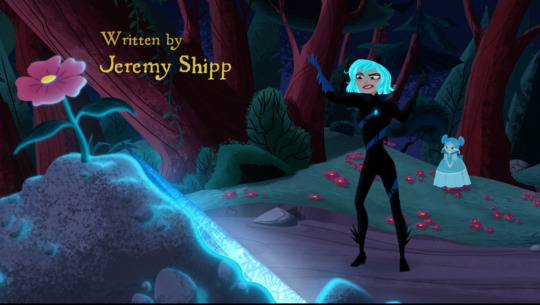
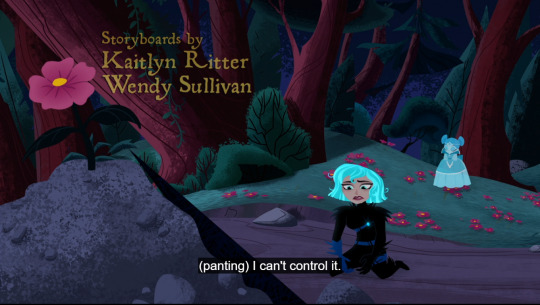
The series never gives an actual explanation for this. She could control them just fine in Rapunzel’s Return, so what’s changed?
There is No Destiny!
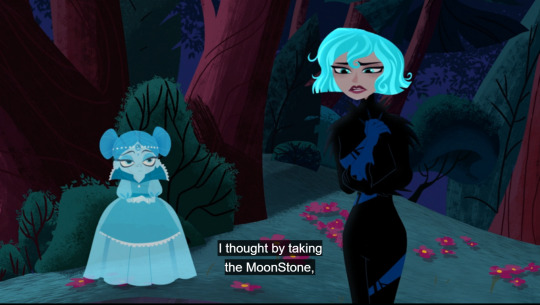


There’s no prophecy, no oracle, no grand design nor master of fate to fight back against; the characters literally have no reason to do what they do. If you want destiny to be a goal then you have to establish what that destiny is first.
What does Cassandra want? How does this connect back to Gothel, Rapunzel, and the Moonstone? Why she just failing about like an idiot here? Did she not have a plan when she threw her life away for this stupid rock?
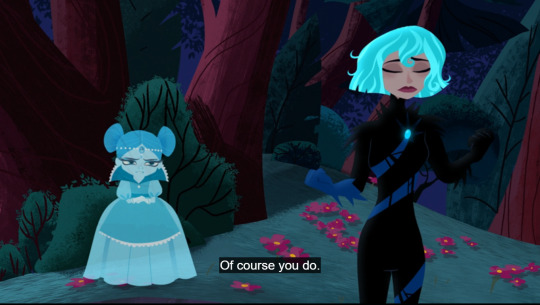
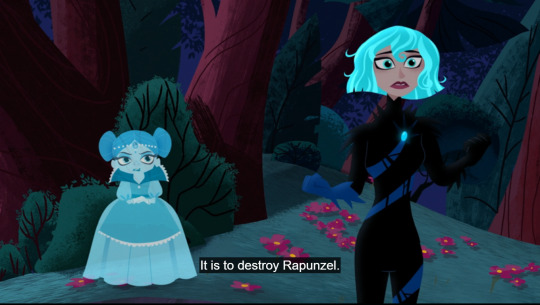
And of course Zhan Tiri is lying here, but why should Cassandra believe her? What does she gain by listening to a creepy ghost girl? This ‘destiny’ has not been established, so therefore there’s no hook nor bait for Zhan Tiri to trap her with.
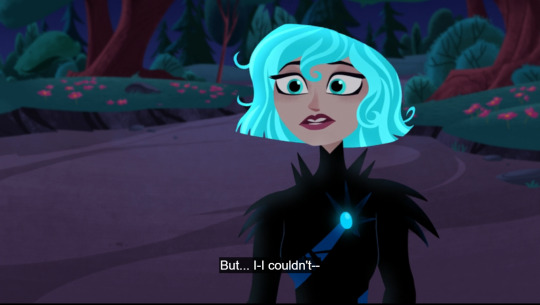
Leading directly into “you should kill your bestie’ should logically put Cassandra off of Zhan Tiri’s advice for good because Zhan Tiri isn’t actually offering anything. Temptation requires the person to be, you know, tempted by what they want, but Cassandra doesn’t know what she wants so none of this makes sense.
The writing is desperately trying to make Cass sympathetic here, but all it winds up doing is making her look like a moron instead.
This Isn’t Consistent
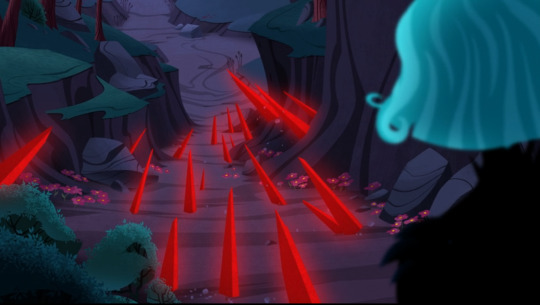
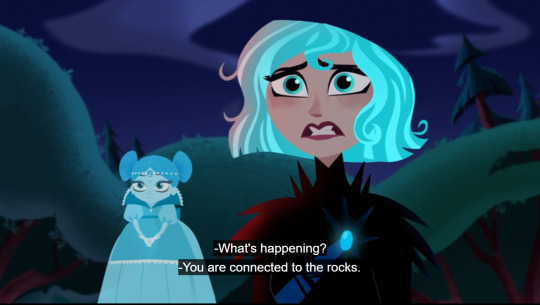
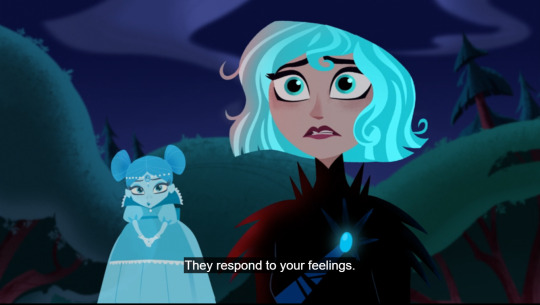
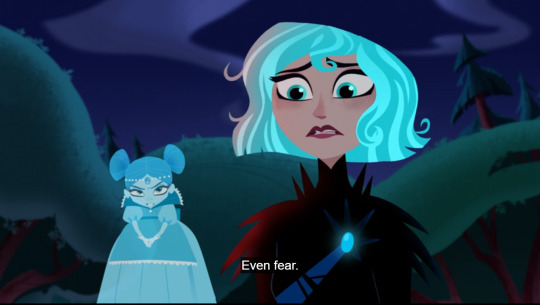
Not only does this fail to explain why Cass could control the rocks previously but no longer can, but it’s also contradicted just a couple of episodes later with the incantation bullshit.
You need an established magic system in place in order for the character’s actions to make sense show!
This Ultimately Goes Nowhere
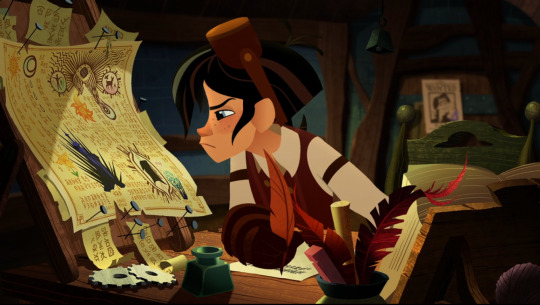
Ignoring how Varian should have been in season two and how translating the scroll should have led to freeing his father, which we’ve talked about previously; this subplot should have had more impact on the narrative than it actually did. Yes, Varian’s translation winds up driving the plot of Cassandra’s Revenge, but 90% of that episode winds up being utterly pointless, including the incantations themselves, so....
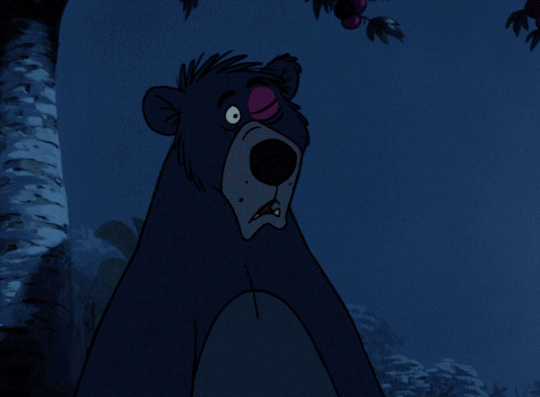
I Like This Sequence; Shame It Winds Up Being Undermined Later
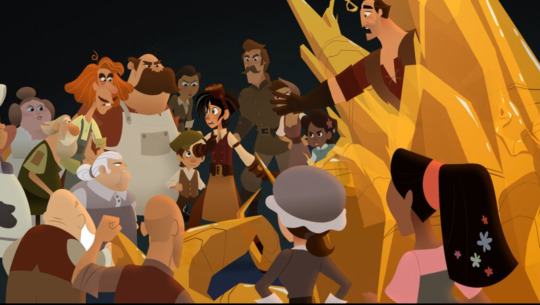
Unlike the majority of dream sequences in this show, this nightmare has an actual point. It more firmly establishes Varian’s fears and gives the audience some insight into what happened to him back in season one. Something we were sorely lacking. It also becomes the core conflict and drive of Varian’s character development through out the episode.
Only for the episode to ignore Varian’s real issues and fail to adequately address anything. By series end this plot point will be completely forgotten. The show acts like bringing it up once and then never acknowledging it ever again just magically revolves Varian’s character arc. It doesn’t.
So How Come Quirin Isn’t Affected By the Rocks?


He’s right there next to them and he shows no reaction to them at all. You’re telling me the man who lost his home twice to these things, almost died to them, and nearly lost his only child because of them, is just not going to respond to new creepy red ones popping up?
Quirin would have a treasure trove of trauma to explore in his own right, that undoubtedly would connect back to Varian’s own issues, but we’re just going to ignore it and have Quirin off screen for the majority of the episode?

Are These New Character Models?
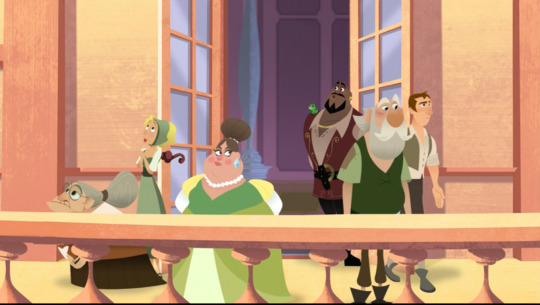
Are you shitting me!?
They built five new models just for a short two minute scene, one where none of the new characters are named nor given lines, only to never appear ever again!
What the fuck? Why did you waste time and money on this? What happened to all of the other background characters you already built? Did a bunch of season one models just get lost or deleted or something?
Also why are they all wearing green? Is it St. Paddy’s Day?
This Plot Point Wasn’t Established Enough Beforehand
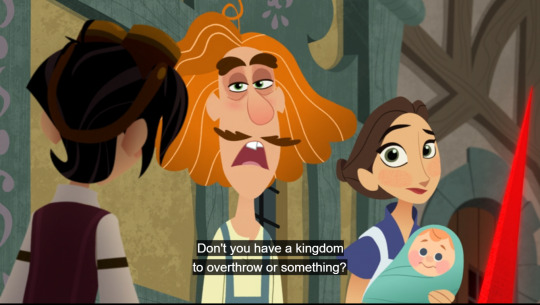

Look, I’ll buy that there are people in Corona who still blame Varian for what happened in season one and for the Sapoiran take over. I mean they’re only getting half the story and were directly effected by his actions whether or not he intended harm to them. But we needed to see more of it beyond just this one scene.
No one was bullying him in Lost Treasure or The King and Queen of Hearts, so for all purposes he appeared to be integrated back into society, and now you’re telling me he’s not and that Rapunzel risked his well being by forcing him to interact with people who were hostile to him back in Lost Treasure?
And yeah you can’t really move Lost Treasure back any further than it already is cause that’d leave a giant hole in the wall of the throne room for over a year. Which also makes no sense either.
Or hey, maybe it’s just Feldspar being an asshole. In which case why should Varian or the audience care?
Eugene is Wasted
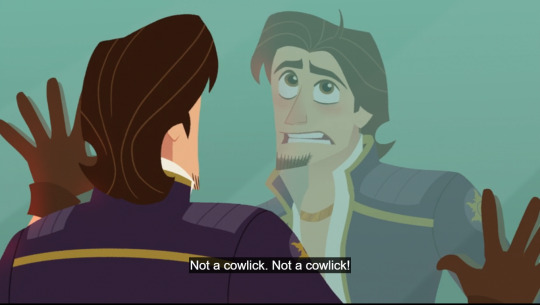
Look I understand that there’s only twenty five minutes to tell this story and that Eugene isn’t the focus of the episode. I also understand that the B-plot is meant to be comedic in order to relive tension from the A plot, but this wasn’t the best way to go about it.
The B plot swings too far wide in the other direction that it dilutes the tension too much. The A plot now has to work over time to keep the urgency going. I could understand it, if the show wanted start off with small fears first, but it needed to ramp up the drama as it got closer to the climax, not under cut it.
We never see Eugene freak out over anything other this this cowlick. In fact we never see him scared of anything else beyond this one scene, which undermines Rapunzel’s arc this episode as she’s suppose to be the only one bottling things in. What makes Eugene so special that he can keep a lid on it with out consequences, or are you telling me that a dumb cowlick is his only fear?
Either answer is stupid.
I Hope You Have Copies of the Map
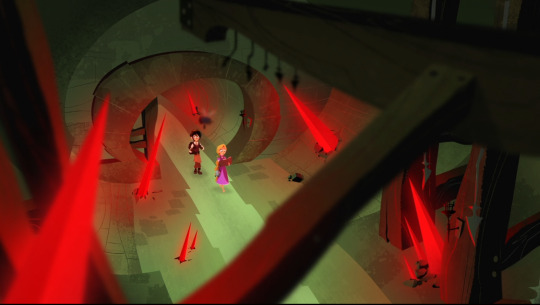
You went through all that trouble to steal the journal for this very reason and now here you are prancing around without it like it’s not that big of deal. Way to undermined past story arcs.
It’s like the writers know that season one was their most successful season, and therefore try to make callbacks to it whenever they can, to make up for ignoring it in season two completely, but they still don’t want to actually acknowledge anything that happened during that season so they just refer to it in the laziest way possible, rendering the previous events pointless.
So Close and Yet So Far
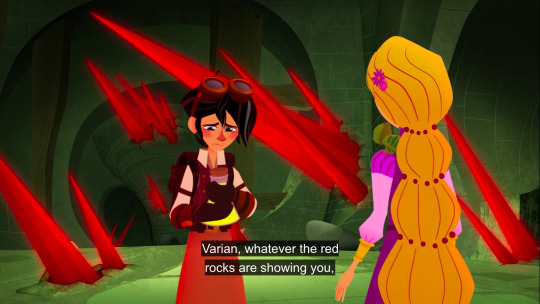
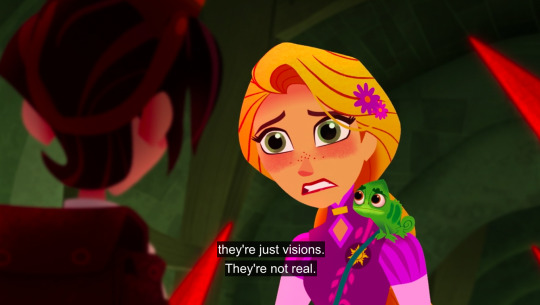
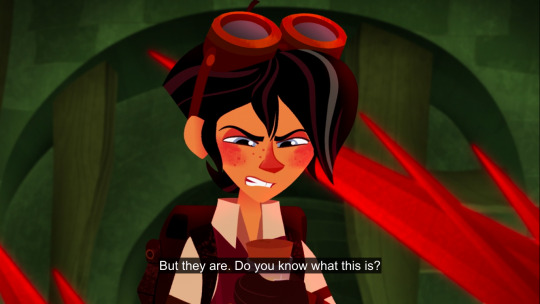
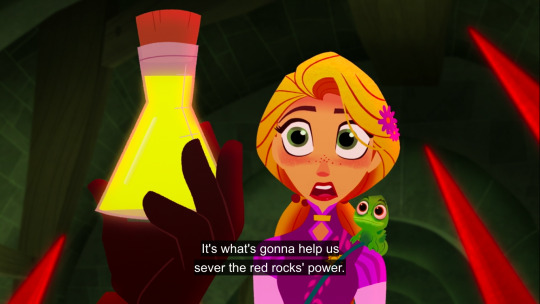
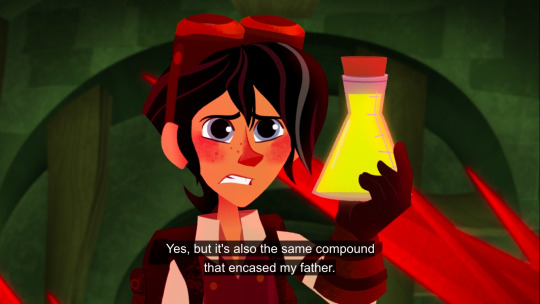
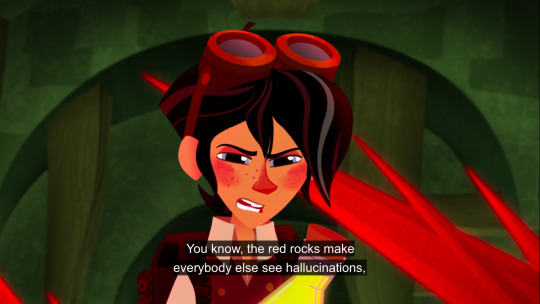
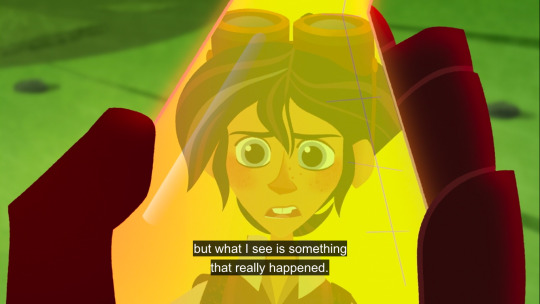

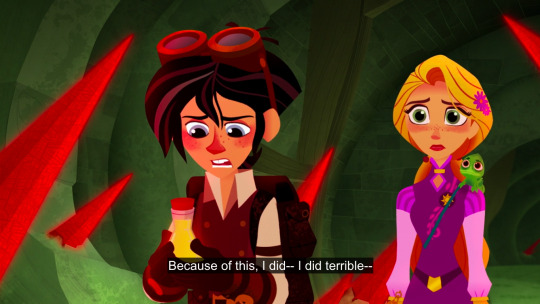
I’m mainly posting this whole conversation so that you dear readers will have context for what I talk about next.
For you see, this scene starts out okay and it looks like we’re finally going to address the elephant in the room regarding Rapunzel’s involvement in Varian’s past trauma, only for the scene to immediately side step the issue all together and not resolve the conflict at all.
No! Don’t Interrupt; Listen!

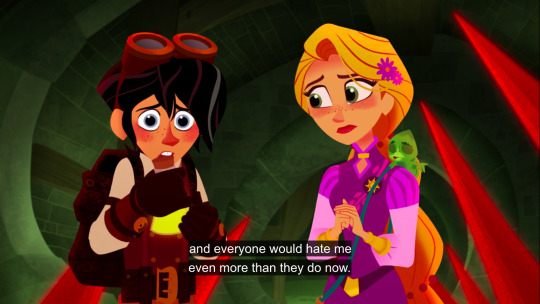

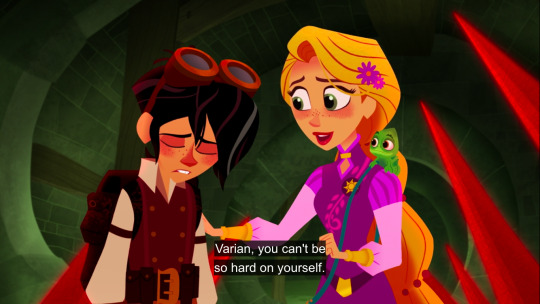
Or at least go all the way and accept some of the blame yourself.
It may look like Rapunzel is comforting Varian here on a superficial level, but without her verballing acknowledging what she did wrong, this action just winds up taking the focus off of Varian and what he needs and places it upon Rapunzel, both narratively and physically.
So what happens is that, in universe, it comes across like she’s just consoling Varian for her own personal comfort rather than genuinely trying to help.
Why Would Varian Ever Think This?

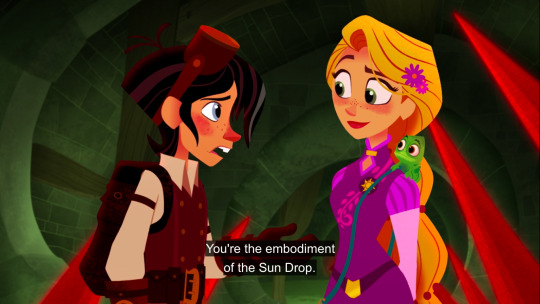
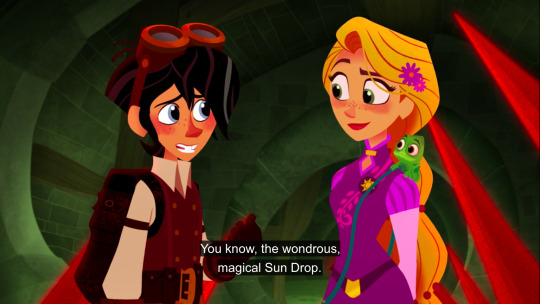
Okay, first off this has nothing to do with what Varian was talking about previously. Why would he jump from discussing his trauma to praising Rapunzel? You know the woman who is responsible for said trauma?
Secondly, this switches the focus of the conflict off of Varian’s specific trauma and makes it about a generic “over coming fear” lesson mixed with an out of place validation issue. Which is not what’s actually needed for his character development; nor for Rapunzel’s for that matter.
Third, being the sundrop has nothing to do with Rapunzel as a person. Her being born with magical powers was an accident of fate, same as her being royalty. She’s not innately better than anybody else because of this and nobody has any narrative reason to assume otherwise. Especially since her powers are utterly disconnected from her actual personality, choices, and actions. All three of which have become unbearably unpleasant by the last season.
Finally, Varian, of all people should be the last person on earth to ever think so highly of Rapunzel. Them being friends again is already pushing believability. Him suddenly kissing her ass the same as everyone else this season is just flat out bad writing.
Varian knows better than anybody what an awful person Rapunzel is. He’s seen her at her worse. He’s seen her not live up to her hypocritical ideals. He knows the larger problems that steam from placing people in power on pedestals. As her former victim, Varian by all accounts should be the one person who can bring Rapunzel down to earth and poke holes into her ego, even while still being her friend. Especially while still being her friend. She needs that! Writing Varian as another blind Rapunzel stan is not only writing him out of character, but it also damages Rapunzel’s own development.
Also Varian hates magic. Why would he now worship someone just for having magic?
THIS AIN’T ABOUT YOU BITCH!!!


I literally yelled that at my tv screen when I first saw this scene. Those were my exact words upon the episode’s first airing. And believe it or not, I’m not one to usually scream obscenities at inanimate objects.
I understand what the writers were trying to accomplish here. They wanted Rapunzel to ease the tension by saying something funny and to make Varian laugh to distract him from his woes; thereby defusing the situation. But it doesn’t work because of season three’s tendency to make Rapunzel the most egotistical, smug, self-centered, abusive, self-righteous twat in the show.
It really boggles the mind just how unaware the writing is. Like, surely no one makes their protagonist this unlikable on accident. Clearly they meant for Rapunzel to be an ass on purpose right? They wanted Cass to have a reason to hate her so they decided to make her insufferable to the viewer in a misguided attempt to make Cass more sympathetic? Right?
Then where is the bloody comeuppance?
I genuinely thought this was all going to lead somewhere. That Rapunzel was going to learn to be a better person and I would have been fine by that. I would have applauded the show if they had turned her into an asshole intentionally so that they could teach a mature and nuanced lesson about morality.
But they didn’t, and here I am; still shaking my head in confusion over a year later.
Seriously what the fuck happened behind the scenes to cause this? How can processionals paid by the largest animation company in the world be so incompetent?
Having Trauma is Not the Same Thing as Having a Phobia
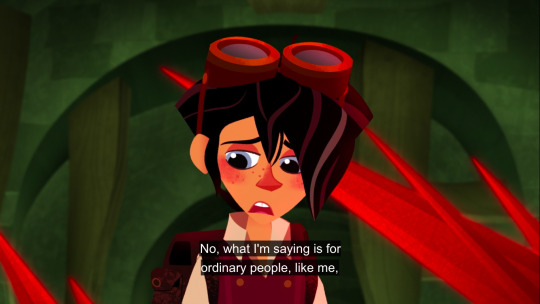
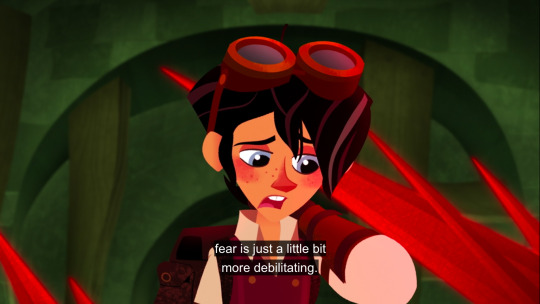
This is where Varian’s arc falls apart. Not only does the episode fail to have Rapunzel acknowledge her past wrongs for a second time, but it also completely mishandles Varian’s trauma because it equates it to being an irrational fear. One that can be overcome through pure force of will at that, same as Lance and everyone else’s fears in the episode.
Ok first off Varian’s fear isn’t irrational. He even just said so at the start of the conversation. Varian’s trauma is very real, it’s not a hypothetical unlike clown-spiders and cowlicks. Also has been given very little reassurance that it won't happen again. Varian has no reason to trust Rapunzel or anybody else in the show. They never owned up to abandoning him previously, and both he and the audience have little reason to believe that Rapunzel wouldn’t just neglect him again if it was convenient for her.
Secondly one does not simply ‘overcome’ trauma. Oh you can deal with trauma, you can manage it and learn to live with it. But it never goes away. It doesn’t magically disappear just because you ‘faced it’.
In fact confronting it head on is actually the opposite of what your suppose to do when going through something traumatic. Studies have shown that distracting your mind after a car crash or what have you actually helps with PTSD later on. And ‘dealing with it” doesn’t mean ignoring the problem out right, but rather learning how to function despite the pain.
But as the show acts like Varian’s trauma never even existed after this episode.
This Doesn’t Resolve Anything!

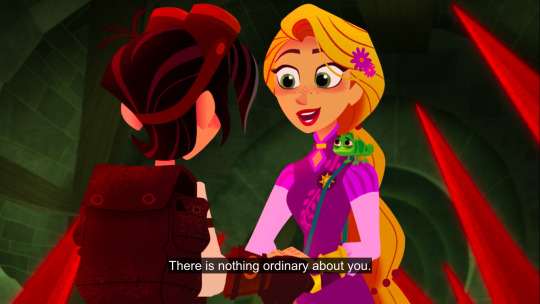
What does “being special” have to with fear? How does this help Varian with his trauma? Empty validation has nothing to with what we were just discussing.
Everyone gets afraid. Everyone has trauma of some sort. Are you telling me that my need for therapy some 20 years after being physically assaulted is just because I’m not special enough? Fuck you show!
Moreover, this doesn’t resolve the story arc from season one. Varian and Rapunzel’s conflict with each other has nothing to do with self esteem. It was about personal responsibility, conflicting needs, and abuse. Yes, self image and acceptance was a small factor in their motivations, but it was never the driving goal behind their decisions.
This is yet another broken narrative promise to the audience. There’s no closure to be had from this and leaves the viewer wanting, if not outright frustrated.
In order to justify this exchange fans have to ‘read between the lines’ and make shit up in order for any of this to make any sense. People who still defend season three do by doing all the heavy lifting that writers themselves should be doing.
If it’s not on screen, it doesn’t count.
If Rapunzel never apologizes on screen, then she never apologized. If Rapunzel never checked up on Varian on screen, then she neglected him outright. If Rapunzel never acknowledges her wrong doings on screen, then she’s never learned anything. The characters pretending like she has doesn’t make it so.
Why Does Cassandra Even Want a Destiny?
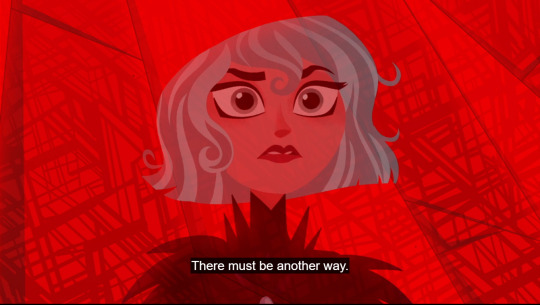


Yes, Zhan Tiri is lying, there is no destiny, but Zhan Tiri being a liar doesn’t absolve Cassandra of her own actions.
Cassandra herself believes in destiny and is looking for her’s, but why?
Why does she want a destiny? What is this destiny she’s after? Why does she believe such a thing exists? What does she believe it’ll gain her? Why is she willing to risk so much for such a vague goal? What does any of this have to do with the moonstone or her mother? How does this destiny connect back with her personal feud with Rapunzel?
It’s all disjointed and confused. Nothing lines up. It’s like the writers just had this dart board full of ideas for Cassandra’s villain arc, but couldn’t decide on which one to go with, so they just threw darts randomly each episode and went with whatever stuck for any given scene.
“Oh she want’s revenge for her mother during this scene, or wait no, she’s actually looking for destiny this episode?” “What destiny?” “Who knows. Now for this scene we need her to be sad because reasons...” “What reason?” “I don't care, make something up... Uuuuh, she’s sad cause she’s not a royal guard still” “But she became a guard during season one.” “Ignore that. Kids won’t remember. Now she needs to be angry and threating here” “Why?” “Because it’ll look cool.” “But why is she angry?” “Cause it looks cool Bob! Geez! Oh but she still needs to be sympathetic so give her a frowny face afterwards. Just have Zhan Tiri remind her how much she hates Rapunzel later, so as to egg her on and keep her doing stupid shit?” “But why does she hate Rapunzel?” “Do I have to think of everything BOB!!!???”
There, there’s my non-so-accurate behind the scene’s glimpse into the Tangled writer’s room when discussing Cassandra’s arc. I could be wrong. There could have been some intricate and complex plan thought out that just didn’t make it onto the screen for whatever reason, or maybe everyone involved was so far up their own ass that they just forgot to give their main villain an actual reason for being the villain. But regardless the over all effect is that Cassandra is handed the idiot ball for a whole freaken season in order to even have a conflict and that is never good writing; or rather she’s hit in the head with it repeatedly.
This Actually Goes Against Zhan Tiri’s Plan

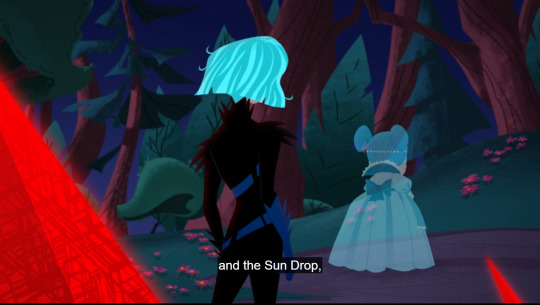


Zhan Tiri’s short term goal is to be released from her dimensional prison and apparently she needs Cass and Raps to fight into order to do this. This was never established before hand and goes against her disciples pervious plans, but whatever. One could argue that this is just a lie in order to get them to fight later...
However, this lie jeopardizes her long term goal. She eventually wants to wield both the moonstone and the sundrop herself in order to destroy Corona, but Rapunzel is the sundrop and you can only take her power during an ellipse, supposedly, which means if Cass actually succeeds in killing Rapunzel before then, then Zhan Tiri is up a creek without a paddle. Also if Cassandra did manage to steal Raps’ power with or without an ellipse then Zhan Tiri would still be out of luck.
This was wholly unnecessary; you didn’t have to go from zero to sixty in one fell swoop. Have Zhan Tiri claim that fighting Rapunzel will award the power to the winner or something. There’s no need to bring up the ‘kill her’ option. That should logically just drive Cassandra away and puts Zhan Tiri’s plan at risk.
The series wants to act like Zhan Tiri is this master manipulator, a chess master like Zantos or Palpatine, but she couldn’t even tie their shoes. Her plans make no sense and often contradict one another. They only work because the rest of the cast are reduced to imbeciles in order for them to work.
This Plot Point Contradicts Season Two
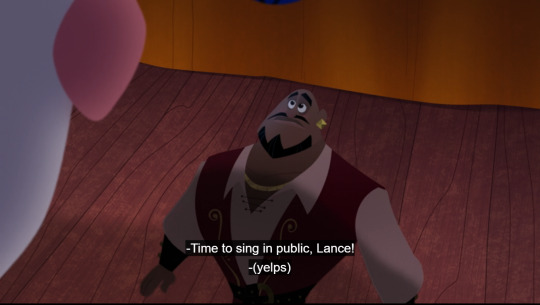
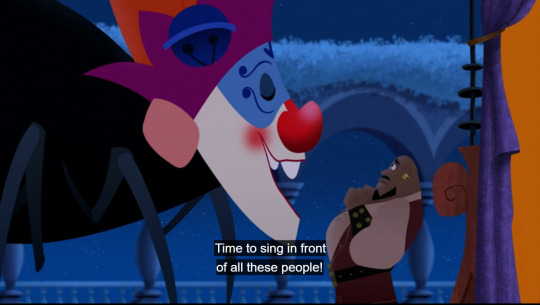
His fear of spiders was establish early on, and I’ll accept the clown thing as there’s nothing to contradict it, but Lance has preformed numerous times before now and has never show stage fright. He’s a huge ham and back in Return of Quaid he mentioned how much loved acting and preforming and apparently been on stage before, so where does this fear of singing in public come from? Heck he sung in public just a few episodes ago in Rapunzel’s Return.
If you have to sacrifice established character into order to make your plot work then you need a new plot.
This Song is Nice; It Just Needed to Be in a Different Episode
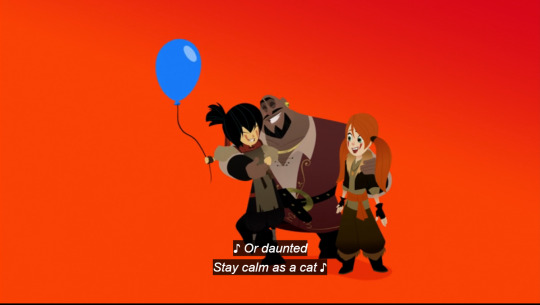
I’m glad Lance got a solo. He deserved one and the song is good. However it breaks the tension of the climax and gives the episode tonal whiplash.
More than a song, Lance needed an actual focus episode in season three. One that was fully his. If anyone else shared it with him it needed to be Red and Angry, not Varian and Cass.
Just imagine if this song came during an episode where he had to watch the girls. Imagine if he was singing it just for them. How much more impactful would that have been?
Now imagine that we had a Rapunzel and Varian duet in it’s place here. That would have tied the episode together better and helped to further their own stories. Glenn Slater can write lyrics far better than Chris can write dialogue. I bet you a thousand to one Tangled the Series would have solved like half of it’s problems had Menken and Slater been allowed write and actual apology duet between Raps and Varian.
Such a duet was proposed during Rapunzel’s Return but it could have worked here too, and you could have placed Lance’s solo in Day of the Animals or something, just leave Rapunzel out of that episode all together.
Nothing honestly needed to be cut music wise, yet for some reason season three has less songs than the other seasons, even when counting the reprises, and they’re mostly shorter too.
That’s mismanagement right there. Plain and simple. Someone at the top didn’t know how to balance the budget or resources and didn’t know where to the throw the money at.
You Have a 70 Foot Shield Made of Magic Hair, Rapunzel

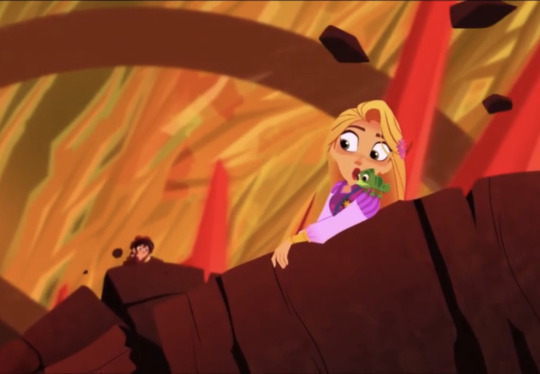
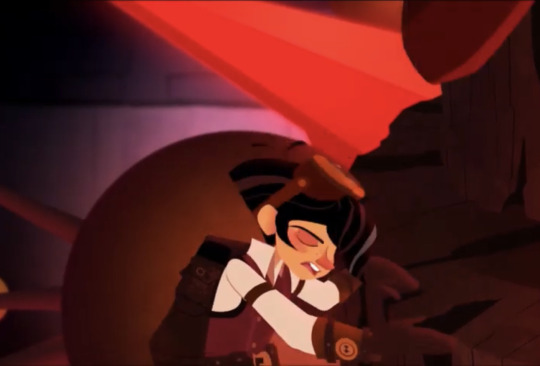

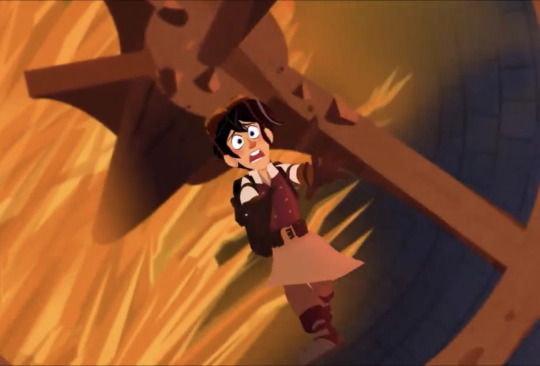
You couldn’t think to just block those rocks instead?
Giving your protagonist a big hero moment doesn’t work if they placed the person the have to save in jeopardy to begin with show.
I Do Not Care About Rapunzel Right Now, Show
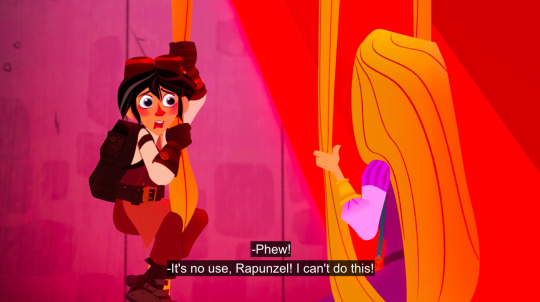
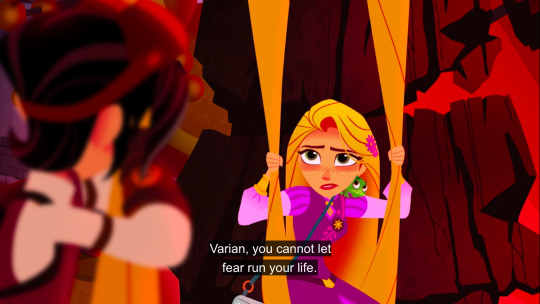

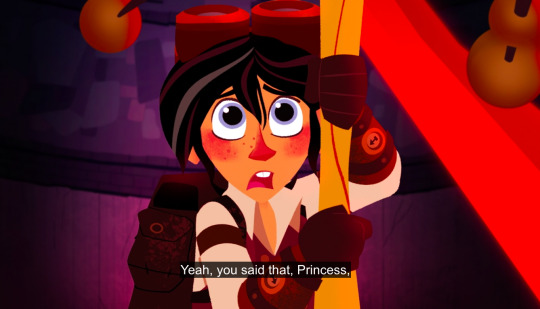

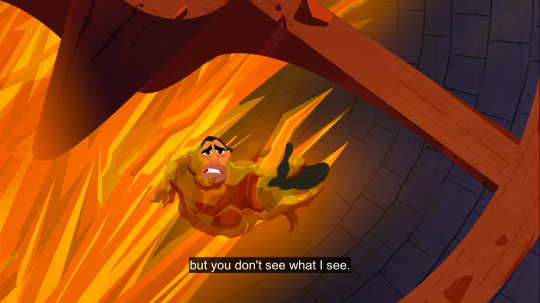

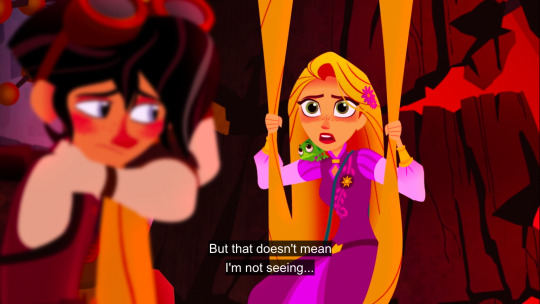
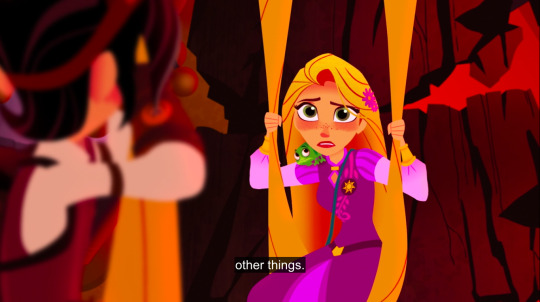
Yes, she’s the main character. Yes, her feud with Cass is the main conflict of the season and kicked off the episode. That does not mean that I automatically care about her personal feelings at this moment in time.
Rapunzel has kept such a tight lid on her real feelings for the whole episode that this just comes out of nowhere. I was never waiting with baited breath for her to confess her deep dark secrets or whatever.
It’s not even an interesting reveal. It’s just “Oh, see Rapunzel’s human too. She’s gets scared just like everybody else.”. I already fucking knew that, thanks. And what she’s afraid of isn’t even that compelling either; it’s a just a rip off of the prophecy dreams she had back in season one. The same ones that had no explanation and never furthered the story, so why should I care about this one?
You have to earn the audience’s investment in your conflict. The character’s likability, as little as that may be currently, will only carry you so far, you have to establish shit first.
Varian’s conflict has been the focus of the entire episode so far, and it’s a conflict that was set all the way back in season one, so of course that is what I’m invested in seeing get resolved. Rapunzel is once again just butting in and making it all about her when it’s not actually her story.
And if you wanted it to be her story then you should have made her the actual focus to begin with and had her learn something by the end of it.
This is Poor Choice of Words, Writers
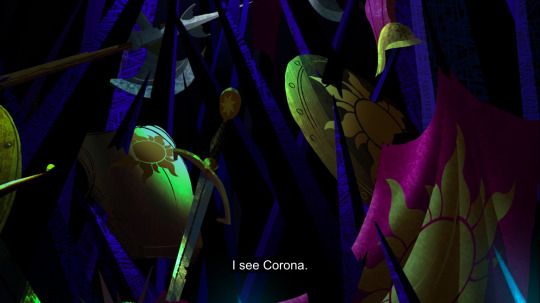

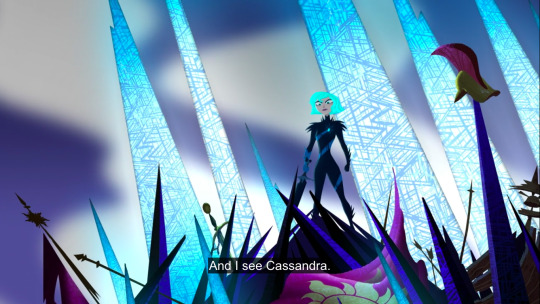


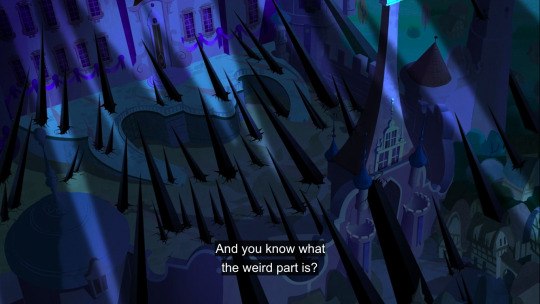
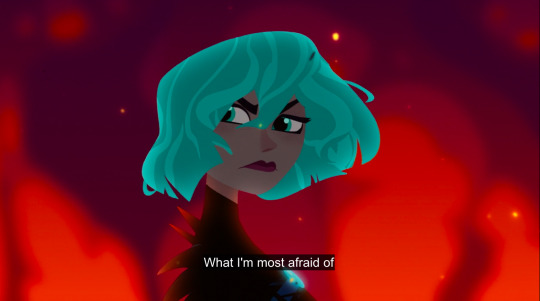
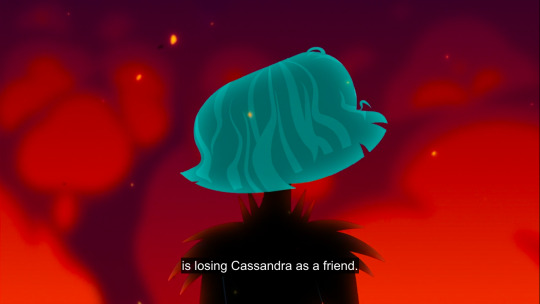
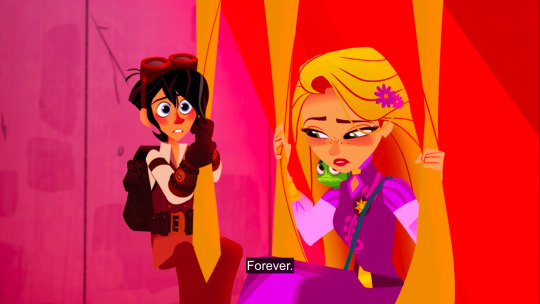
I could be generous here and pass this off as Rapunzel not fully believing in this prophecy. After all Corona’s destruction is still a hypothetical at this point and Cassandra really has left already. Since the episode is about fear, Rapunzel is of course more afraid of losing Cassandra’s friendship as it’s real tangible possibility.
More than a possibility even, Rapunzel’s been dumped. Season three is a classic break up story, right down to the poor plotting and tunnel vision, hence why it’s so gay baity.
However, this reading only carries so far. For starters this is Rapunzel’s what, fourth prophecy dream so far? Haven’t the past three already came true, so why would she think this one wouldn’t?
Secondly, all that good grace goes right out the window once it becomes clear that, yes, Cassandra is indeed a threat; a threat that Rapunzel refuses to take seriously because she cares more about her own personal validation than her kingdom.
Even as Cassandra does succeed in destroying Corona, and no doubt harms other people while at it, Rapunzel still is obsessed with ‘winning Cassandra back’. Oh and make no mistake, this is not because she actually cares about Cassandra as a person and her needs or feelings. Nope. Rapunzel just doesn’t like being dumped.
Why Does Varian Need to Shove His Feelings Aside for Rapunzel’s Bullshit?


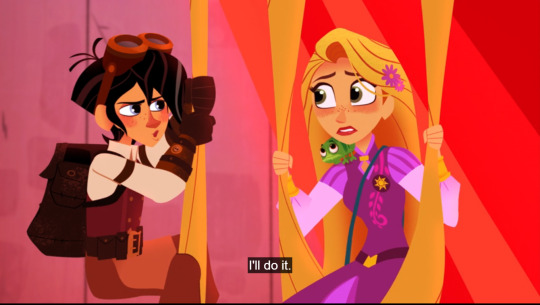
Rapunzel’s ‘confession’ has fuck all to do with Varian’s current issues. They do not connect in any way.
Varian is dealing with real trauma, trauma that she helped cause, while Rapunzel is only dealing with a hypothetical prophecy and one very shallow, self-centered fear. There’s nothing to relate to here. Neither for Varian himself nor the audience.
Yet for some undefined reason this is what gets Varian to ignore his PTSD flashbacks? What?

This is once again break the narrative promise. I was promised closure for Varian’s story arc and instead of that the writers just brush it up under the rug.
From the outside looking in this doesn’t come across as Varian ‘overcoming’ his ‘fear’. It looks like an abuse victim using learned helplessness to placate his abusers.
And yes, for the last time Rapunzel is Varian’s abuser.
NEGLECT IS ABUSE!!!
And and even though he is no longer her ‘responsibility’, she is still neglecting him emotionally as his supposed friend.
Varian’s and Cassandra’s Stories Undermined Each Other’s

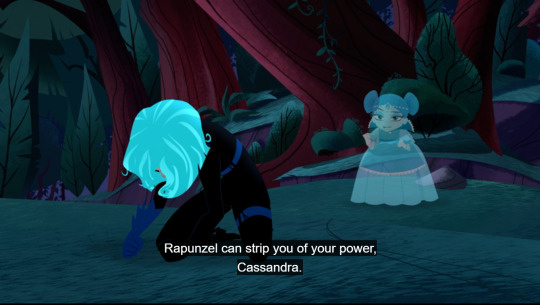
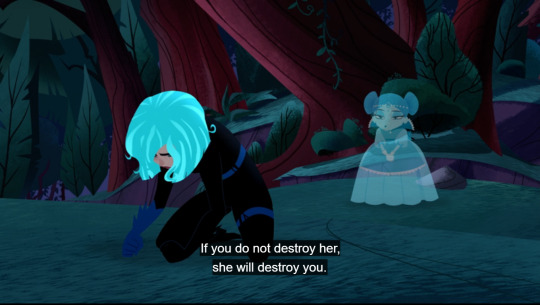
Varian stopped the rocks. Rapunzel had nothing to do with it. Zhan Tiri blaming Rapunzel for it steals agency away from both her and Cassandra.
However, if Rapunzel had used the hurt incantation to stop the rocks and Cassandra had felt it rom the other side, then you’d have something to back up Zhan Tiri’s claim and an actual point of real conflict to carry the rest of the season. Not to mention an actual tangible goal for Cassandra to work towards, survival.
Cassandra’s conflict with Rapunzel not only prevents the resolution to Varian’s arc from being satisfying, but Varian fulfilling his arc in turn winds up cutting off Cass’s story at the knees.
It didn’t have to be this way. Varian’s and Cassandra’s arcs should have complimented each other, but instead the creator decided to make them complete for screen time and relevance.
It is such an gratingly stupid and petty decision that winds up being a disservice for all the characters involved.
Cassandra’s motivation and goal should have been revealed back in season two. Varian should have been the sole focus of Rapunzel’s Return and gotten his big hero moment there along; with an actual ending to his conflict with Rapunzel that didn’t feel so lopsided and half assed. Then Rapunzel and Cassandra could have both been held accountable for their conflict in season three, instead of pretending like their shit smelled of roses the whole damn time.
Lance Got a Whole Crowd Cheering Him On For Singing a Song, Varian Just Gets One Asshole Giving Him a Single Line of Congratulations
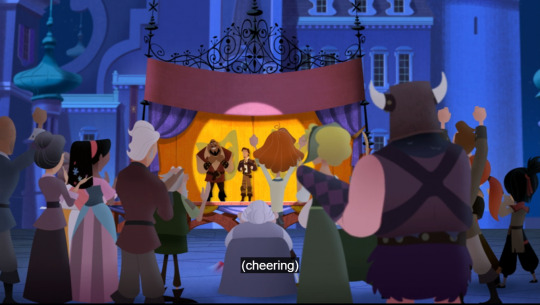
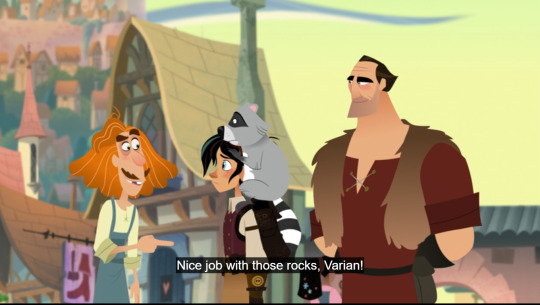
Did I mention this show has an odd anti-Varian bias? Cause it does. For whatever reasons his own creators hate him and that’s just utterly baffling to me. Like why create a main character that you don’t like?
I look down on professional writers who treat characters they didn’t create poorly within their works, like with James Gunn and Scrappy Doo in the Scooby Doo Movie, Adric in the Doctor Who spin offs, or even the treatment of Doofus in Ducktales 2017. I don't care how much a character is liked or disliked by fandom, that shit is just tasteless and often unfunny. But at least I understand where they are coming from when they do it.
But I’ll never understand what compels a writer to sabotage their own work; one that they are getting paid to write no less. Especially when said character is super popular with their fans. And Chris knows this. He knows the ratings plummeted without Varian in season two. He knows the merch didn’t sell because there wasn’t enough Varian products. That’s why he hyped up Varian’s return a whole week before Season Three’s airing with a massive online campaign, but he wasn’t smart enough to treat the character decently afterwards?
I mean congrats, you convinced a just enough viewers to come back to season three to keep the show on the air I guess, but you left them all pissed off and have nothing to show for it to the higher ups a Disney.
And Chris wonders why he wasn’t asked back to work on new Disney princesses shows that are currently in the works.
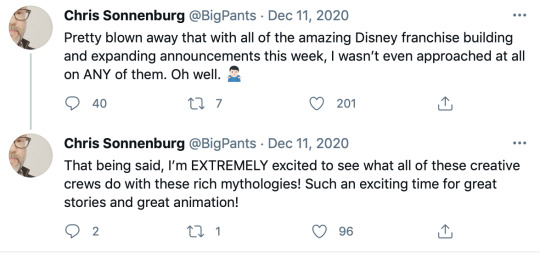
That is Not Quirin. That is a Plank of Wood Pretending to be Quirin.
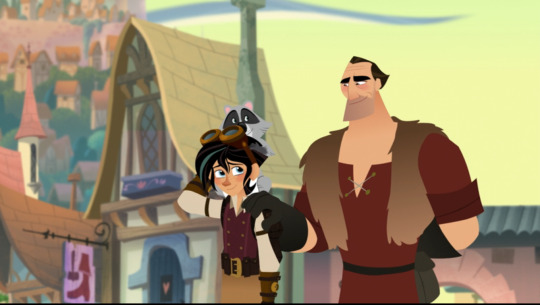
*Beep* *Boop*...*Dad Bot Is Proud. exe*
Quirin is such a pale shadow of his season one self that he might as well not exist. I genuinely don't know why the writers released from the amber so early if they weren’t actually going to use him until the season finale.
For the longest time I honestly thought that Rapunzel sucked out his soul with that decay incantation; what with that lyric about “setting the spirit free”. I genuinely thought that would be a later plot point, but nope, it’s just bad writing
Him just saying hi to son once and smiling blankly isn’t compelling and it’s isn’t fulfilling. It doesn’t actually resolve his arc. I mean he’s at least shown spending time with his son, but that’s not enough. We need to see him acknowledge past, we need to see him acknowledge his own flaws, and we need to see him being more attentive when Varian is in need. .
Season one Quirin would be trying to stop Varian from going near the red rocks, a post season one Quirin should logically go after his son to make sure he’s alright, even if he’s know longer trying to actively stop Varian like he once did.
There’s also that damn note and it’s secrets!
You know what? That’s it. That’s the problem. The focus is all wrong in season three. Episodes get pulled into to many directions trying to juggle too many characters rather than dedicating the needed time to each individual arc.
Season two’s finale should have been a three parter with Cass’s full motivation and goal laid bare before leaving.
Rapunzel’s Return should have been solely about Rapunzel and Varian’s conflict and resolving that arc fully
Either Who’s Afraid of the Big Bad Wolf or Day of the Animals should have been a Lance episode about him and the girl’s, no Rapunzel.
And this episode should have been about Quirin and Varian resolving their issues, with the Rapunzel and Cass stuff as the B plot not the stupid talent show
There, all fixed. You don't even have to cut much, just rework the focus and leave Rapunzel and Cassandra out of conflicts they have no business being in.
This Does Not Excuse Rapunzel’s Later Negligence Regarding Cassandra
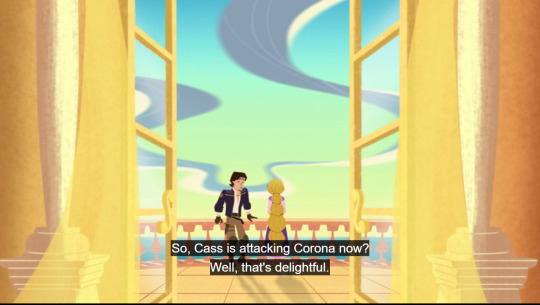

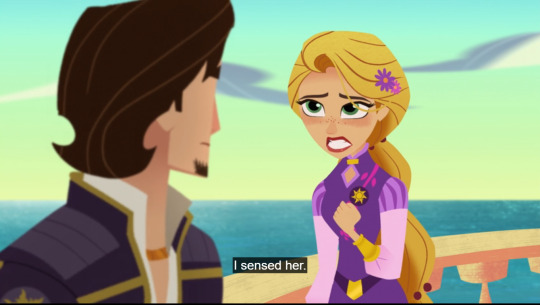
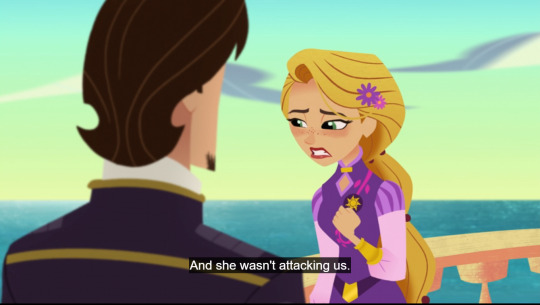
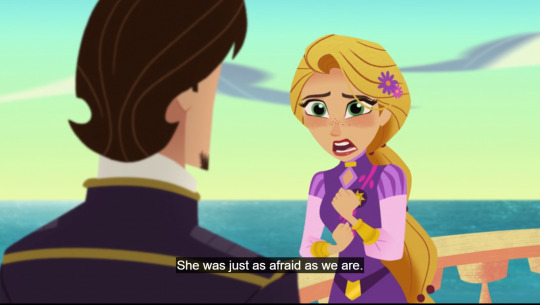
Just because the red rocks was an accident doesn’t mean Cassandra should get a free pass for all the awful things she does later. Rapunzel uses this one interaction to excuse everything else Cassandra does in season three, as if she was just some poor lost baby and not a grown ass woman out to kill them.
In fact Cass showing hesitancy here actually makes her later actions even worse. This means that she fully acknowledges that what she’s about to do is wrong, but goes ahead and does anyway, even gleefully so at times. Then she has to gall to act baffled when people see her as a threat? 0.o
When fans say Cass isn’t redeemable or shouldn’t be redeemed, it’s not because he actions are so much worse than everybody else’s (even though they are), It’s because she doesn’t act like she wants to be redeemed half the time. The show doesn’t properly set up her ‘redemption’, instead it just lazily has Rapunzel yell at us how she’s ‘not lost’.
Like below for instance.
What Does Cass Need Saving From?
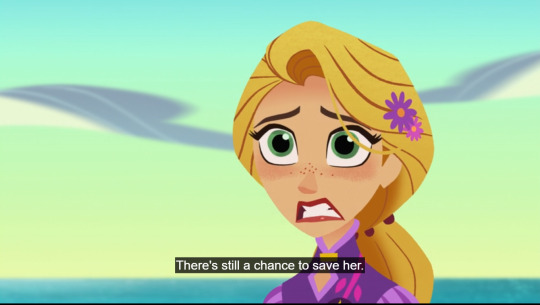
Cassandra is not in danger. She is the danger.
She made the conscious decision to leave taking a world endangering artifact with her, and she later makes the conscious decision to come back and be an asshole for no adequately defined reason.
She’s never shown to be in any physical danger from the rocks, the moonstone, or even Zhan Tiri herself. She apparently can take care of herself in the wild for over a year. She also has the capability of getting a job else where and just living out her life if she wanted to. Nothing is forcing her to listen to Zhan Tiri.
Heck, even her hurt arm, the one thing Rapunzel is responsible for and could potentially be a continued threat to Cass’s well being, is just completely forgotten about.
And no, mental illness and past trauma are not excuses as well. In fact it’s rather insulting to both people with mental heath problems and abusive survivors to suggest otherwise. We don't need ‘saving from ourselves’ and we aren’t automatically dangers to anybody. Nor do we get free passes if we hurt someone. A jerk who happens to have a mental illness is just a jerk who so happens to have a mental illness; coloration is not causation.
Conclusion
It’s better than Rapunzel’s Return, but this episode was still a disappointment. A small part of me whishes this was a two parter because it has so much untapped potential, but I know it’s just be wasted in Chris’s hands.
Anyways, I consider this to be the true mid-season finale of S3. Not only did the hiatus kick in after this episode, but it also clearly divides the season between the first half filler and the later Cass conflict. As such the next entry will be the mid-season recap. See ya, then.
Ko-fi https://ko-fi.com/rachelbethhines
Redbubble https://www.redbubble.com/people/RBH129/shop?asc=u
#anti-tangled#anti-rapunzel#anti-casandra#varian#tangled#tangled the series#rapunzel's tangled adventure
209 notes
·
View notes
Text
A review of “Journey Into Mystery,” the penultimate Loki Season One episode on Disney+, coming up just as soon as I paper cut a giant cloud to death…
Journey Into Mystery was the title of the first Marvel comic to feature either Thor or Loki. It began as an anthology series featuring monsters and aliens, but Jack Kirby, Stan Lee, and Larry Lieber were so smitten with their adaptation of the characters of Norse myth that the Asgardians gradually took over the whole book, which was renamed after its hammer-wielding hero(*).
(*) The early Journey Into Mystery stories treated Thor’s alter ego, disabled Dr. Donald Blake, as the “real” character, while Thor was just someone Blake could magically transform into, while retaining his memories and personality. It wasn’t even clear whether Asgard itself was meant to exist at first, until Loki turned up on Earth in an early issue, caused trouble, and Blake/Thor somehow knew exactly how to get to Asgard to drop him off. Soon, the lines between Thor and Blake began to blur, and eventually Thor became the real guy, and Blake a fiction invented by Odin to humble his arrogant son. It’s a mark of just how instantly charismatic Loki was that the entire title quickly steered towards him and the other gods.
But once upon a time, anything was possible in Journey Into Mystery, which makes it an apt moniker for an absolutely wonderful episode of Loki where the same holds true. Our title characters are trapped in the Void, a place at the end of time where the TVA’s victims are banished to be devoured by a cloud monster named Alioth. And mostly they are surrounded by the wreckage of many dead timelines. Classic Loki insists that his group’s only goal is survival, and any kind of planning and scheming is doomed to kill the Loki who tries. But this ruined, hopeless world instead feels bursting with imagination and possibility.
There are the many Loki variants we see, with President Loki, among others, joining Classic, Kid, Boastful, and Alligator Loki. There are the metric ton of Easter Eggs just waiting to be screencapped by Marvel obsessives (I discuss a few of them down below), but which still suggest a much larger and weirder MCU even if you don’t immediately scream out “Is that… THROG?!?!?” at the appropriate moment. And all of that stuff is tons of fun, to be sure. But what makes this episode — and, increasingly, this series — feel so special is the way that it explores the untapped potential of Loki himself, in his many, many variations.
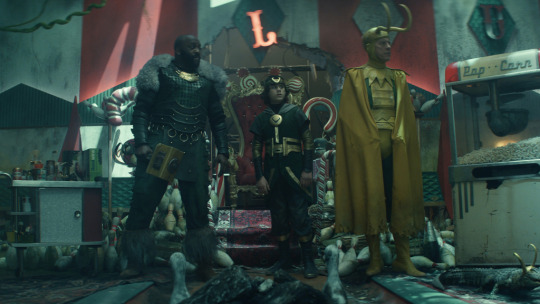
This is an episode that owes more than a small stylistic and thematic debt to Lost. It’s not just that Alioth looks and sounds so much like the Smoke Monster(*), that it makes a shared Wizard of Oz reference to “the man behind the curtain” (also the title of one of the very best Lost episodes), or even that the core group of Lokis are hiding in a bunker accessible via a hatch and a ladder that’s filled with recreational equipment (in this case, bowling alley lanes). It’s also that Loki, Sylvie, their counterparts, and Mobius have all been transported to a strange place that has disturbing echoes from their own lives, that operates according to strange new rules they have to learn while fleeing danger, and their presence there allows them to reflect on the many mistakes of their past and consider whether they want to, or can, transcend them.
(*) Yes, Alioth technically predates Smokey by a decade (see the notes below for more), but his look has been tweaked a bit here to seem more like smoke than a cloud, and the sounds he makes when he roars sound a lot like Smokey’s telltale taxi cab meter clicks. Given the other Lost hat tips in the episode, I have to believe Alioth was chosen specifically to evoke Smokey.
Classic Loki is aptly named. He wears the Sixties Jack Kirby costume, and he is a far more powerful magician than either Sylvie or our Loki have allowed themselves to be. He calls our Loki’s knives worthless compared to his sorcery, which feels like the show acknowledging that the movies depowered Loki a fair amount to make him seem cooler. But if Classic Loki can conjure up illusions bigger and more potent than his younger peers, he is a fundamentally weak and defeated man, convinced, like the others, that the only way to win the game into which he was born is not to play. “We cannot change,” he insists. “We’re broken. Every version of ourselves. Forever.” It is not only his sentiment — Kid Loki adds that any Loki who tries to improve inevitably winds up in the Void for their troubles — but it seems to have weighed on him longer and harder than most.
But Classic Loki takes inspiration from Loki and Sylvie to stand and fight rather than turn and run, magicking up a vision of their homeland to distract Alioth at a crucial moment in Sylvie’s plan, and getting eaten for his trouble. He was wrong: Lokis can change. (Though Kid Loki might once again argue that Classic Loki’s death is more evidence that the universe has no interest in any of them doing so.) And both Loki and Sylvie have been changing throughout their time together. Like most Lokis, they seem cursed to a life of loneliness. Sylvie learned as a child that a higher power believed she should not exist, and has spent a lifetime hiding out in places where any friends she might make will soon die in an apocalypse. Our Loki’s past isn’t quite so stark, but the knowledge that his birth father abandoned him, while his adoptive father never much liked him, have left permanent scars that govern a lot of his behavior. The defining element of Classic Loki’s backstory is that he spent a long time alone on a planet, and only got busted by the TVA when he attempted to reconnect with his brother and anyone else he once knew. This is a hard existence, for all of them. And while it does not forgive them their many sins(*), it helps contextualize them, and give them the knowledge to try to be better versions of themselves.
(*) Loki at one point even acknowledges that, for him, it’s probably only been a few days since he led an alien invasion of New York that left many dead, though due to TVA shenanigans, far more time may have passed.
For that matter, Mobius is not the stainless hero he once thought of himself as. While he and Sylvie are tooling around the Void in a pizza delivery car (because of course they are), he admits that he committed a lot of sins by believing that the ends justified the means, and was wrong. He doesn’t know who he is before the TVA stole and factory rebooted him, but he knows that he wants something better for himself and the universe, and takes the stolen TemPad to open up a portal to his own workplace in hopes of tearing down the TVA once and for all. Before he goes, though, he and Loki share a hug that feels a lot more poignant than it should, given that these characters have only spent parts of four episodes of TV together. It’s a testament to Hiddleston, Wilson, Waldron, and company (Tom Kauffman wrote this week’s script) that their friendship felt so alive and important in such a short amount of time.
The same can be said for Loki and Sylvie’s relationship, however we’re choosing to define it. Though they briefly cuddle together under a blanket that Loki conjures, they move no closer to romance than they were already. If anything, Mobius’ accusations of narcissism in last week’s episode seem to have made both of them pull back a bit from where they seemed to be heading back on Lamentis. But the connection between them is real, whatever exactly it is. And their ability to take down Alioth — to tap into the magic that Classic Loki always had, and to fulfill Loki’s belief that “I think we’re stronger than we realize” — by working together is inspiring and joyful. Without all this nuanced and engaging character work, Loki would still be an entertaining ride, but it’s the marriage of wild ideas with the human element that’s made it so great.
Of course, now comes the hard part. Endings have rarely been an MCU strength, give or take something like the climax of Endgame, and the finales of the two previous Disney+ shows were easily their weakest episodes. The strange, glorious, beautiful machine that Waldron and Herron have built doesn’t seem like it’s heading for another generic hero/villain slugfest, but then, neither did WandaVision before we got exactly that. This one feels different so far, though. The command of the story, the characters, and the tone are incredibly strong right now. There is a mystery to be solved about who is in the big castle beyond the Void (another Loki makes the most narrative and thematic sense to me, but we’ll see), and a lot to be resolved about what happens to the TVA and our heroes. And maybe there’s some heavy lifting that has to be done in service to the upcoming Dr. Strange or Ant-Man films.
It’s complicated, but on a show that has handled complexity well. Though even if the finale winds up keeping things simpler, that might work. As Loki notes while discussing his initial plan to take down Alioth, “Just because it’s not complicated doesn’t mean it’s bad.” Though as Kid Loki retorts, “It also doesn’t mean it’s good.”
Please be good, Loki finale. Everything up to this point deserves that.
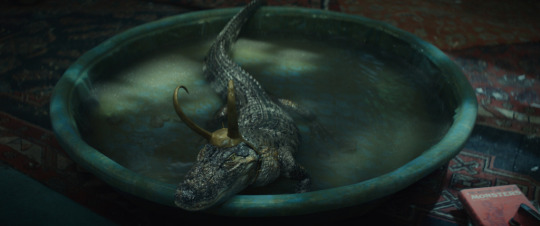
Some other thoughts:
* Most of this week’s most interesting material happens in the Void. But the scenes back at the TVA clarify a few things. First, Ravonna is not the mastermind of all this, and she was very much suckered in by the Time-Keeper robots. But unlike Mobius or Hunter B-15, she’s so conditioned to the mission that even knowing it’s a lie hasn’t really swayed her from her mission. She has Miss Minutes (who herself is much craftier this week) looking into files about the creation of the TVA, but for the most part comes across as someone very happy with a status quo where she gets to be special and pass judgment on the rest of the multiverse.
* Alioth first appeared in 1993’s Avengers: The Terminatrix Objective, a miniseries (written by Mobius inspiration Mark Gruenwald, and with some extremely kewl Nineties art full of shoulder pads, studded collars, and the like) involving Ravonna, Kang, and the off-brand versions of Captain America, Iron Man, and Thor (aka U.S. Agent, War Machine, and Thunderstrike, the latter of whom has yet to appear in the MCU). It’s a sequel to a Nineties crossover event called Citizen Kang. And no, I still don’t buy that Kang will be the one pulling the strings here, if only because it’s really bad storytelling for the big bad of the season to have never appeared or even been mentioned prior to the finale.
* Rather than try to identify every Easter egg visible in the Void’s terrain, I’ll instead highlight three of the most interesting. Right before the Lokis arrive at the hatch, we see a helicopter with Thanos’ name on it. This is a hat tip to an infamous — and often memed — out-of-continuity story where Thanos flies this chopper while trying to steal the Cosmic Cube (aka the Tesseract) from Hellcat. (A little kid gets his hands on it instead and, of course, uses the Cube to conjure up free ice cream.) James Gunn has been agitating for years for the Thanos Copter to be in the MCU. He finally got his wish.
* The other funny one: When the camera pans down the tunnel into Kid Loki’s headquarters, we see Mjolnir buried in the ground, and right below it is a jar containing a very annoyed frog in a Thor costume. This is either Thor himself — whom Loki cursed into amphibianhood in a memorable Walt Simonson storyline — or another character named Simon Walterston (note the backwards tribute to Walt) who later assumed the tiny mantle.
* Also, in one scene you can spot Yellowjacket’s helmet littering the landscape. This might support the theory that the TVA, the Void, etc., all exist in the Quantum Realm, since that’s where the MCU version of Yellowjacket probably went when his suit shorted out and he was crushed to subatomic size. Or it might be more trolling of the fanbase from the company that had WandaVision fans convinced that Mephisto, the X-Men, and/or Reed Richards would be appearing by the season finale.
* Honestly, I would have watched an entire episode that was just Loki, Mobius, and the others arguing about whether Alligator Loki was actually a Loki, or just a gator who ended up with the crown, presumably after eating a real Loki. The suggestion that the gator might be lying — and that this actually supports, rather than undermines, the case for him being a Loki — was just delightful. And hey, if Throg exists in the MCU now, why not Alligator Loki?
* Finally, the MCU films in general are not exactly known for their visual flair, though a few directors like Taika Waititi and Ryan Coogler have been able to craft distinctive images within the franchise’s usual template. Loki, though, is so often wonderful to look at, and particularly when our heroes are stuck in strange environments like Lamentis or the Void. Director Kate Herron and the VFX team work very well together to create dynamic and weird imagery like Sylvie running from Alioth, or the chaotic Loki battle in the bowling alley. Between this show and WandaVision, it appears the Disney+ corner of the MCU has a bit more room to expand its palette. (Falcon and the Winter Soldier, much less so.)
77 notes
·
View notes